
|
TORAH PORTIONS
Kl Kl
LEKH L'KHA (Go of you)
Genesis 12:1-17:27
There are 87 Aleph-Tavs in this weeks Torah portion.

Note: you will need the oldheb.ttf (old Hebrew) and the SGreek Mediuim fonts to see the Hebrew and Greek text, as well as the three English fonts: Cooper Black, Impact and Frontlight MT Light. Right click the links and choose "Save Target As". Then go to the file, and either right click them and choose "install", or drag them into the font page.
oldheb.ttf
SGreek Medium
Cooper Black
Impact
Frontlight MT Light
NOTE: All of the yous and yours underlined as "you" and "your" indicates that the you and the your are plural. Also any of the words that are in bold pink lettering as "you" refers to the feminine gender, but it is only applied when it does not commonly refer to a woman. This only is applied to this week's Torah portion text at this time.
CHAPTER 12
Genesis 12:1-20
Gen 12:1 And hwhy said to Abram, Go of yourself from your land, and from your birth place (kindred), and from the house of your father, to the land which I will show you: 2 and I will (do) make you for a great nation, and I will bless you, and I will make your name great [(engreaten your name)], and shall be a blessing: 3 And I will bless from your blessers [(those blessing you)], and from your despisers [(those despising (cursing) you)] I will curse: and in you, all families of the Ground, they will be blessed. 4 And Abram went as the which hwhy spoke to him; and Lot went out with him: and Abram was a son of five years and seventy years in his going out from Haran, 5 and Abram took ta-Sarai, his woman (wife), and ta-Lot, son of his brother, and ta-all of their goods (substance, property) which they had collected, and ta-the souls which they had done (acquired) in Haran; and they went out to go to the land of Canaan; and they came to the land of Canaan. 6 And Abram went over in the land unto the place of Shechem, unto the Oak of Moreh, and the Canaanite was then in the land. 7 And hwhy appeared to Abram, and said, I will give ta-this land to your seed: And built there an altar to hwhy that appeared to him, 8 and removed from there to the mountain from the east by Beth El, and stretched the tent, having (at) Beth El from seaward (westward), and the Ai from eastward: and built there an altar to hwhy, and called on the Name of hwhy.
9 And Abram pulled up (pulled out, journeyed) at the going, and journeyed to the Negeb. 10 And a famine was in the land: and Abram descended (went down) to Egypt to sojourn there; for the famine was heavy in the land. 11 And was, as the which had drawn near to come to Egypt, and said to Sarai, his woman (wife), Behold now, I know for you are a beautiful (fair) woman of appearance: 12 and shall be when the Egyptians, they shall see you, and they shall say, This is his woman (wife): and they will kill me, and you they will let live (keep alive). 13 Say now, you are my sister: by that, shall be good (well) to me on over you [(on your transition)]; and my soul, she shall live on your occasion (circumstance, account).
14 And was, as Abram came to Egypt, and the Egyptians, they saw ta-the woman for she was much beautiful (fair), 15 and the princes of Pharaoh, they saw her, and they praised her to Pharaoh: and the woman, she was taken at the house of Pharaoh, 16 and did good (well) to Abram on over her [(on her transition)]: and had to him flocks, and herds, and he donkeys, and male servants, and female servants, and she donkeys, and camels. 17 And hwhy touched (plagued) ta-Pharaoh and ta-his house of great plagues upon the word of Sarai, woman (wife) of Abram. 18 And Pharaoh called to Abram, and said, What is this you have done to me? To why you did not declare (tell) to me that she is your woman (wife)? 19 To why did you say, She is my sister? And I took her to me for a woman (wife): And now behold your woman (wife). Take and go. 20 And Pharaoh commanded the men upon him: and they sent away him and ta-his woman (wife), and ta-all which belonged to him.
(NOTE: Not all verses will have comments)
Verse one
1 And hwhy said to Abram, Go of yourself from your land, and from your birth place (kindred), and from the house of your father, to the land which I will show you:
This should be an account that applies to most of us in Yeshua, if not all of us. We left our families for hwhy's sake to follow His path, submitting to Him to be our Heavenly Father.
Mark Biltz of El Shaddai Ministries noted that hwhy told Abram these three things, in this particular order:
FIRST: Get out of his native land (i.e. the nation of his birth)
SECOND: Get out of his birth place (i.e. the town or city of his birth)
THIRD: Get out of the house of his father (i.e. the house of his family)
Normally, it is the other way around. One can't leave their land, before leaving their town first, and one can't leave their town before leaving their home first. Why did hwhy say it in an unorthodox way to Abraham? Based on the account when the Israelites left Egypt after hwhy plagued Egypt, and Pharaoh sent the Israelites away, Bill Cloud of Shoreshim Ministries noted that though the Israelites left Egypt, Egypt was still within them. This means that though Abraham would leave his nation, hwhy knew that it would take time for Abram to get rid of these three areas that could have been potentially "sentimental" in his life. This has happened to all of us, being believers in the Messiah, for those of us who left our areas of birth places and home towns, or home cities, and the states we were born in. Though we left the states, our Heavenly Father, still knows that it will take time for us to get rid of the other parts in us. That is His act of mercy to us. Thank You, hwhy, for Your mercy. Thank you also to Mark and Bill.
This week's Torah portion passage can be compared to hwhy's First Word (Commandment) which is noted in the Torah portion of Yithro, in the book of Exodus
Exodus 20:2 I am hwhy, your Elohim, which brought you out from the land of Egypt, from the house of slavery (bondage).
Notice hwhy didn't say in the order that He delivered them from the house of slavery/bondage first, then the land of Egypt next, but in the land of Egypt first which was the territory, then the House of Slavery/Bondage which was the location in the land which provided their occupation.
FIRST: Delievered from the land (the Egyptian Empire)
SECOND: Delievered from the house (the House of Enslavement/Bondage = their location in the empire, and their occupation)
One thing that Abram did not do that hwhy said to do. Abram left his father's house, he left his country, but he did not leave his kindred behind, as we will see in a second.
Looking at the word ABRAM
The Hebrew word for Abram is "Ah-vrahm"- Aleph, Bet, Resh, Mem Sophit (Mrba). It is from Strong's Concordance number 87, and its definition
Contracted from H48; high father; Abram, the original name of Abraham: - Abram.
from 48 "Ah-vee-rahm" (Mryba), and its definiton
From H1 and H7311; father of height (that is, lofty); Abiram, the name of two Israelites: - Abiram.
Ab
from 1 "ahv" (ba), and its definition
A primitive word; father in a literal and immediate, or figurative and remote application: - chief, (fore-) father ([-less]), X patrimony, principal. Compare names in “Abi-”
Ram
from 7311 "room" (Mwr), and its definition
A primitive root; to be high actively to rise or raise (in various applications, literally or figuratively): - bring up, exalt (self), extol, give, go up, haughty, heave (up), (be, lift up on, make on, set up on, too) high (-er, one), hold up, levy, lift (-er) up, (be) lofty, (X a-) loud, mount up, offer (up), + presumptuously, (be) promote (-ion), proud, set up, tall (-er), take (away, off, up), breed worms.
Abram means "Exalted Father".
Verses two and three
2 and I will make you for a great nation, and I will bless you, and I will make your name great, and shall be a blessing: 3 And I will bless from your blessers [(those blessing you)], and from your despisers [(those despising (cursing) you)] I will curse: and in you, all families of the Ground, they will be blessed.
This was the same blessing that hwhy told Jacob at Beth El in the Torah portion of Vay-yeytsey, in the book of Genesis
Genesis 28:10 And Jacob went out from Beer Sheba, and walked to Haran. 11 And was entreated on the place, and stayed (tarried) there, for the sun was going; and took from the stones of the place, and were put with his head, and laid down in that place. 12 And calm-dreamed, and behold, a ladder was standing at the Earth, and his head reached to the Heavens: and behold the Messengers of Elohim were ascending and descending on him. 13 And behold, hwhy stood upon him, and said, I am hwhy, Elohim of Abraham, your father, and the Elohim of Isaac: The land which you are laying upon her will I give her to you and to your seed; 14 And your seed shall be as the dust of the Earth, and you shall spread to the sea (west), and to the east, and to the hidden (north), and to the negev (south): and in you and in your seed of all the families of the Earth, they shall be blessed.
It uses the dust instead of the stars, which symbolizes the natural seed.
This faith is what the nations of the earth shall be blessed with, and it results when the nations become followers of the faith in the Messiah, as noted in the apostle Paul's letter to the assembly in Galatia
Galatians 3:2 This only would I learn of you, Received ye the Spirit by the works of the Torah, or by the hearing of faith? 3 Are ye so foolish? Having begun in the Spirit, are ye now made perfect by the flesh? 4 Have ye suffered so many things in vain? If it be yet in vain. 5 He therefore that ministereth to you the Spirit, and worketh miracles among you, doeth He it by the works of the Torah, or by the hearing of faith? 6 Even as Abraham believed hwhy, and it was accounted to him for righteousness. 7 Know ye therefore that they which are of faith, the same are the children of Abraham. 8 And the scripture, foreseeing that hwhy would justify the heathen through faith, preached before the Gospel unto Abraham, saying, In thee shall all nations be blessed. 9 So then they which be of faith are blessed with faithful Abraham.
By the way, there is now concrete evidence that Donald J. Trump, the President of the United States, has now become our baby brother in Yeshua the Messiah.
Just recently, Monte Judah of Lion and Lamb Ministries noted in his November 11, 2016 Update at his montejudahblog.com blog site that in this United States presidential election when the Democratic preisdential candidate noted to the opponent's voters as "a basket a deplorables", whether that presidential candidate knew it or not, that candidate cursed those voters. As a result, the Democratic presidential nominee was cursed, and it cost the Democrats the presidential election. The people in the United States who were voting for the opponent were of the blessings of Abraham. When they were cursed, the Democratic candidate became cursed, because the opponent's voters were the children of Abraham through the Messiah. Thank you, Monte. Also, when the Democratic presidential candidate kept cursing the opponent, when just recently became a child of Abraham in the Messiah, that also resulted in the Democratic candidate to be cursed.
Ephraim Judah, also of Lion and Lamb Ministries, noted the common translation that all of the "earth" will be blessed
Looking at the word EARTH
The Hebrew word for earth is "Ah-dah-mah"- Aleph, Dalet, Mem, Hah (hmda). It is from Strong's Concordance number 127, and its translation
From H119; soil (from its general redness): - country, earth, ground, husband [-man] (-ry), land.
from 119 "ah-dahm" (mda), and its definition
To show blood (in the face), that is, flush or turn rosy: - be (dyed, made) red (ruddy).
Ephraim noted that the translation should not be "land" but "ground". He also noted the reason because Adam came from the adamah- ground, and that all of the families would be joined back in through the lineage of Abraham. Thank you Ephraim.
Verse four
4 And Abram went as the which hwhy spoke to him; and Lot went out with him: and Abram was a son of five years and seventy years in his going out from Haran,
Abram was seventy five years old. Sarai was ten years younger than he was which means that Sarai was sixty five years old when they left Haran.
Notice it says that he went and Lot also went with him. He brought Lot, a kindred, with him, that hwhy told him not to do.
Looking at the following words:
HARAN
The Hebrew word for Haran is "Hah-rahn"- Heh, Resh, Nun Sophit (Nrh). It is from Strong's Concordance number 2039, and its translation
Perhaps from H2022; mountaineer; Haran, the name of two men: - Haran.
from 2022 "hahr" (rh), and its definition
A shortened form of H2042; a mountain or range of hills (sometimes used figuratively): - hill (country), mount (-ain), X promotion.
from 2042 "hah-rahr" (rrh), and its definition
From an unused root meaning to loom up; a mountain: - hill, mount (-ain).
It could be that Abram had to leave a mountain to follow hwhy's Command.
LOT
The Hebrew word for Lot is "Loht"- Lamed, Vav, Tet (jwl). It is from Strong's Concordance number 3876, and its translation
The same as H3875; Lot, Abraham’s nephew: - Lot.
from 3875 "loht" (jwl), and its definition
From H3874; a veil: - covering.
from 3874 "loot" (jwl), and its definition
A primitive root; to wrap up: - cast, wrap.
Based on Lot's circumcstance at birth, there are accounts that some babies are born with a "sack veil" covering around them. My wife had that experience with a veil sack around her face when she was born. In Lot's case in travelling with Abram, he was Abram's "veil", because hwhy was not ready to reveal the land that Abram's descedants would possess in the future. hwhy allowed Lot to go with to be a symbolic "covering" for him.
There were times when hwhy called us to do something, but we want to have someone else be involved with our calling. We can identify with Abram on this matter.
I want to carry over the time line of Abram and his ancestors from last week's Torah portion of Noakh, in the book of Genesis, and compare the age of Abram to the time line of their deaths:
| YEAR OF MAN AND NAMES OF THOSE ALREADY LIVING AND THEIR AGE AT THE TIME OF THEIR DESCENDANTS' BIRTHS | NAMES OF THE FATHERS | NAMES OF THE SONS |
| 1948 YEARS
OF MANKIND Methusaleh: (died at 969 years old in the YEAR OF MAN 1656) Lamech: (died at 777 years old in the YEAR OF MAN 1651) Noah: 892 years old Shem: 392 years old Arphaxad: 290 years old Salah: 255 years old Eber: 225 years old Peleg: 191 years old Reu: 161 years old Serug: 129 years old Nahor: 99 years old |
Terah: 70 Years | Abram was born |
| YEAR OF MAN | THE YEAR ABRAM'S ANCESTOR DIED | ABRAM'S AGE AT THE TIME OF ANCESTOR'S DEATH |
| 1997 YEARS OF MANKIND | Nahor: Died at 148 years old | Abram at 49 years old at the time of Nahor's death |
| 1996 YEARS OF MANKIND | Peleg: Died at 239 years old | Abram at 48 years old at the time of Peleg's death |
| 2004 YEARS OF MANKIND | Noah: Died at 950 years old | Abram at 58 years old at the time of Noah's death |
This chart below reveals to us that Shem, Arphaxad, Salah, Eber, Reu and Terah were still alive during Abram's departure from Haran when Abram was seventy five years old.
| YEAR OF MAN WHEN ABRAM WAS SEVENTY FIVE YEARS OLD | NAME OF ABRAM'S ANCESTOR | AGE OF ABRAM'S ANCESTORS WHEN ABRAM WAS SEVENTY FIVE YEARS OLD | AGE OF DEATH OF ABRAM'S ANCESTORS |
| 2023 YEARS OF MANKIND | Shem | 467 years old | 600 years old |
| 2023 YEARS OF MANKIND | Arphaxad | 365 years old | 438 years old |
| 2023 YEARS OF MANKIND | Salah | 330 years old | 433 years old |
| 2023 YEARS OF MANKIND | Eber | 300 years old | 464 years old |
| 2023 YEARS OF MANKIND | Reu | 236 years old | 239 years old |
| 2023 YEARS OF MANKIND | Terah | 145 years old | 205 years old |
The only thing I will note in this chart is that Reu died three years after Abram left for Canaan. I could be that Abram was either in Egypt at the time, or Abram was back from Egypt with the possessions, including Hagar, the Egyptian.
In estimating, this would take it to approximately 1977 BC.
The Pharaoh in Egypt that best fits this time line is Sehetpibre Amenamhat I (who is also called Wehemmesu) who reigned from 1997-1962 BC. This is what Wikipedia says regarding Sehetpibre Amenamhat I:
"Amenemhat I, also Amenemhet I and the hellenized form Ammenemes, was the first ruler of the Twelfth Dynasty, the dynasty considered to be the golden-age of the Middle Kingdom of Egypt.
Amenemhat I was probably the same as the vizier named Amenemhat who led an expedition to Wadi Hammamat under his predecessor Mentuhotep IV, and possibly overthrew him from power. Scholars differ as to whether Mentuhotep IV was killed by Amenemhat I, but there is no independent evidence to suggest this and there may even have been a period of co-regency between their reigns.
Amenemhet I was not of royal lineage, and the composition of some literary works (the Prophecy of Neferti, the Instructions of Amenemhat) and, in architecture, the reversion to the pyramid-style complexes of the 6th dynasty rulers are often considered to have been attempts at legitimizing his rule. Amenemhat I moved the capital from Thebes to Itjtawy and was buried in el-Lisht".
These are some images of Sehetpibre Amenamhat I
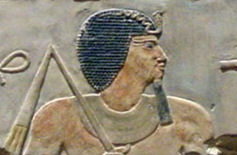
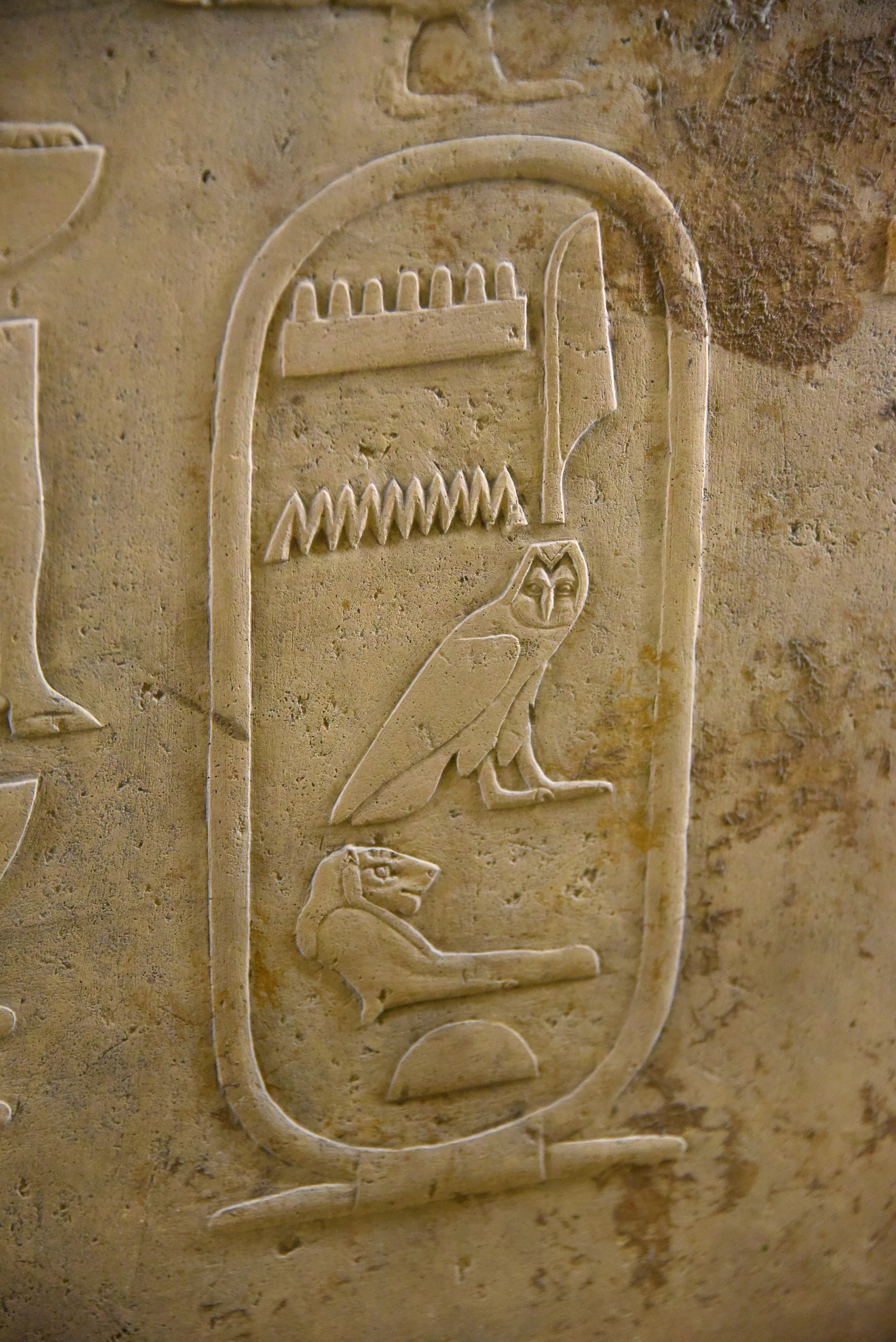
Verses five through eight
5 and Abram took ta-Sarai, his woman, and ta-Lot, son of his brother, and ta-all their goods (substance, property) which they had collected, and ta-the souls which they had acquired (done) in Haran; and they went out to go to the land of Canaan; and they came to the land of Canaan. 6 And Abram went over in the land unto the place of Shechem, unto the Oak of Moreh, and the Canaanite was then in the land. 7 And hwhy appeared to Abram, and said, I will give ta-this land to your seed: And built there an altar to hwhy that appeared to him, 8 and removed from there to the mountain from the east by Beth El, and stretched to tent, having (at) Beth El from seaward (westward), and the Ai from eastward: and built there an altar to hwhy, and called on the Name of hwhy.
Looking at the word SARAI
The Hebrew word for Sarai is "Sah-rai"- Shin, Resh, Yod (yrs). It is from Strong's Concordance number 8297, and its definition
From H8269; dominative; Sarai, the wife of Abraham: - Sarai.
from 8269 "sahr" (rs), and its definition
From H8323; a head person (of any rank or class): - captain (that had rule), chief (captain), general, governor, keeper, lord, ([-task-]) master, prince (-ipal), ruler, steward.
from 8323 "sah-rahr" (rrs), and its definition
A primitive root; to have (transitively exercise; reflexively get) dominion: - X altogether, make self a prince, (bear) rule.
Sarai means "princess".
There are two possible routes of Abraham's Journey to Canaan. One route is that Abraham travelled south to Canaan on the west side of the Jordan river, which is shown on this map below
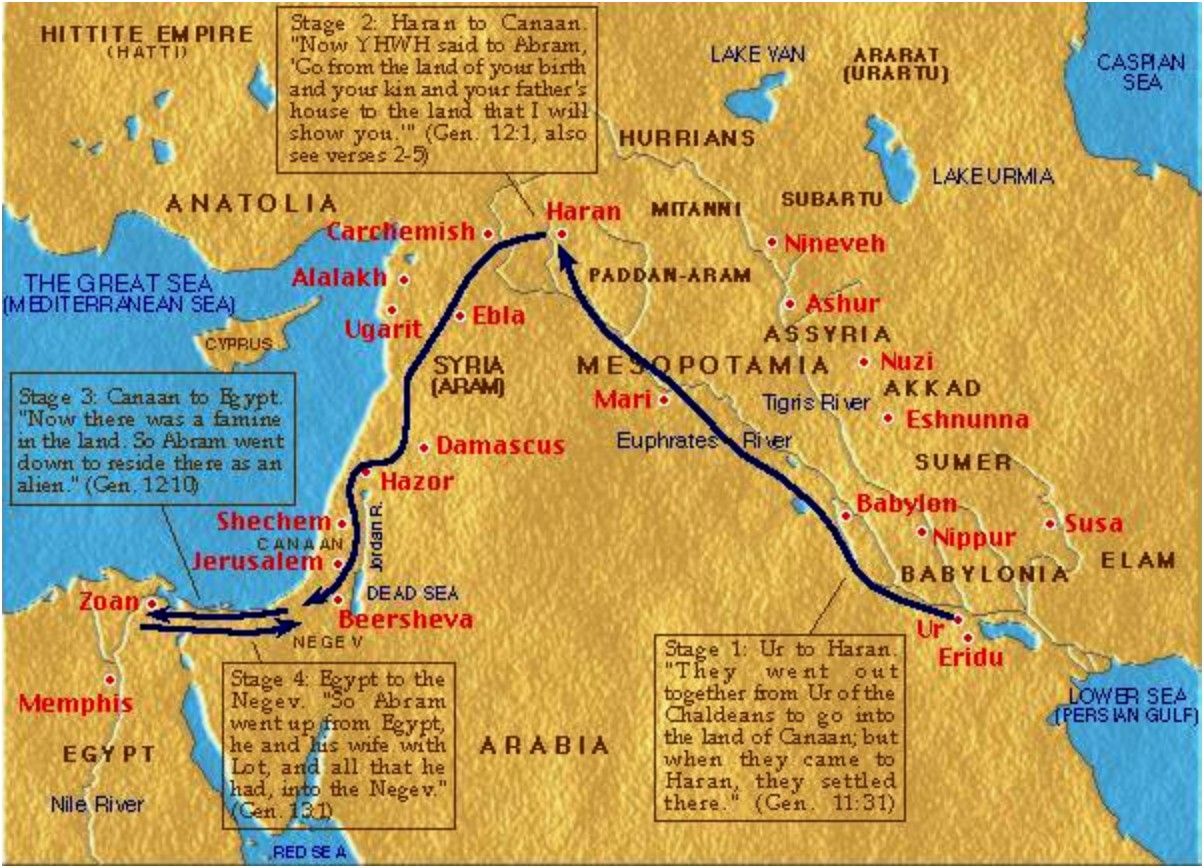
This map could be compared to this map of Joseph and Mary's route from Nazareth to Jerusalem, which is similar in route from Abraham's route
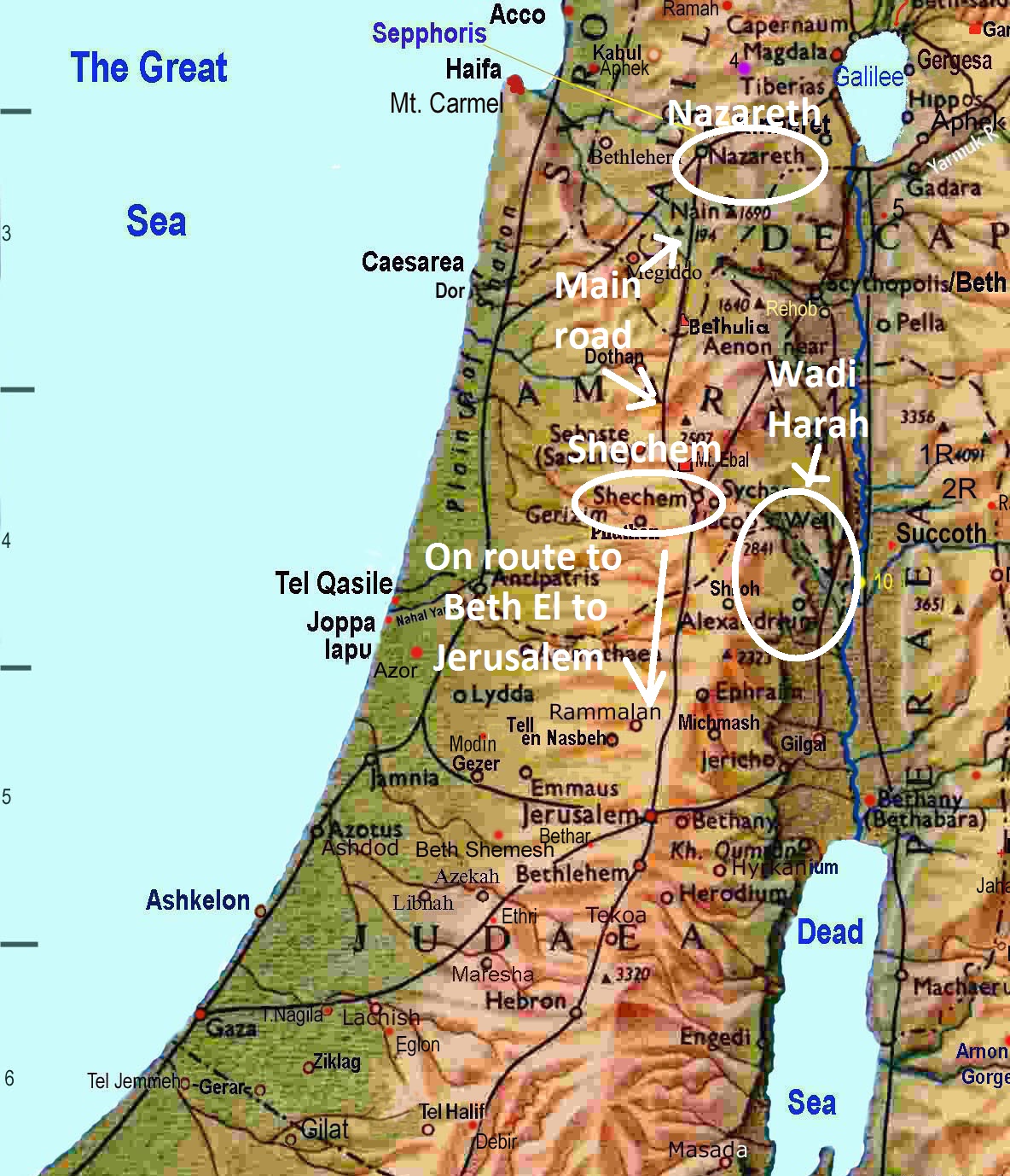
The other possible route is that Abraham crossed from the east of the Jordan River along the Jabbock River to Canaan. According to Kerugmas Blogspot at kerugmas.blogspot.com, there is an article titled "Old Testament Map & History", dated Sunday, February 12, 2012, regarding Abram, Sarai, Lot and others crossing over the Jordan, via the Jabbok River which is located both sides of the Jordan, and the approaching area after Abram and his group crossed is called the Wadi Farah.
This is route according to Kerugmas Blogspot of Abram's journey and the area where Abram's household crossed over
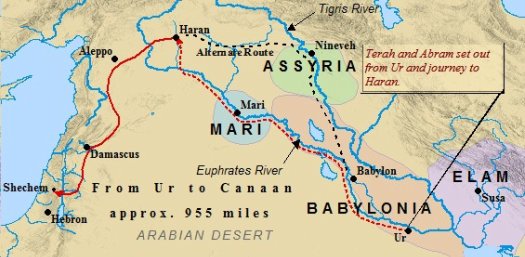
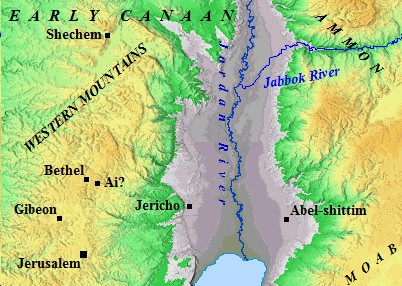
This map below shows the Jabbok River revealed on both sides with the western end located at what is called the Wadi Farah (or Fara)

This is a satellite image of the Wadi Farah area, it is along route 57 heading northwestward, entering into it
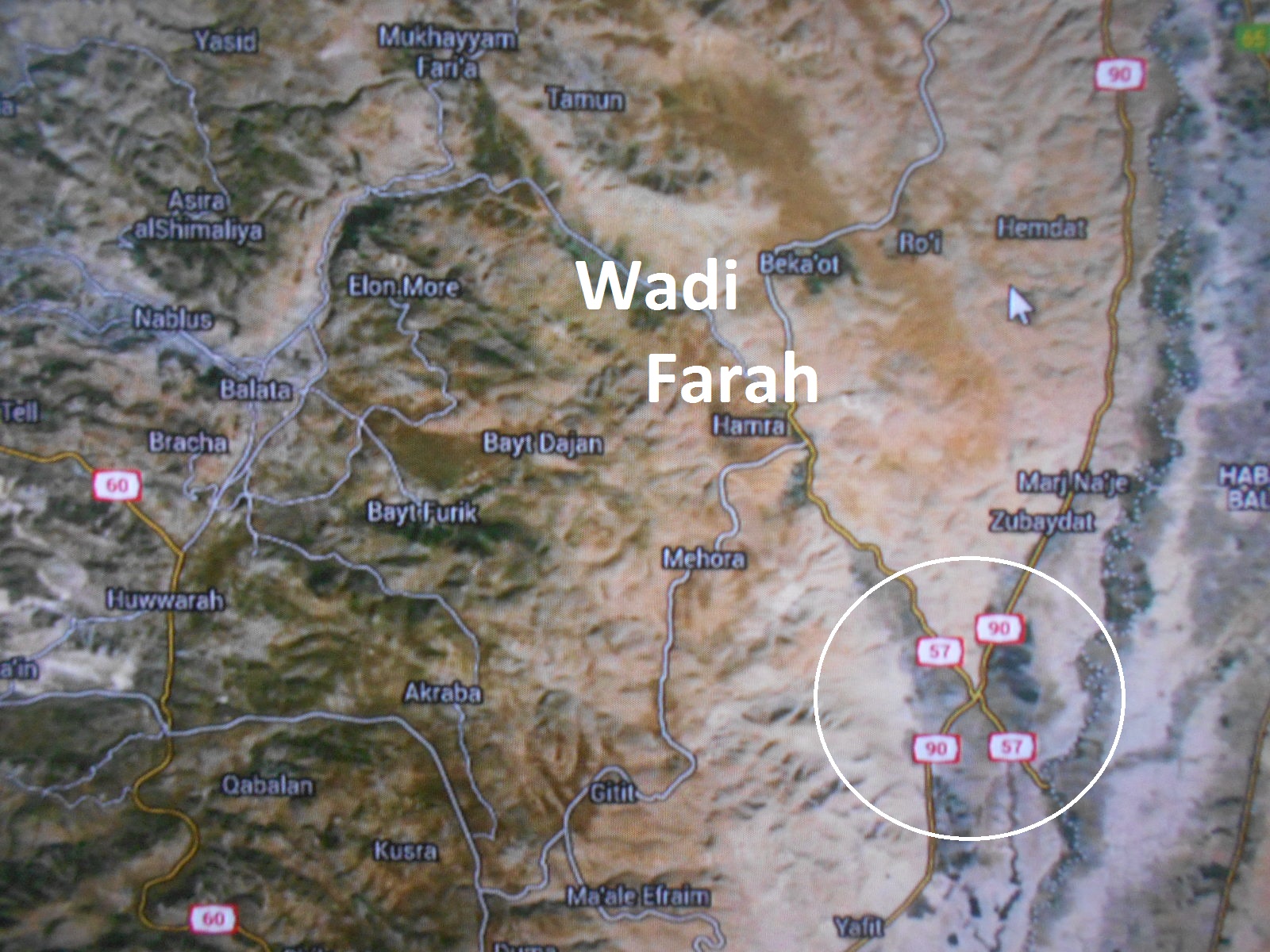
The next images shown is the views taken from the intersection of routes 57 and 90 on the lower right area in the satellite image. Make note that this is what Jacob and his household were viewing during the time of this Torah account.
This is an image looking eastward toward the Jordan River and beyond
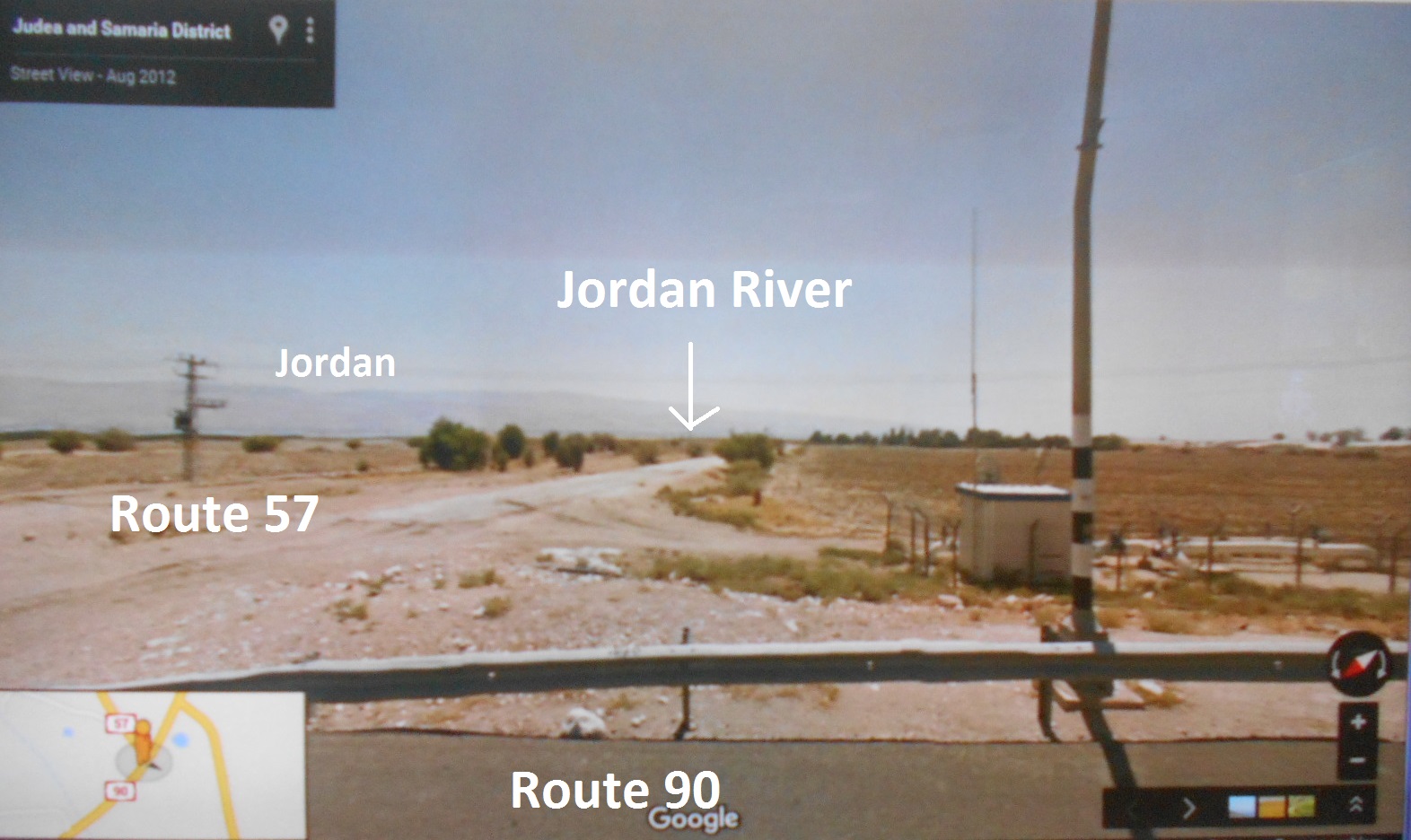
The next images are moving counter clockwise from the previous image
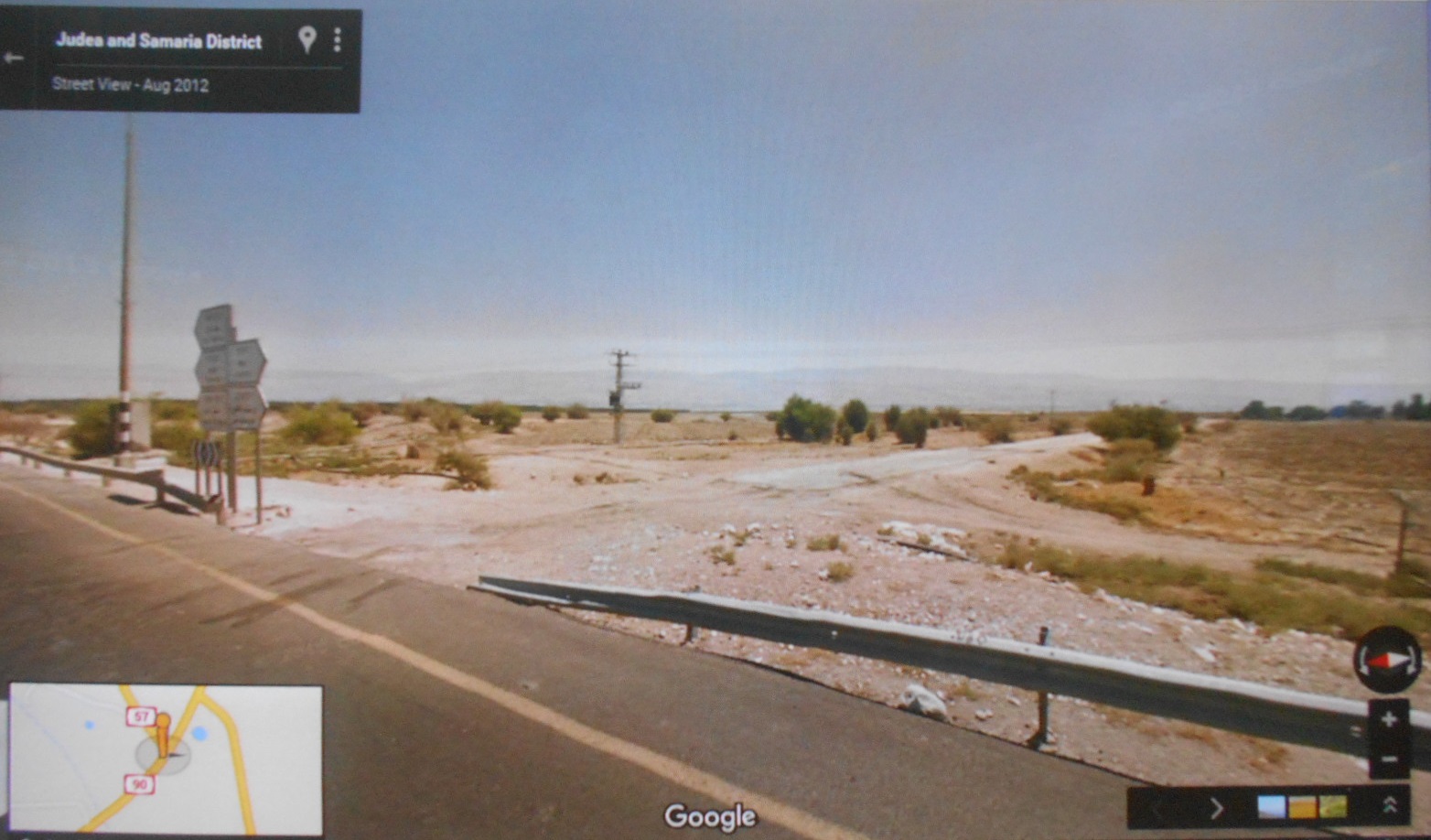
This is a close up of the direction signs
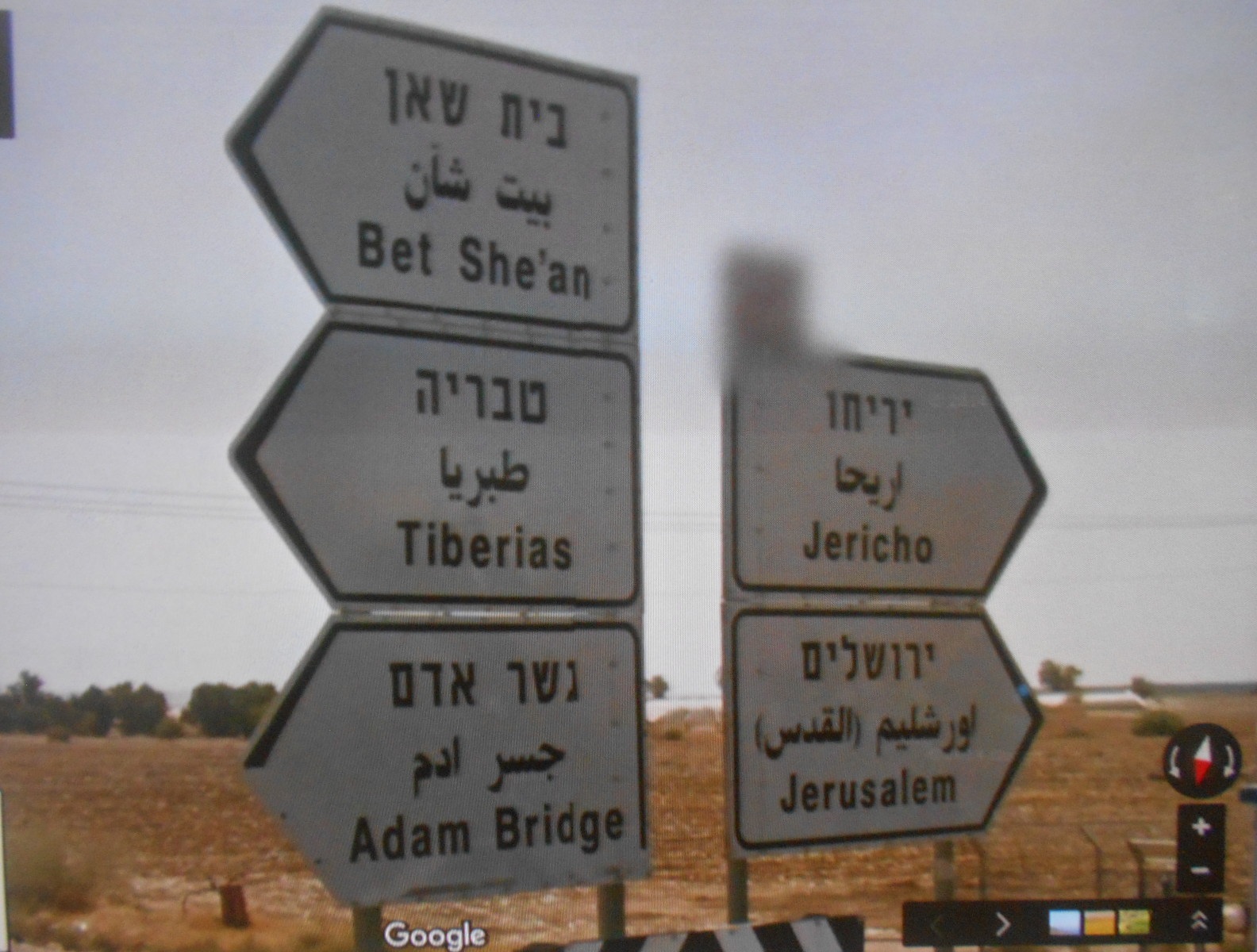
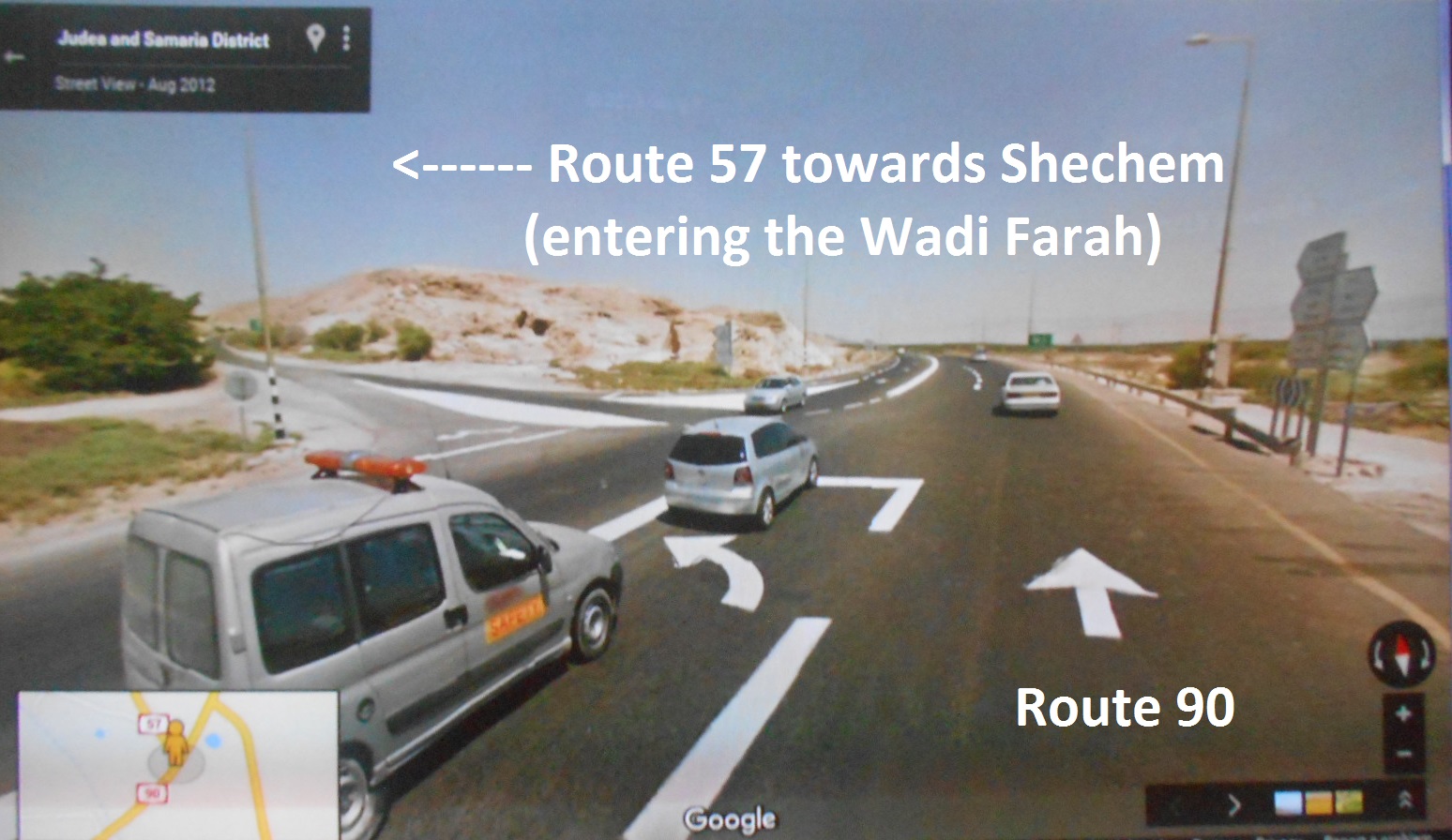
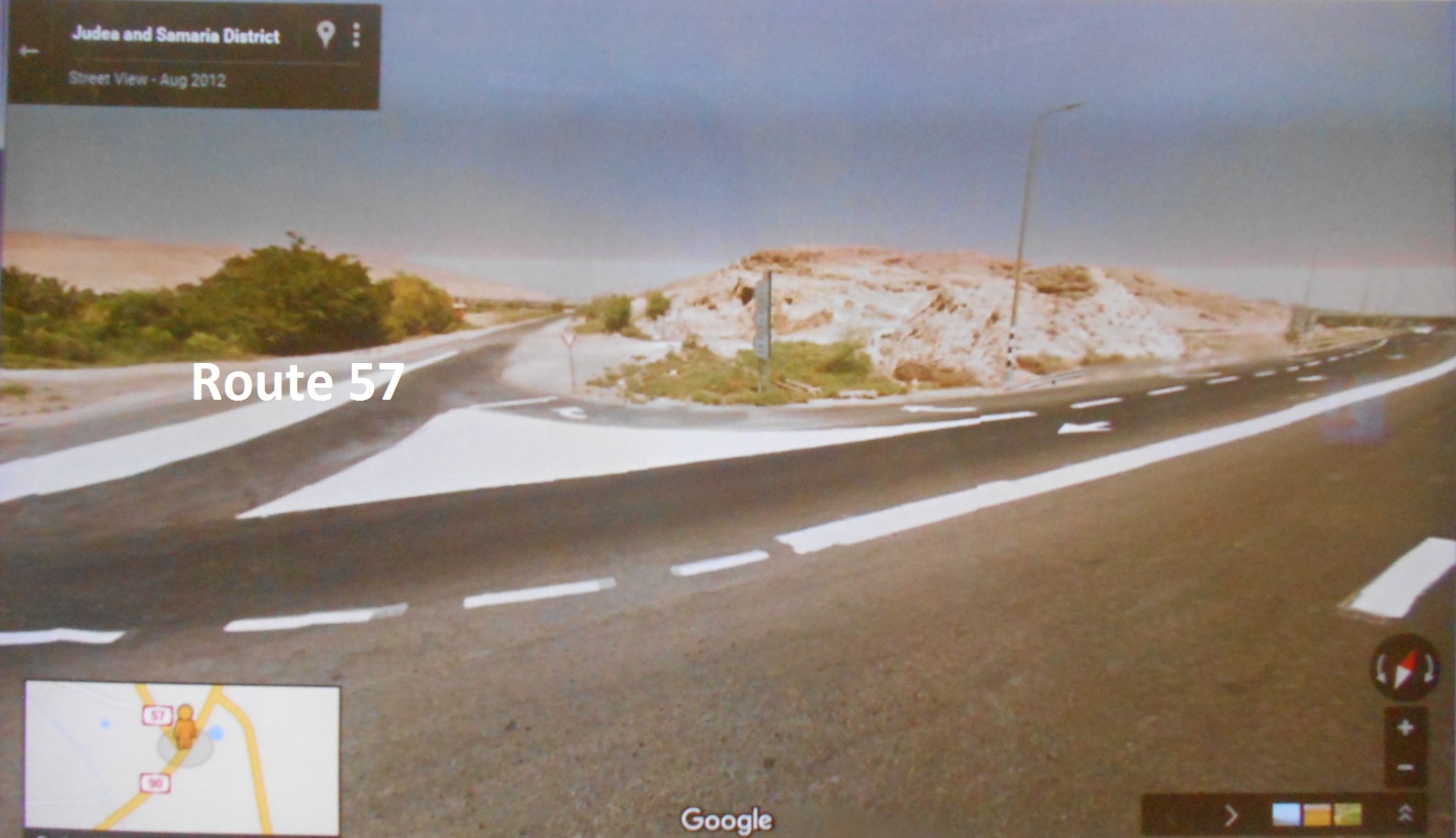
Looking closer at the signs, one could see the sign pointing to Nablus, which is ancient Shechem
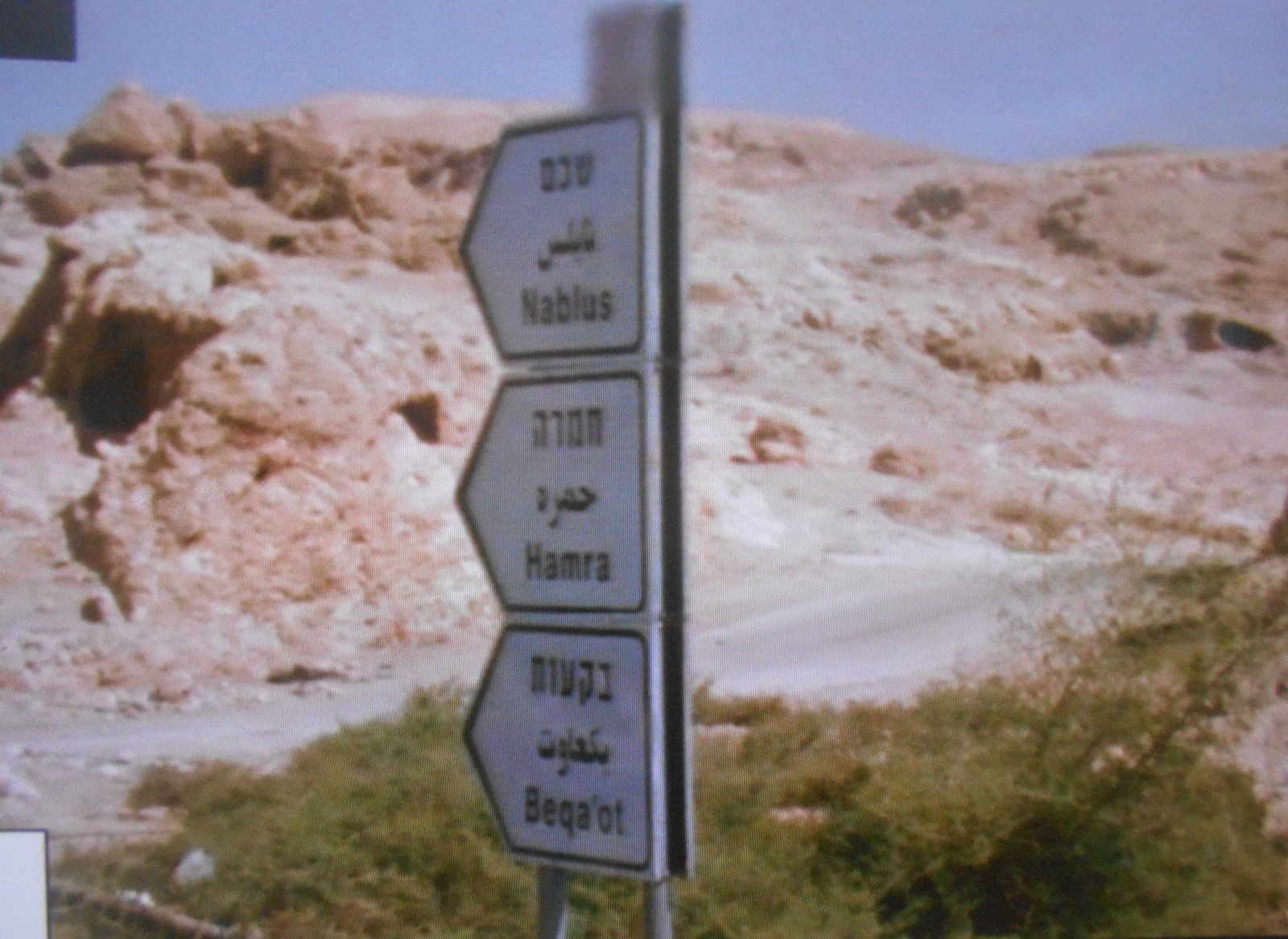
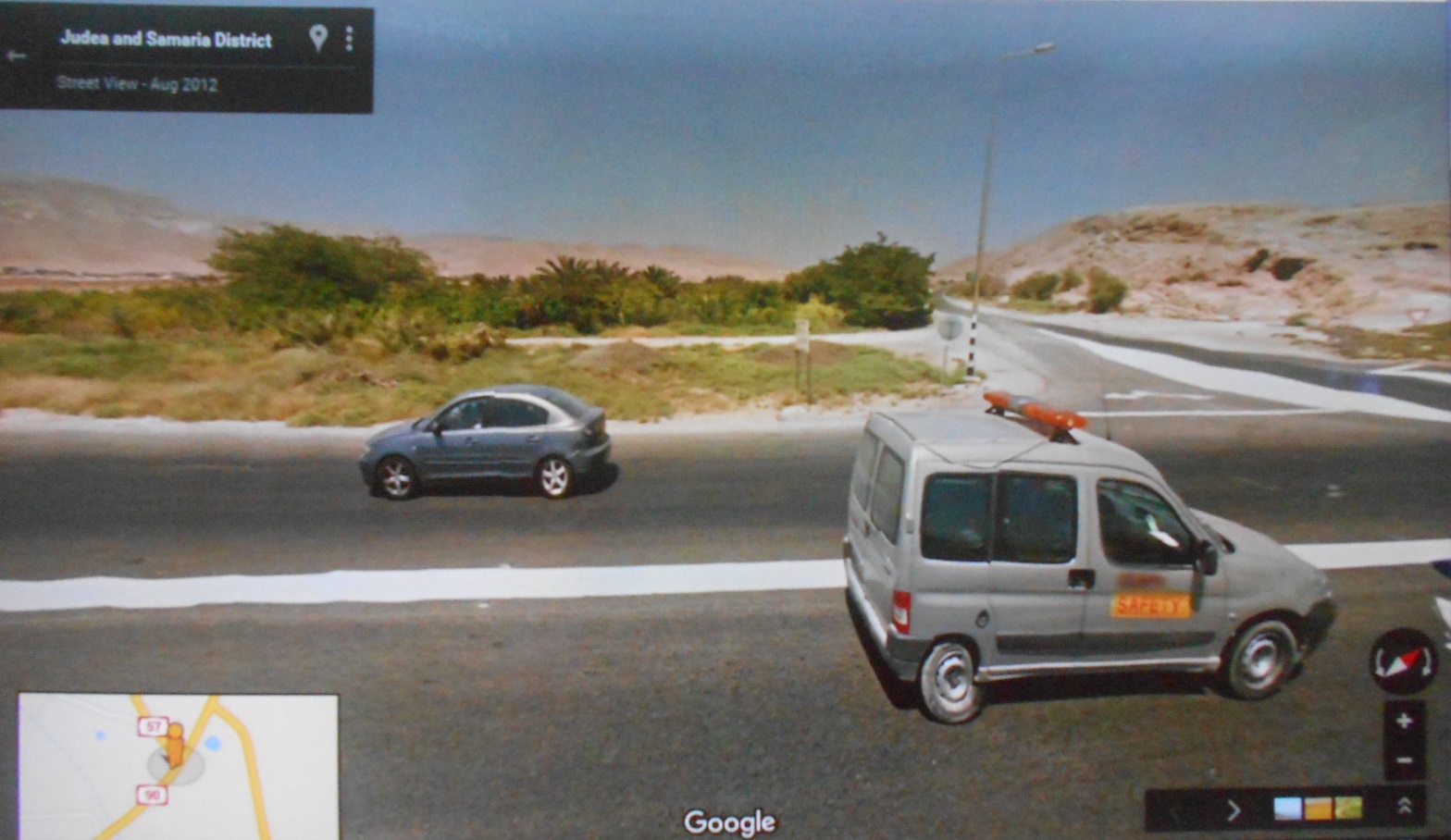
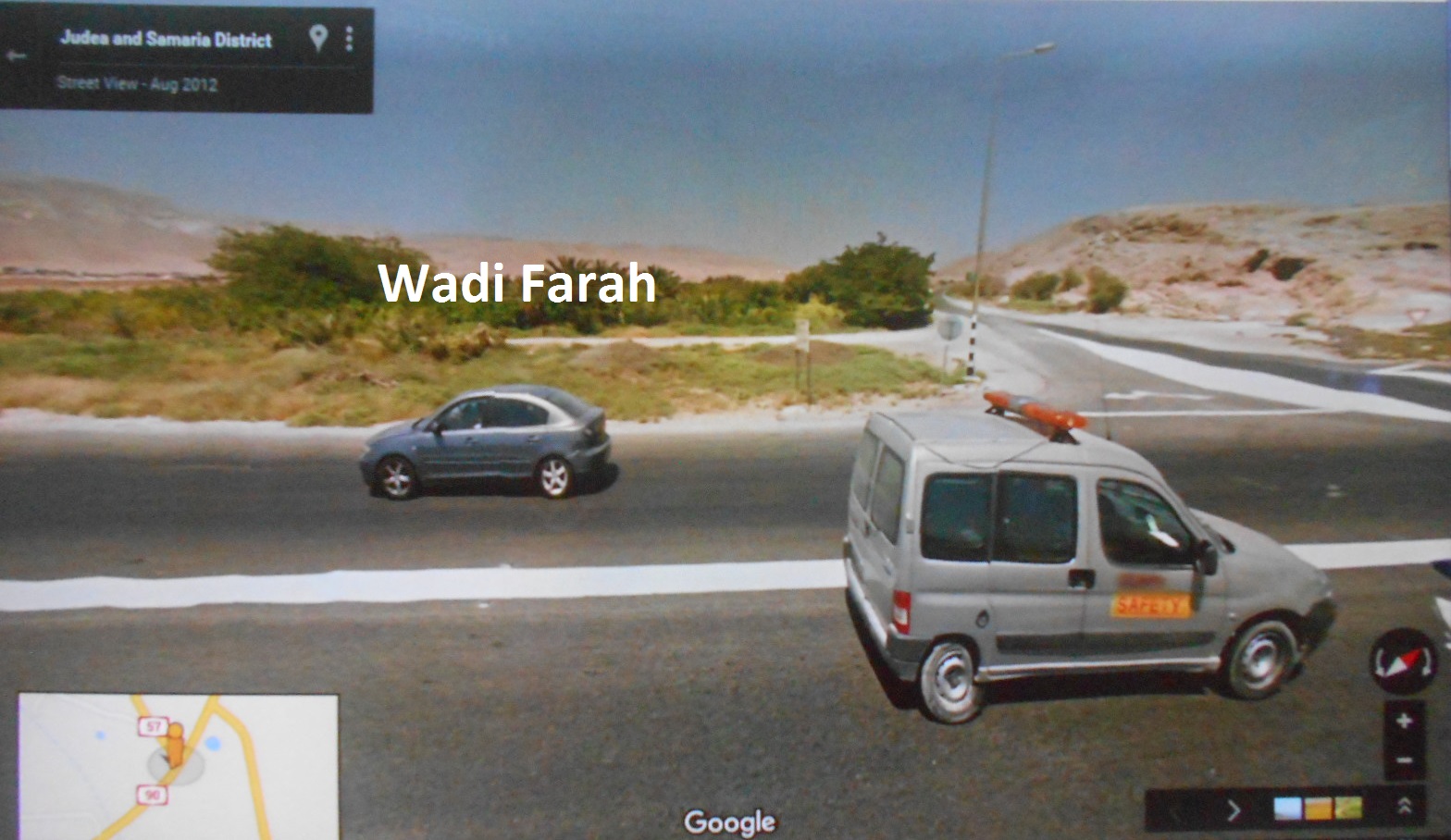
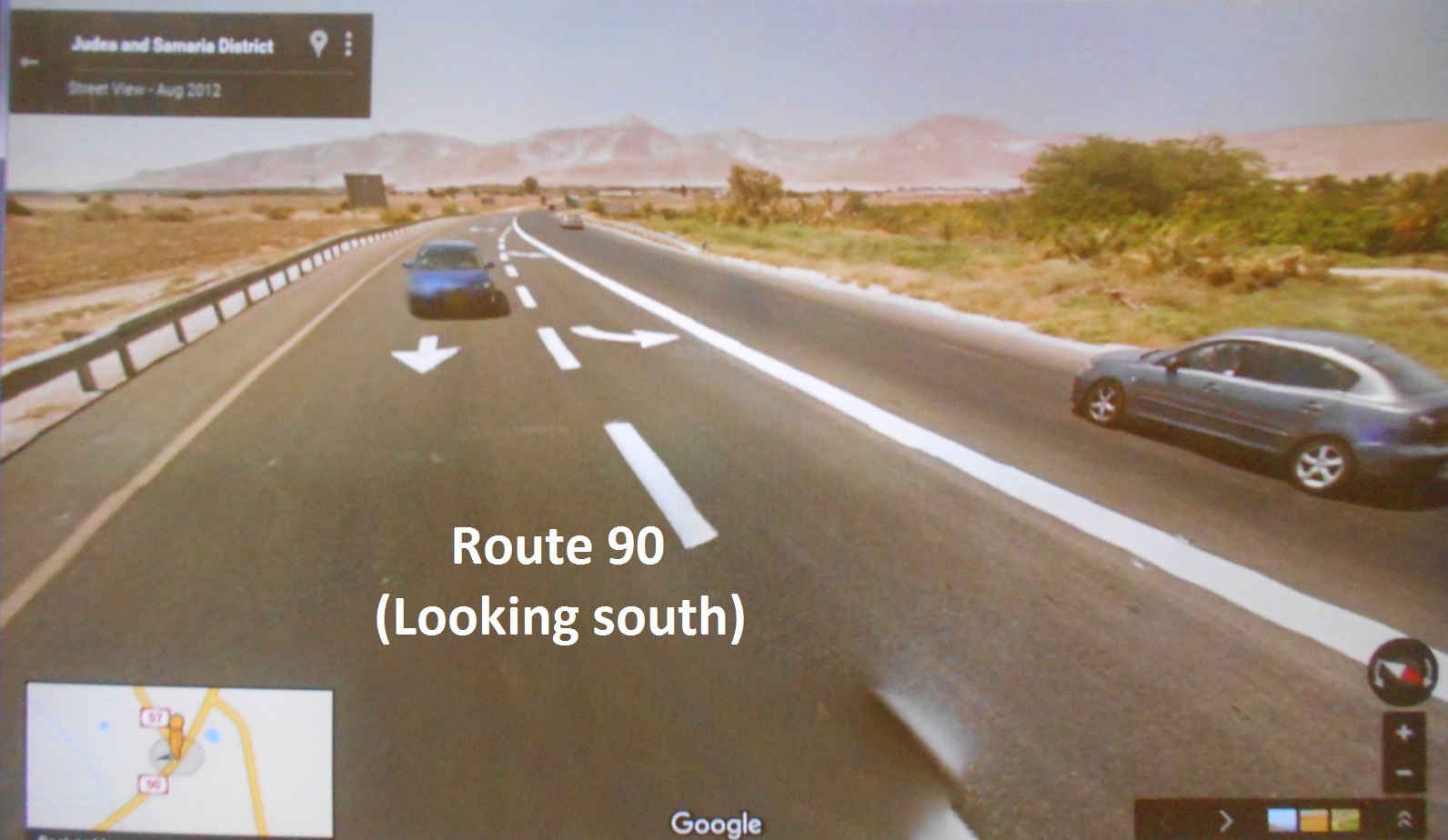
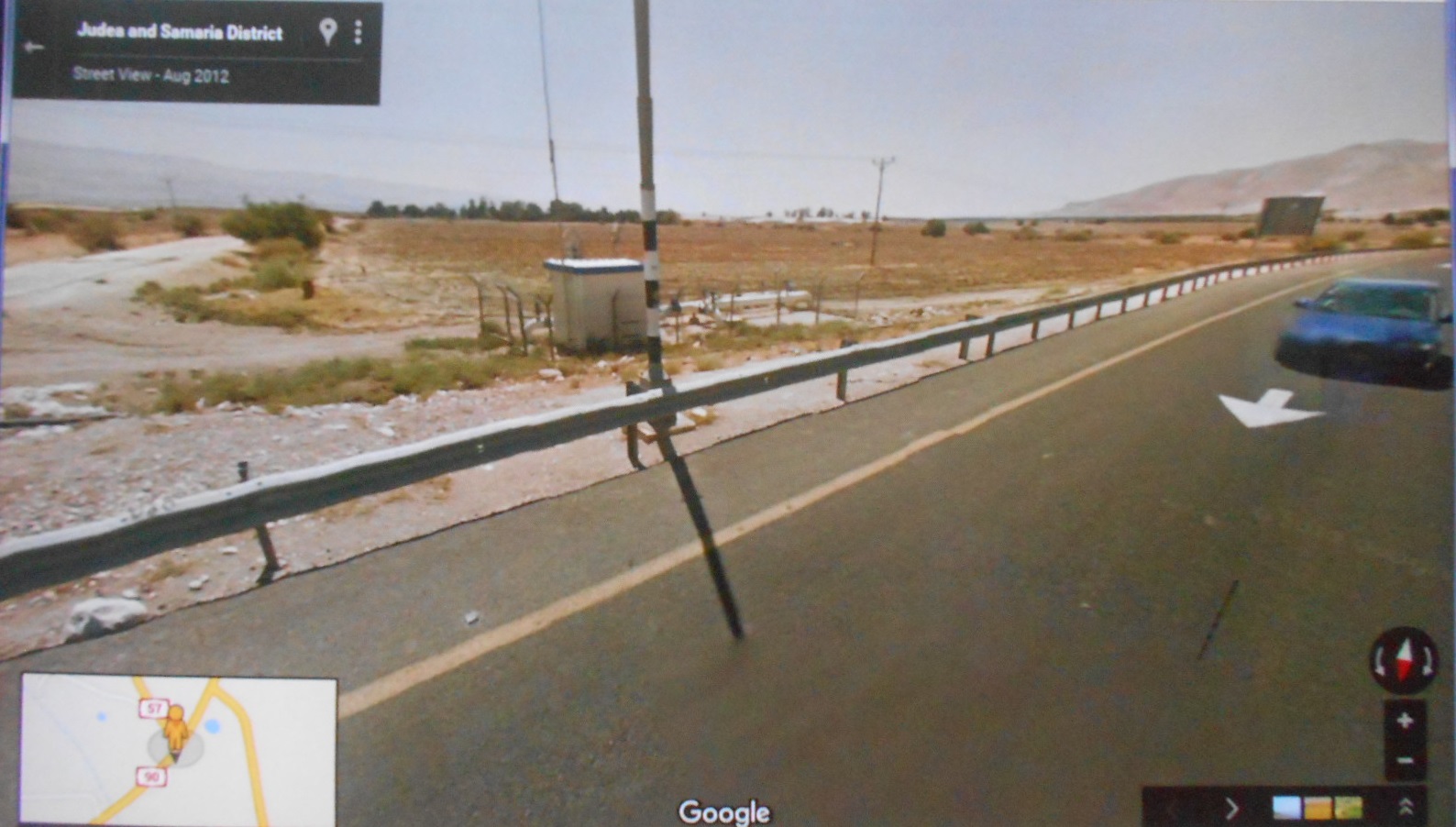
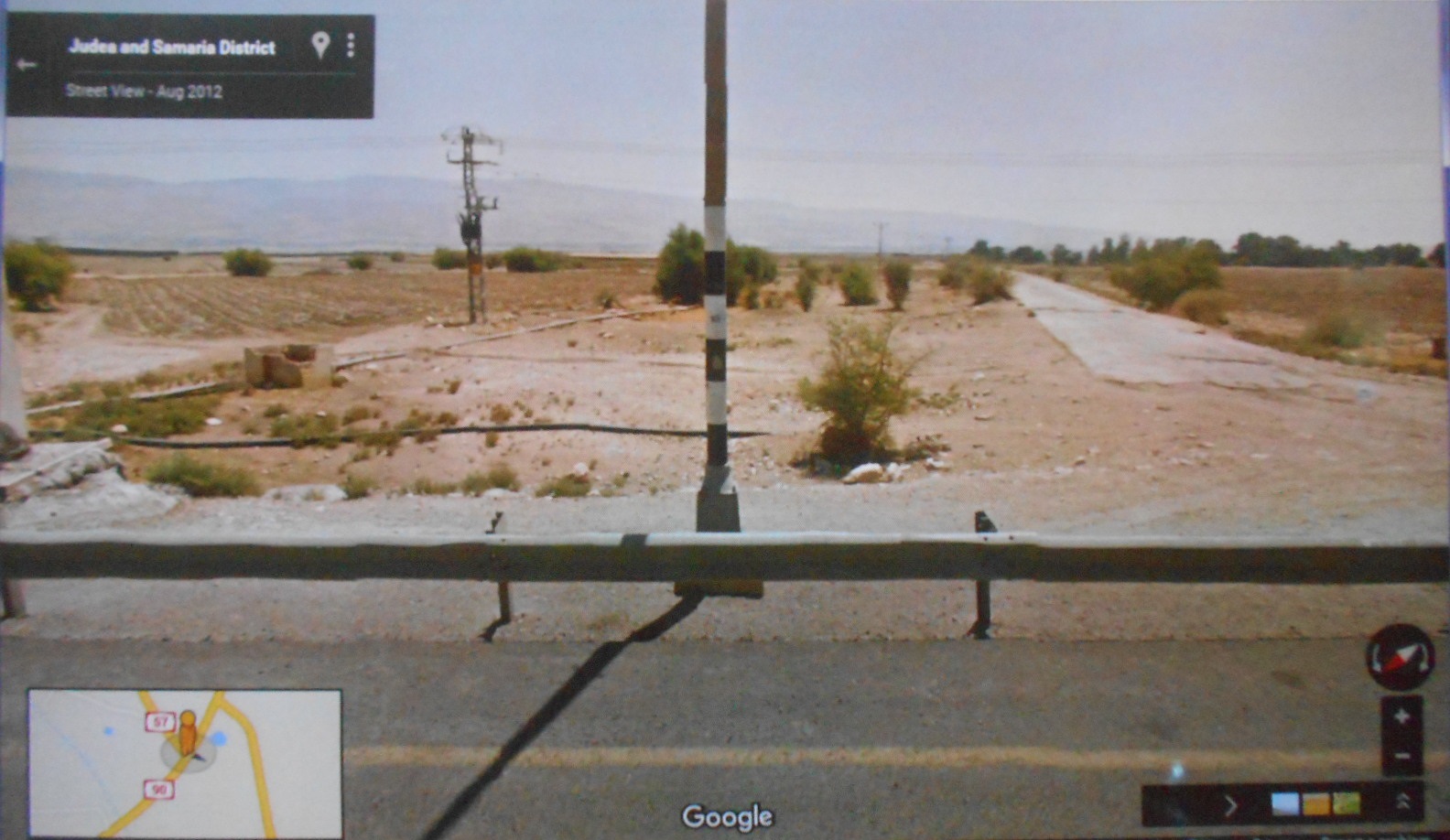
This is a map showing the Wadi Farah, and it shows a line tracking the potential western Jabbok River to Shechem, which is today Nablus
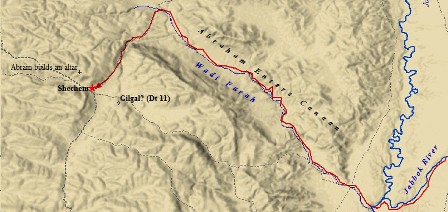
This is what it said regarding Abraham crossing this river
"ABRAHAM entered Canaan by way of the Jabbok River. He crossed the Jordan where the two rivers meet. This Old Testament map shows how Abraham and party followed the Wadi Farah into the Central Highlands".
This is another map from Israel-a-history-of.com under the article "Abraham and Sarah" showing the Wadi Farah that Abraham and Sarah traveled after crossing the Jordan River
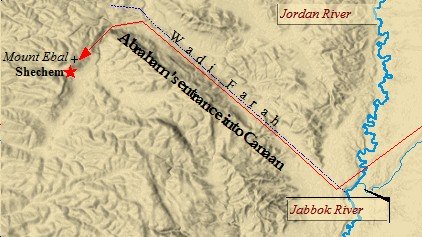
Another map showing the route Abraham took from the Wadi Farah to Shechem and to Beth El
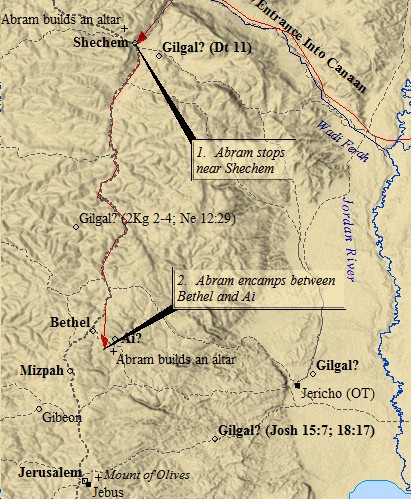
This would be the route that Abraham and Sarah used in their arrival to Canaan for the first time. This would be the same route Jacob and his household travelled as noted in the Torah portion of Vay-Yishlakh, in the book of Genesis
Genesis 32:22 And [Jacob] arose in that night, and took ta-the two of his wives, and ta-the two of his female servants, and ta-one ten (oneteen, eleven) of his lads (boys children), and went over ta the ford (cross over area of, transit), Jabbok. 23 And took them, and made them go over ta-the torrent, and ta-which belong to him went over.
Either Jacob had the genetics in him from his great-grandparents to go this route, or he learned of the route, or he traveled this route. It is my humble opion that it was the latter two.
This map could also be compared to this map of Joseph and Mary's route from Nazareth to Jerusalem, empashing the part route from Shechem to Jerusalem, which is similar in route from Abraham's route

This is a panorama view of the location of Shechem, modern day Nablus, with Mount Gerizim and Mount Ebal


This is a topical view of Shechem and the two mountains
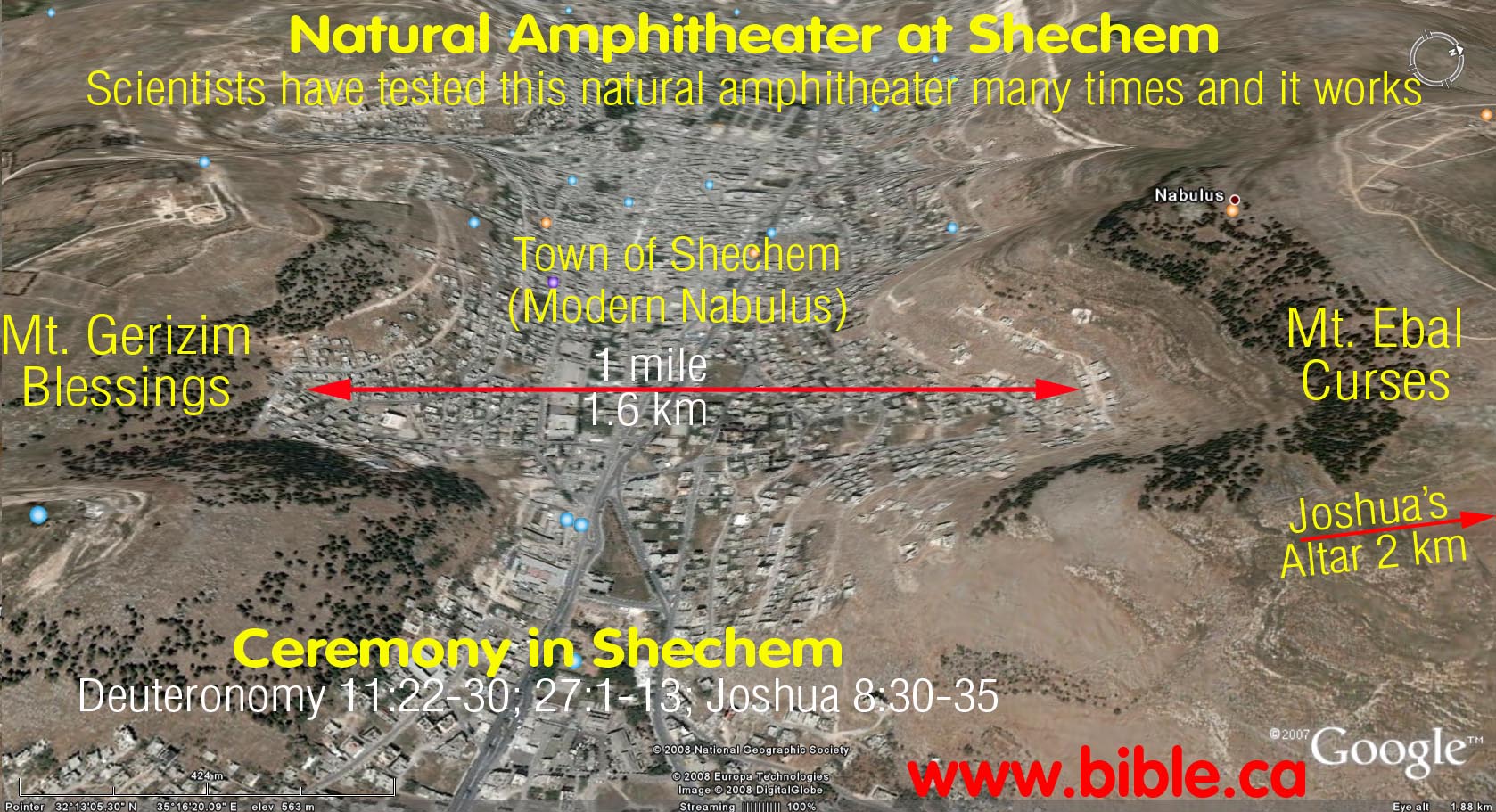
This is the back view from the image above
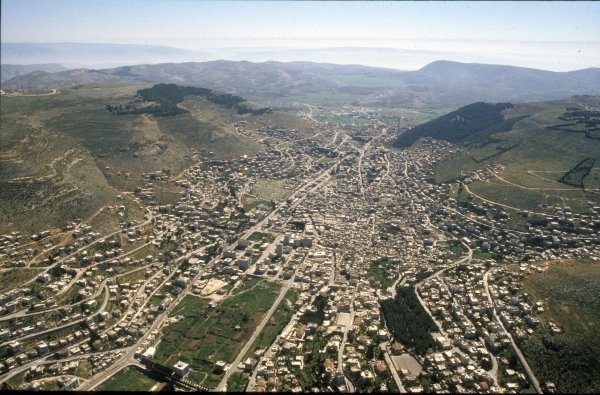
These are other images and sketches of the two mountains
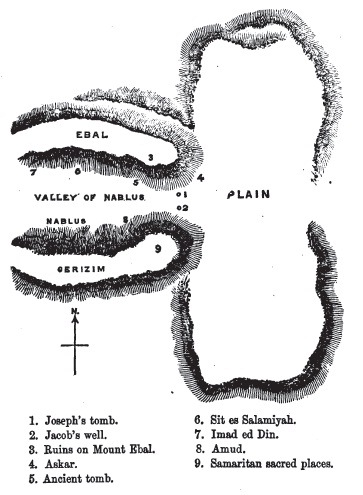
Notice that Joseph's Tomb and Jacob's well, where Yeshua met the Samaritan woman, is also located at Shechem/Nablus.
More maps of Gerizim and Ebal below
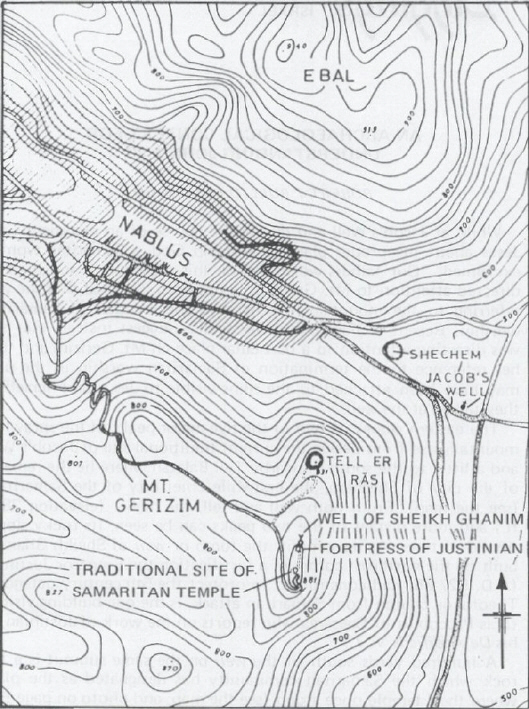
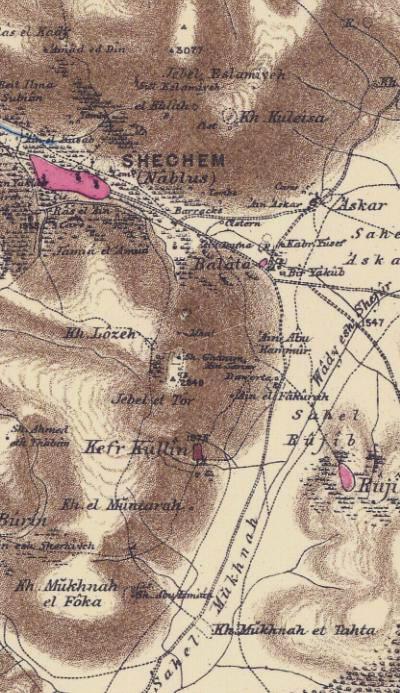
Based on these views, it is shaped like a natural ampitheater. The images also show that it is shaped like a major entrance. This means that hwhy brought Abram to the major entrance to the promise land that he and his descendants were going to inherit.
The Israelites followed after their ancestor's footsteps to "enter" to inherit the land. As the majority of the Hebraic Roots teachers say "History repeats itself".
Looking at the word SHECHEM
The Hebrew word for Shechem is "Sh'khehm"- Shin, Kaph, Mem Sophit (Mks). It is from Strong's Concordance number 7928, and its definition
From H7926; Shekem, the name of a Hivite and two Israelites: - Shechem.
from 7926 "sh'khehm", and its definition
From H7925; the neck (between the shoulders) as the place of burdens; figuratively the spur of a hill: - back, X consent, portion, shoulder.
from 1925 "shah-khahm" (Mks), and its definition
A primitive root; properly to incline (the shoulder to a burden); but used only as denominative from H7926; literally to load up (on the back of man or beast), that is, to start early in the morning: - (arise, be up, get [oneself] up, rise up) early (betimes), morning.
It is well established that this place, Shechem, means "shoulders". It is probable Moses knew that this would be a full human view demonstration of the two shoulder pieces on the High Priest. That must have been a sight to see. Bill Cloud of Shoreshim Ministries made note of this verse that has been under our noses for a long time, but did not see it until he brought this verse out that gave me a "duh" moment. It is in the book of the prophet Isaiah
Isaiah 9:6 For a child is born to us, a son is given to us: and the government, she shall be upon His Shoulders: and His Name shall be called Wonderful, Counsellor, the Mighty El, the Everlasting Father, the Prince of Peace.
This verse was referring to the future event of Yeshua to become the future eternal High Priest, which I detailed in another Torah portion, to bear the goverment upon His shoulders.
Shechem is the same location that Yeshua met the Samaritan woman at the well.
This is the same location that the Israelites were to state the blessings and the cursings on Mount Gerizim and Mount Ebal when they cross over the Jordan into the promise land, which is noted in the Torah portion of R'ey, in the book of Deuteronomy
Deuteronomy 11:29 and shall be, when hwhy, your Elohim, shall bring you to the land which you will enter there to possess her, and shall give ta-the blessing upon Mount Gerizim, and ta-the despisement upon Mount Ebal,
This was fulfilled in the book of Joshua
Joshua 8:30 Then Joshua built an altar unto hwhy, Elohim of Israel, on Mount Ebal, 31 As Moses, the servant of hwhy, commanded ta-the Sons of Israel, as it is written in the Scroll of the Torah of Moses, an altar of whole stones, over which no man hath lift up any iron: and they elevated upon him Elevation Offerings unto hwhy, and sacrificed Peace Offerings. 32 And he wrote there upon the stones, ta a Copy of the Torah of Moses, which he wrote in the presence of the Sons of Israel. 33 And all Israel, and their Elders, and Officers, and their Judges, stood on this side the ark and on that side before the Priests, the Levites, which bare the Ark of the Covenant of hwhy, as well the stranger, as he that was born among them; half of them over against Mount Gerizim, and half of them over against Mount Ebal; as Moses, the servant of hwhy, had commanded before, that they should bless ta-the People of Israel. 34 And afterward he read ta-all the Words of the Torah, the blessings and cursings, according to all that is written in the Scroll of the Torah. 35 There was not a Word of all that Moses commanded, which Joshua read not before all the Assembly of Israel, with the women, and the little ones, and the strangers that were conversant among them.
This act of having six of each of the tribes to stand on each of the two mountains is likened to the two onyx shoulder pieces of the high priest bearing six tribal names on each of the onyx pieces. It is located in the Torah portion of T'tsavveh, in the book of Exodus
Exodus 28:9 And you shall take ta-two Onyx Stones, and you will engrave upon (over) them the names of the Sons of Israel: 10 Six with their names upon the one Stone, and ta-the remaining six names upon the second Stone according to their births. 11 Of a work of an engraver (craftsman, artificer) of stone, like the carving (sculpting. opening) of a signet (seal, ring), you shall carve (sculpt, open) ta-the two Stones upon the names of the Sons of Israel: you shall do (make) them Enclosings of Broaches (Brocades, Ouches) of gold. 12 And you shall set (put) ta-the two Stones upon the Upper Arm Corners (Shoulders) of the Ephod for Stones of a Remembrance (Memorial) for the Sons of Israel: and Aaron shall bear (carry, lift up) ta-their names to the Face of hwhy upon his two Upper Arm Corners (Shoulders) for a Remembrance (Memorial).
Mount Gerizim, facing east, likening it to the shoulder of the High Priest, would be located on the "right shoulder", the same direction which the Tent of Appointment would be facing, which is southward. The right side of the shoulder is the "strong side", and this is the side the blessings are located.
Question: "Is Joshua's altar the same location that Abraham built his altar in Shechem"? It could be possible.
This image reveals how Mount Gerizim and Mount Ebal at Shechem compares to the two shoulder pieces of the High Priest

Verses eleven through fourteen
11 And was, as the which had drawn near to come to Egypt, and said to Sarai his woman, Behold now, I know that you are a beautiful (fair) woman of appearance: 12 and shall be when the Egyptians, they shall see you, and they shall say, This is his woman: and they will kill me, and you they will let live (keep alive). 13 Say now, you are my sister: by that, shall be good (well) to me on over you [(on your transition)]; and my soul, she shall live on your occasion (circumstance, account).
14 And was, as Abram came to Egypt, and the Egyptians, they saw ta-the woman for she was very beautiful (fair),
The account of Abram and Sarai regarding Pharaoh taking beautiful women and killing their husbands must have been a matter from Egypt that the nations learned from time, otherwise Abram would not have told Sarai this. There is no account if Sarai knew about this matter or not, but it was most likely only the men knew about it, by talking about it at the public places and kept the matter to themselves, especially from their wives.
Also in verse thirteen of this week's Torah portion passage, Abram told Sarai to say that she is his sister. This is another account when they went through this again with the king of the Philistines in the Torah portion of Vay-Yeyra, in the book of Genesis
Genesis 20:11 And Abraham said, For I said, Except, the Reverence (Fear) of Elohim is not in this place; and would slay me upon the word of my wife. 12 And also truly is my sister; she is the daughter of my father, but not the daughter of my mother; and she became to me for a wife.
This account reveals that Abram and Sarai were both half siblings to each other via their father, Terah. Based on these two kings, we can say that it was common practice for kings to take ladies of fair appearance.
This is sketch of the relation between Abram and Sarai
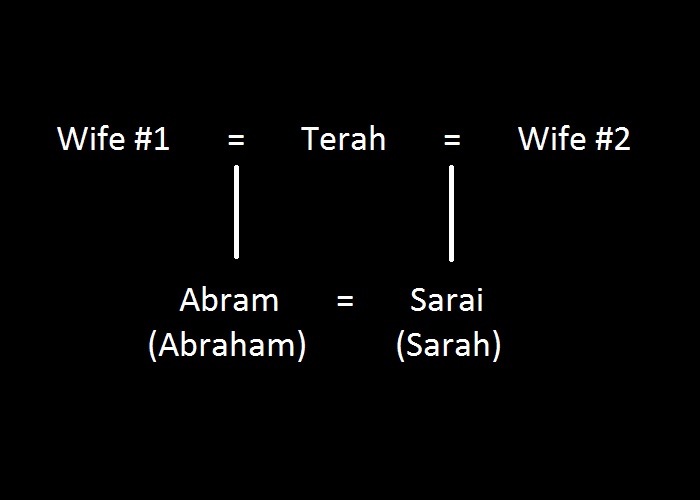
Also, based on the time line, it would be most likely that the Pharaoh whom Abram and Sarai faced was Sehetpibre Amenamhat I (Wehemmesu) noted earlier.
Verses fifteen and sixteen
15 and the princes of Pharaoh, they saw her, and they praised her to Pharaoh: and the woman, she was taken at the house of Pharaoh, 16 and did good (well) to Abram on over her [(on her transition)]: and had to him flocks, and herds, and he donkeys, and male servants, and female servants, and she donkeys, and camels.
Despite of his lack of ability to protect his wife, hwhy allowed the circumstance to reward him via Pharoah with provision that would leave him well off.
Based on the time line that Abram was seventy five years old around 1979 BC, we can calculate that Abram and his family were in Egypt between 1970 and 1978 BC. If this is correct, according to Wikipedia, that Pharaoh who was king of Egypt at the time was Sehetepibre Amenemhat I who was the first king of the Twelfth Dynasty of the Middle Kingdom period. According to Wikipedia, Sehetepibre Amenemhat I reigned from 1991-1962 BC, in which Wikipedia says the Twelfth Dynasty was the golden age of the Middle Kingdom period.
Wikipedia also noted something interesting regarding Amenemhat I. This is what it says:
"Amenemhat I's Horus name, Wehemmesu, which means renaissance or rebirth, is an allusion to the Old Kingdom period, whose cultural icons and models (such as pyramidal tombs and Old Kingdom artistic motifs) were emulated by the Twelfth Dynasty kings after the end of the First Intermediate Period. The cult of the king was also promoted during this period, which witnessed a steady return to a more centralized government".
How convenient that Abram and his family arrived there during the time of "rebirth", which would fit during the preparations of Abram's "spiritual rebirth" in the near future.
This is a stele image of Sehetepibre Amenemhat I (Wehemmesu)

If this is the correct time line, Sehetepibre Amenemhat I (Wehemmesu) was king of Egypt of the beginning of the Middle Kingdom period when hwhy commanded Abram to leave the ground in Haran. Do you think that hwhy knew what He was doing? How His timing is perfect. As Rico Cortes of Wisdom In Torah Ministries says "Koinkidinkee? I don't think so".
Verses seventeen through twenty
17 And hwhy plagued ta-Pharaoh and ta-his house of great plagues upon the word of Sarai, woman of Abram. 18 And Pharaoh called to Abram, and said, What is this you have done to me? To why you did not tell to me that she is your wife? 19 To why did you say, She is my sister? And I took her to me for a wife: And now behold your woman. Take and go. 20 And Pharaoh commanded the men upon him: and they sent away him and ta-his wife, and ta-all which belonged to him.
hwhy stepped in on behalf of Sarai and Abram, and plagued Pharaoh for taking Sarai. As Brad Scott of Wildbranch Ministry and Bill Cloud of Shoreshim Ministries say "History repeats itself". This account of Abram, Sarai and Pharaoh will be repeated in a grandiose scale: Under these factors:
1. Sarai taken by Pharaoh to his house: The Israelites taken by Pharoah to be a house of slaves
2. Abram getting the benefits of Sarai, his wife: The Israelites would take the spoils of Egypt
3. Pharaoh gets the plague for taking Sarai: Pharaoh and the nation of Egypt will go through ten different plagues
4. Pharaoh sends Sarai and Abram and his spoils out of Egypt: Pharaoh send the Israelites which took the spoils of Egypt out of Egypt
!!!hwhy Kl dbk
CHAPTER 13
Genesis 13:1-18
Gen 13:1 And Abram ascended from Egypt, he, and his woman, and all which belonged to him, and Lot with him, to the Negeb. 2 And Abram was much (very) heavy in the livestock, in the silver, and in the gold. 3 And went to his journeyings from the Negeb and unto Beth El unto the place which had been there to tent in the beginning between Beth El and between the Ai; 4 to the place of the altar, which had done (was made) there in the first: and Abram called on the Name of hwhy there. 5 And also to Lot that went out ta-Abram had flocks, and herds, and tents, 6 and the land could not bear them to dwell together, for their goods (substance, property) had multiplied (increased), and they are not able to dwell together. 7 And was a strife (contention) between the shepherds (tenders) of the livestock of Abram and the shepherds (tenders) of the livestock of Lot: and the Canaanite and the Perizzite dwelled then in the land, 8 and Abram said to Lot, Not now, she shall be no strife (contention) between me and between you, and between my shepherds (tenders) and between your shepherds (tenders); for we are men, brothers. 9 That not all of the land is to your face? Separate (Split) now from upon me: if the small (left), and I to the right; and if the right, and I to the small (left). 10 And Lot lifted up (beared) ta-his eyes, and saw ta-all the circumjacent region of the Jordan, for all of her was well watered (quaffed) to the facing of hwhy wasting (ruining) ta-Sodom and ta-Amorrah, as the Garden of hwhy, as the land of Egypt, at your coming to Zoar. 11 And Lot chose for himself ta all of the circumjacent region of the Jordan; and Lot pulled up (journeyed), with eastward: and they separated (split) a man from upon his brother. 12 Abram dwelled in the land of Canaan, and Lot dwelled in the cities of the circumjacent region and tented unto Sodom. 13 And the men of Sodom were evil ones and sinners to hwhy much. 14 And hwhy said to Abram after that Lot separated (split) from upon him, Lift up (bear) your eyes now and look from the place which you are there; hiddenward (northward), and negebward (southward), and eastward, and seaward (westward): 15 for ta-all the land which you see to yourself will I give her to your seed unto ages [(forever)]. 16 And I will set ta-your seed as the dust of the Earth: which if a man is able to count ta-the dust of the Earth, also your seed shall be counted. 17 Arise, walk in the land to her length and to her breadth; for I will give her to you. 18 And Abram tented, and came and dwelled among the Oaks of Mamre which was in Hebron, and built there an altar to hwhy.
(NOTE: Not all verses will have comments)
Verses one through four
1 And Abram ascended from Egypt, he, and his woman, and all which belonged to him, and Lot with him, to the Negeb. 2 And Abram was much (very) heavy in the livestock, in the silver, and in the gold. 3 And went to his journeyings from the Negeb and unto Beth El unto the place which had been there to tent in the beginning between Beth El and between the Ai; 4 to the place of the altar, which had done (was made) there in the first: and Abram called on the Name of hwhy there.
This is a map of the area showing Beth El and Ai not located far from Shechem

Verses five through seven
5 And also to Lot that went out ta-Abram had flocks, and herds, and tents, 6 and the land could not bear them to dwell together, for their goods (substance, property) had multiplied (increased), and they are not able to dwell together. 7 And was a strife (contention) between the shepherds (tenders) of the livestock of Abram and the shepherds (tenders) of the livestock of Lot: and the Canaanite and the Perizzite dwelled then in the land,
Indirectly related, the Israelites were told by Moses to get rid of the Canaanites from the land in the Torah portion of Mishpatim, in the book of Exodus
Exodus 23:32 You will not cut a covenant to them and to their elohim. 33 They will not dwell in your land, lest they will make you a sin to Me if you serve ta-their elohim; for shall be for a snare (trap) to you.
The Canaanites would influence their elohim on the Israelites if they are not removed from the land. This is the similar issue why Abram had to rid of Lot and their people. The strife between Abram's people and Lot's people was a manifestation of why Abram was commanded from hwhy not to bring Lot, his kindred, with him.
Verses eight through eleven
8 and Abram said to Lot, Not now, she shall be no strife (contention) between me and between you, and between my shepherds (tenders) and between your shepherds (tenders); for we are men, brothers. 9 That not all of the land is to your face? Separate (Split) now from upon me: if the small (left), and I to the right; and if the right, and I to the small (left). 10 And Lot lifted up (beared) ta-his eyes, and saw ta-all the circumjacent region of the Jordan, for all of her was well watered (quaffed) to the facing of hwhy wasting (ruining) ta-Sodom and ta-Amorrah, as the Garden of hwhy, as the land of Egypt, at your coming to Zoar. 11 And Lot chose for himself ta all of the circumjacent region of the Jordan; and Lot pulled up (journeyed), with eastward: and they separated (split) a man from upon his brother.
Looking at the following words:
RIGHT
The Hebrew word for right is "yah-mahn"- Yod, Mem, Nun Sophit (Nmy). It is from Strong's Concordance number 3231, and its definition
A primitive root; to be (physically) right (that is, firm); but used only as denominative from H3225 and transitively, to be right handed or take the right hand side: - go (turn) to (on, use) the right hand.
LEFT
The Hebrew word for left is "s'mohl"- Shin, Mem Aleph, Lamed (lams). It is from Strong's Concordance number 8040, and its definition
A primitive word (rather perhaps from the same as H8071 (by insertion of the 'aleph) through the idea of wrapping up); properly dark (as enveloped), that is, the north; hence (by orientation) the left hand: - left (hand, side).
This Hebrew word is where we get our modern English word for "small", meaning in Biblical perspective "the smaller side".
Which side position did Abram say this when he spoke to Lot? The key point of this Torah portion passage was when it says that Lot just lifted his eyes up. But it doesn't say that Lot turned his face or his head and saw the east. Based on the circumstance in this Torah portion passage, Abram was facing West, and Lot was facing east, because he just lifted his eyes without turning them. When Lot chose the east, it shows that Lot was choosing the area by sight instead of faith, as the apostle Paul said in his letter to the assembly in Corinth
2 Corinthians 5:7 (For we walk by faith, not by sight:)
Lot chose to go East by going left, meaning "the smaller side". Risingward also means Eastward. It was the Biblical perspective relating to the direction where the sun rises.
Also, when Lot made the decision, he did not put into consideration that the land of Sodom and Amorrah (it is not Gomorrah with a "G") that they were wicked people. Sodom is where we get our modern English word "sodomy", and Amorrah is where we get two modern words: One- the modern Italian word for "amore", the modern Italian word for "love", and two- which is the more probable modern English word for "immoral" or "immorality". These two cities were "perverse cities". Whether Lot had known about their reputation or not, I don't know, but he had to have known about it in time. In spite of this, he cared only for the sight of the land.
Regarding Lot's name, as noted earlier, his name also means "veil". As soon as Lot made the choice to leave, Abram's symbolic veil was removed from his eyes as well so that he could see what hwhy has in store for him. This is another reason Abram was commanded by hwhy not to bring kindred when leaving the land of his nativity.
As noted in the beginning of this Torah portion, hwhy knew that it would take time for Abram to phase out his "sentimentality" from his home town, and his father's estate, which included his nephew, Lot.
Verses fourteen and fifteen
14 And hwhy said to Abram after that Lot separated (split) from upon him, Lift up (bear) your eyes now and look from the place which you are there; hiddenward (northward), and negebward (southward), and eastward, and seaward (westward): 15 for ta-all the land which you see to yourself will I give her to your seed unto ages [(forever)]. 16 And I will set ta-your seed as the dust of the Earth: which if a man is able to count ta-the dust of the Earth, also your seed shall be counted. 17 Arise, walk in the land to her length and to her breadth; for I will give her to you. 18 And Abram tented, and came and dwelled among the Oaks of Mamre which was in Hebron, and built there an altar to hwhy.
I was after Lot "the veil" had left when hwhy told Abram to lift his eyes and see the land that he and his descendants would possess. In other words, hwhy allowed Lot to be a veil to Abram's eyes, but when Lot as the veil left, Abram eyes were able to see the land that hwhy had given to him. hwhy blessed Lot to be with Abram and used Lot to have possessions and servants to grow in the camp as a means to outgrow the camp in verses five and six of this week's Torah portion passage
5 And also to Lot that went out ta-Abram had flocks, and herds, and tents, 6 and the land could not bear them to dwell together, for their goods (substance, property) had multiplied (increased), and they are not able to dwell together.
It was hwhy's mercy to send Lot and his encampment out of the land hwhy was giving to Abram.
Verse sixteen
16 And I will set ta-your seed as the dust of the Earth: which if a man is able to count ta-the dust of the Earth, also your seed shall be counted.
In other words, it would be impossible to number Abram's seed on the earth. This refers to all of his descendants, but also to those who are believers of Yeshua are also of the seed of Abraham as the apostle Paul noted in his letter to the assembly in Galatia
Galatians 3:2 This only would I learn of you, Received ye the Spirit by the works of the Torah, or by the hearing of faith? 3 Are ye so foolish? Having begun in the Spirit, are ye now made perfect by the flesh? 4 Have ye suffered so many things in vain? If it be yet in vain. 5 He therefore that ministereth to you the Spirit, and worketh miracles among you, doeth He it by the works of the Torah, or by the hearing of faith? 6 Even as Abraham believed hwhy, and it was accounted to him for righteousness. 7 Know ye therefore that they which are of faith, the same are the children of Abraham. 8 And the scripture, foreseeing that hwhy would justify the heathen through faith, preached before the Gospel unto Abraham, saying, In thee shall all nations be blessed. 9 So then they which be of faith are blessed with faithful Abraham.
Verses seventeen and eighteen
17 Arise, walk in the land to her length and to her breadth; for I will give her to you. 18 And Abram tented, and came and dwelled among the Oaks of Mamre which was in Hebron, and built there an altar to hwhy.
This is what Abram did in going through Canaan in his life. As Brad Scott of Wildbranch Ministry and Bill Cloud of Shoreshim Ministries say "History repeats itself", and it happened when the Israelites were travelling in the wilderness that the land they traveled would be part of their inheritance. This is noted in the Torah portion of Eykev, in the book of Deuteronomy
Deuteronomy 11:22 For if guarding (keeping, observing), you shall guard (keep, observe) ta-all of this Commandment which I am commanding you to do her, to love ta-hwhy, your Elohim, to the walking in all of His Ways, and to cling on Him; 23 and hwhy shall dispossess ta-all of these nations from of your face, and you shall possess (occupy) greater and bonier nations than you. 24 All of the place which the soles of your feet, she shall tread (walk) on him, shall belong to you: from the wilderness and the Lebanon, from the river, the River Euphrates, and unto the farthest sea shall be your border. 25 A man shall not stand against your face: hwhy, your Elohim, shall give your dread and your reverence (fear, aweness) upon the face of all of the Land which you tread (walk) in her, as the which was spoken to you.
The Israelites' travels included territories that covered parts of modern Saudi Arabia, Jordan, Lebanon, Turkey, Syria, as well as Iraq and Kuwait. That was a lot of walking during their forty year journey.
Looking at a map of the potential territory the Israelites covered in their forty year journey outlined in black
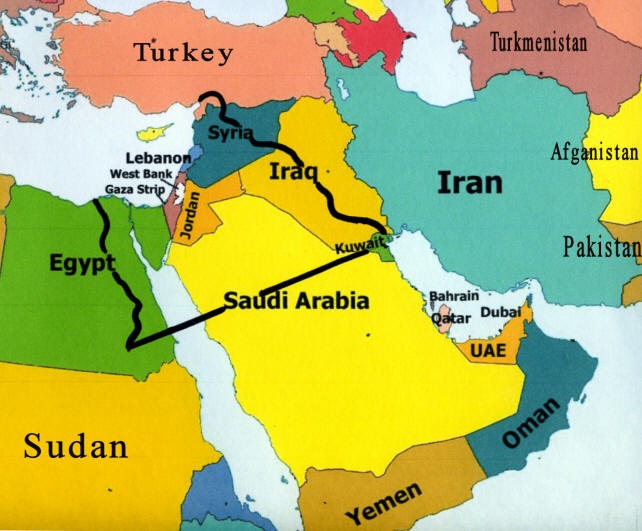
This command has yet to be fulfilled.
CHAPTER 14
Genesis 14:1-24
Gen 14:1 And was in the days of Amraphel, King of Shinar, Arioch, King of Ellasar, Chedorlaomer, King of Elam, and Tidal, King of Nations; 2 They did (made) war at ta-Bera, King of Sodom, and ta-Birsha, King of Amorrah, Shinab, King of Admah, and Shemeber, King of Zeboiim, and the king of Bela, she is Zoar. 3 All these, they joined to the deep valley of the Siddim, he is the Salt Sea. 4 Two ten (Twoteen, Twelve) years they served ta-Chedorlaomer, and three ten (threeteen, thirteen) year they rebelled. 5 And in the four ten (fourteen) year came Chedorlaomer and the kings which were with him, and they struck ta-the Rephaim in Ashteroth Karnaim, and ta-the Zuzim in Ham, and the ta-Emim in Shaveh Kiriathaim, 6 And ta-the Horites in their Mount Seir, unto the Oak of Paran [(Eyl Paran)], which is upon the wilderness. 7 And they returned, and they came to Eyn Mishpat, she is Kadesh, and they struck ta-all of the field area of the Amalekites, and also ta-the Amorites that were dwelling in Hazezon Tamar.
8 And went out the king of Sodom, and the king of Amorrah, and the king of Admah, and the king of Zeboiim, and the king of Bela, she is Zoar; and they prepared (arranged) war with them in the deep valley of the Siddim; 9 ta-Chedorlaomer, King of Elam, and Tidal, King of Nations, and Amraphel, King of Shinar, and Arioch, King of Ellasar; four kings, at ta-the five. 10 And the deep valley of the Siddim had bore-pits, bore-pits of slime; and the kings of Sodom and the Amorrah, they fled, and they fell there; and the ones remaining, they fled to the mountain. 11 And they took ta-all of the goods (substance, property) of Sodom and the Amorrah, and ta-all of their food, and they went away, 12 and they took ta-Lot, son of the brother of Abram, and ta-his goods (substance, property), and they went; and he was dwelling in Sodom.
13 And the escaped one came and told to Abram, the Hebrew; and he was tabernacling among the Oaks of Mamre, the Amorite, brother of Eshcol and the brother of Aner: and they were masters of a covenant with Abram. 14 And Abram heard for his brother was captured, and drew out (poured out) ta-his trained ones (practiced ones) birthed of his household of eight ten (eighteen) and three hundred, and treaded down (pursued, chased) unto Dan, 15 and he divided upon them, he and his servants at night, and struck them, and treaded down (pursued, chased) unto Hobah, which is from the small (left) of Damascus. 16 And returned ta-all of the goods (substance, property), and also returned his brother, ta-Lot, and his goods (substance, property), and also ta-the women, and ta-the people. 17 And the king of Sodom went out to meet (encounter) him after his return from striking ta-Chedorlaomer and ta-the kings which were with him to the deep valley of Shaveh, he is the deep valley of the king.
18 And Melki Tsedek, King of Salem, brought out bread and the wine: and he was the Priest to El Elyon. 19 And blessed him, and said, Blessed be Abram by El Elyon, Possessor (Erector) of the Heavens and the Earth: 20 and blessed be El Elyon which had shielded off (delivered) your enemies in your hand. And gave to him tithes (ten, a tenth) from all.
21 And the king of Sodom said to Abram, Give the souls to me, and take the goods (substances, property) for yourself. 22 And Abram said to the king of Sodom, I have raised my hand to hwhy El Elyon, Possessor (Erector) of the Heavens and the Earth, 23 but from a cord (line) and unto a lace (lachet) of a sandal, and but will I take from anything which belongs to you, and you shall not say, I, I have made ta-Abram rich: 24 Failing only which they, the young men have eaten, and the portion of the men which they went with me, Aner, Eshcol, and Mamre; of them, they shall take their portion.
(NOTE: Not all verses will have comments)
Verse one
1 And was in the days of Amraphel, King of Shinar, Arioch, King of Ellasar, Chedorlaomer, King of Elam, and Tidal, King of Nations;
One of the kings was Amraphath, King of Shinar. Shinar was the same location where hwhy confounded the peoples' lips of speech and scattered throughout the lands which is noted in the Torah portion of Noakh, in the book of Genesis
Genesis 11:1 And all of the Earth was of one lip, and of one word (ones words, speech). 2 And was, in their journeying (pulling up) from the East, and they found a cleaved valley (wide level valley, plain valley) in the land of Shinar; and they dwelled there. 3 And they said a man to his neighbor, Come, we will white bricking white bricks, and we will burn for burning. And the white brick, she was to them for stone, and slime (bitumen) was to them for morter. 4 And they said, Come, we will build for us a city and a tower (great thing), and his head shall be in the Heavens; and we shall do (make) for ourselves a name, lest we become spread out (migrated, scattered) upon the face of all of the Earth. 5 And hwhy descended (came down) to see ta-the city and ta-the tower (great thing), which the sons of the Adam, they are building. 6 And hwhy said, Behold, people are one, and her lip is one to all of them, and this they are beginning (profaning) to do: and now they shall not be restrained (clipped off) of all that they purpose (plan, imaginate) to do. 7 Come, We will descend (go down), and We will confound (mingle, mix) there their lips, that they may not comprehend (hear) a man a lip of his neighbor. 8 And hwhy spread out (migrated, scattered) them from there upon (over) the face of all of the Earth: and they made idle (forsake) to build the city. 9 Upon thus was called her name Babel; for there hwhy confound (mingled, mixed) the lips of all of the Earth: and from there did hwhy spread them out [(migrated them, scattered them)] upon (over) the face of all of the Earth.
Amraphath was most likely a descendant of Nimrod who led the role of building Babylon.
Looking at their names and their definitions:
Amraphel (In Hebrew "Ahm-rah-phehl" (lprma) (S569)): Unknown (could be based from S559 "ah-mahr" (rma): To say, appoint, boast, call, charge, demand, require, speak, utter + S6419 "pah-lahl" (llp) and S6414 "pah-leel" (lylp): Judge, intercede, pray, intreat, make supplication or S6395 "pah-lah" (hlp): Distinguish, separate, set apart, sever or S6381 "pah-lah" (alp): separate, distinguish, difficult, accomplish, miracles, perform, wonderful acts, wondrous works = Utter with difficulty)
Shinar (In Hebrew "Sheen-ahr" (rens) (S8152)): Unknown (probably from S8149 "sh'neer" (ryns): Be pointed, peak)
Arioch (In Hebrew "Ahr-yokh" (Kwyra) (S746)): Unknown (could be from S748 "ah-rakh" (Kra): Long, draw out, lengthen, tarry = meaning that his birth could have tarried)
Ellasar (In Hebrew "Ehl-lah-sahr" (rola) (S495)): Unknown (could be based from S352 "ah-yeel" (lya) or "eyl" (la): strength, strong, power, oak or S421 "ah-lah" (hla): Bewail, lament or S422 "ah-lah" (hla): adjure, curse, swear + S631 "ah-sahr" (roa): Yoke, hitch, fasten, bind, gird, hold, prepare, prison, tie = Strong yoke)
Chedorlaomer (In Hebrew "K'dahr-lah-oh-mehr" (rmelrdk) (S3315)): Unknown (could be based from S6937 "kah-dahr" (rdq): ashly, dark colored, mourn, blackish, dark + S3930 "loh-ah" (el): gullet, throat, gulp, swallow, rash + S6014 "ah-mahr" (rme): heap, gather grain, bind sheaves)
Elam (In Hebrew "Ey-lahm" (Mlye) (S5867)): Hidden, distant, veil, concealed, blind, secret
Tidal (In Hebrew "Thee-dahl" (ledt) (S8413)): Fearfulness, slink, to fear, be formidable, make afraid, dreadful, terrible
Nations (In Hebrew "Goh-yeem" (Mywg) (S1471)): Heathens, nations, peoples, troops, backs, bodies
Verse two
2 They did (made) war at ta-Bera, King of Sodom, and ta-Birsha, King of Amorrah, Shinab, King of Admah, and Shemeber, King of Zeboiim, and the king of Bela, she is Zoar.
Looking at their names and their definitions:
Bera (In Hebrew "Beh-rah" (erb) (S1298)): Unknown S1254 "bah-rah" (arb): Create, cut down, feed, make fat or S1274 "b'ree" (yrb): Fat, feed or S1305 "bah-rahr" (rrb): Clarify, choose, choice, pure, purge out, polished)
Sodom (In Hebrew "S'dohm" (Mdo) (S5467)): Scorch, burnt, volcanic, bituminous
Birsha (In Hebrew "Beer-shah" (esrb) (S3315)): Wickedness, iniquity, wrong, wicked
Gomorrah (In Hebrew "Ah-moh-rah" (hrme) (S6017)): (Ruined) heap, heap, chastise, gather (grain), bind sheaves, make merchandise of
Shinab (In Hebrew "Sheen-ahv" (bans) (S8134 [8132 + 1])): Father has turned, (father altered, father changed)
Admah (In Hebrew "Ahd-mah" (hmda) (S126)): Earthy, soil, country, ground
Shemeber (In Hebrew "Shahm-ah-vehr" (rbams) (S8038 [8034 + 83])): Name of pinion, name of illustriousness (name of wing, name of soaring)
Zeboiim (In Hebrew "Ts''voh-yeem" (Myybu) (S6636)): Gazelles, splendor, beautiful, pleasant, roes, roebucks
Bela (In Hebrew "Beh-lah" (elb) (S1106)): Gulp, destruction, devouring, make away with, destroy, cover, swallowing down, swallowing up, spend up
Zoar (In Hebrew "Yah-pheth" (reu) (S6820)): Little, small, ignoble
Verse three
3 All these, they joined to the deep valley of the Siddim, he is the Salt Sea.
Looking at their names and their definitions:
Valley (In Hebrew "Ah-mehk" (qme) (S6010)): Vale, dale, valley
Siddim (In Hebrew "See-deem" (Myds) (S7708)): Flats, field
Putting the definitions of the words together:
"Valley of the flats"
Verses four through seven
4 Two ten (Twoteen, Twelve) years they served ta-Chedorlaomer, and three ten (threeteen, thirteen) year they rebelled. 5 And in the four ten (fourteen) year came Chedorlaomer and the kings which were with him, and they struck ta-the Rephaim in Ashteroth Karnaim, and ta-the Zuzim in Ham, and the ta-Emim in Shaveh Kiriathaim, 6 And ta-the Horites in their Mount Seir, unto the Oak of Paran [(Eyl Paran)], which is upon the wilderness. 7 And they returned, and they came to Eyn Mishpat, she is Kadesh, and they struck ta-all of the field area of the Amalekites, and also ta-the Amorites that were dwelling in Hazezon Tamar.
Looking at their names and their definitions:
Rephaim (In Hebrew "R'phah-eem" (Myapr) (S7497)): Giant, invigorating, mend, cure, heal, physician, repair, make whole
Ashteroth Karnaim (In Hebrew "Ash-t'roth Kahr-nah-yeem" (Mynrq trtse) (S6255 [6252 + 7161])): Ashtaroth of double horns, (fertility goddess of double horns, [flock of double horns])
Zuzim (In Hebrew "Zoo-zeem" (Myzwz) (S2104)): Prominent, conspicious, fulness of the breast, creature, wild beast, abundance
Ham (In Hebrew "Khahm" (Mx) (S2526)): Hot, warm
Emim (In Hebrew "Ey-meem" (Mymya) (S368)): Terrors, tribe, frights, dreads, horrors, idols
Shaveh Kiriathaim (In Hebrew "Shah-vey Keer-yah-thah-yeem" (Mytyrq hws) (S7741 [7740 + 7151])): Plain of a double city
Horites (In Hebrew "Khoh-ree" (yrx) (S2712)): Cave dweller, troglodyte
Seir (In Hebrew "S'eer" (ryes) (S8165)): Rough, he goat, faun, devil, kid, satyr
Eyl Paran (In Hebrew "Eyl Pah-rahn" (Nrap lya) (S364 [352 + 6290])): Oak of Paran (strong ornaments, strength of ornaments, strength of beauty)
Eyn Mishpat (In Hebrew "Eyn Meesh-paht" (jpsm Nye) (S5880 [5869 + 4941])): Eye-fountain of judgment
Kadesh (In Hebrew "Kah-deysh" (sdq) (S6946)): Sanctuary, sacred, devotee, sodomite
Amalekites (In Hebrew "Ah-mah-ley-kee" (yqlme) (S6003)): Unknown (could be based from S6001 "ah-mahl" (lme): Toiling, laborer, wicked, workman + S4454 "mah-lahk" (qlm): crack a [body] joint, wring the neck, wring off or S3922 "lah-khah" (hkl): journey = Toiling journey)
Amorites (In Hebrew "Eh-moh-ree" (yrma) (S567)): Demand, call, clarify, charge
Hazezon Tamar (In Hebrew "Khah-ts'tsohn Tah-mahr" (rmt Nuux) (S2688 [2686 + 8558])): Division of the palm tree
Verse thirteen
13 And the escaped one came and told to Abram, the Hebrew; and he was tabernacling among the Oaks of Mamre, the Amorite, brother of Eshcol and the brother of Aner: and they were masters of a covenant with Abram.
Looking at their names and their definitions:
Mamre (In Hebrew "Mahm-rey" (armm) (S4471)): Lusty, whipped, rebel, lash
Amorites (In Hebrew "Mahm-rey" (yrma) (S812)): Bunch of grapes, cluster, bunch, lump, testicle
Aner (In Hebrew "Ah-neyr" (rne) (S6063)): Young boy, boy, child
Putting the definitions of the words together it states a phrase:
"One who whipped the testicle of a young boy" or "A rebel with the testacle like a young boy"
It doesn't say what the covenant was, but based on their journey together to battle the kings, it was most likely a brotherhood type covenant that Abram's brothers are Mamre's brothers, and vice versa, and Abram's enemies are Mamre's enemies, and vice versa. And if something happens to Abram's brothers, Mamre and his brothers will join him, and vice versa. It was manifested later in this chapter, where Eschol was noted in his participation with Abram to save Lot and his family
24 Failing only which they, the young men have eaten, and the portion of the men which they went with me, Aner, Eshcol, and Mamre; of them, they shall take their portion.
This account reveals that Mamre was alive during the time of Abram.
Looking at the word HEBEREW
The Hebrew word for Hebrew is "Ee-vree"- Ayin, Bet, Resh, Yod (yrbe). It is from Strong's Concordance number 5680, and its definition
Patronymic from H5677; an Eberite (that is, Hebrew) or descendant of Eber: - Hebrew (-ess, woman).
In other words, Abram was surnamed "the Crossed Over One", because he "crossed over" from Haran- the land of his family, to Canaan- the land of promise. Abram was NOT a Jew. The term "Jews" was not coined until the Southern House of Judah's returned from the Babylonian captivity about 516 BC. In order for Abram/Abraham to be a Jew, he would have been a descendant of the two tribes of the Southern House of Judah, one of the tribe of Judah or of the tribe of Benjamin.
Verses fourteen through sixteen
14 And Abram heard for his brother was captured, and drew out (poured out) ta-his trained ones (practiced ones) birthed of his household of eight ten (eighteen) and three hundred, and treaded down (pursued, chased) unto Dan, 15 and he divided upon them, he and his servants at night, and struck them, and treaded down (pursued, chased) unto Hobah, which is from the small (left) of Damascus. 16 And returned ta-all of the goods (substance, property), and also returned his brother, ta-Lot, and his goods (substance, property), and also ta-the women, and ta-the people.
Dan (In Hebrew "Dahn" (Nd) (S1835)): Judge
Hobah (In Hebrew "Khoh-vah" (hbx) (S2327)): Hiding place, secret
Damascus (In Hebrew "Dah-mah-sehk" (qsmd) (S1834)): Unknown (could be based on S1820 "dah-mah" (hmd) or S1826 "dah-mahm" (Mmd): Dumb, silent, perish, destroy or S1830 "dah-mah" (emd): weep or S1831 "deh-mah" (emd): Tear, juice, liquor + S5564 "sah-makh" (Kmo): To prop, lean upon, take hold, bear up, establish, lean, stay, hold or S8055 "sah-makh" (xms): Brighten up, glad, joyful, merry, rejoice)
Abram had 318 of his male servants join him for battle, and they were trained fighters. That is impressive of having that information that Abram had a "little army" with good intentions to protect him, his people and his goods. Based on this account, we can suspect that there were at the most of 1,000 personel occupying Abram's household, including the mens' wives and children, but guaranteed to have between 600 and 700 souls. That was one huge camp.
This is the earliest Biblical account where an actual battle took place.
Verses eighteen through twenty
18 And Melki Tsedek, King of Salem, brought out bread and the wine: and he was the Priest to El Elyon. 19 And blessed him, and said, Blessed be Abram by El Elyon, Possessor (Erector) of the Heavens and the Earth: 20 and blessed be El Elyon which had shielded off (delivered) your enemies in your hand. And gave to him tithes (ten, a tenth) from all.
The Melki-Tsedek comes to Abram, and they made a covenant together with bread and wine. I heard teachers say that the Melki-Tsedek is Seth, Abram's ancestor. With due respect to my Brethren, I have to disagree, and the book of Hebrews comes to my defense. This is what it says regarding the Melki-Tsedek which the apostle Paul noted in the book of Hebrews
Hebrews 7:1 For this Melkhi-Tsedek, King of Salem, Priest of El Elyon, who met Abraham returning from the slaughter of the kings, and blessed him; 2 To whom also Abraham gave a tenth part of all; first being by interpretation King of Righteousness, and after that also King of Salem, which is, King of Peace; 3 Without father, without mother, without descent, having neither beginning of days, nor end of life; but made like unto the Son of Elohim; abideth a priest continually. 4 Now consider how great this man was, unto whom even the patriarch Abraham gave the tenth of the spoils.
That means any ancestors of Abram, including Shem, were disqualified to be called Malki-Tsedek, because he was human. We know that there will be one coming in the order of Melki-Tsedek which is noted in the book of the Pslams
Psalms 110:1 A Psalm of David. hwhy said unto my Lord, Sit thou at My Right Hand, until I make thine enemies thy footstool. 2 hwhy shall send the Rod of thy strength out of Zion: rule thou in the midst of thine enemies. 3 Thy People shall be willing in the day of thy power, in the beauties of holiness from the womb of the morning: thou hast the dew of thy youth. 4 hwhy hath sworn, and will not repent, Thou art a Priest for ever after the order of Melki-Tsedek.
This is Yeshua which the apostle Paul noted in the book of Hebrews
Hebrews 5:5 So also Messiah glorified not Himself to be made an High Priest; but He that said unto Him, Thou art My Son, to day have I begotten Thee. 6 As He saith also in another place, Thou art a Priest for ever after the order of Melki-Tsedek. 7 Who in the days of His Flesh, when He had offered up prayers and supplications with strong crying and tears unto Him that was able to save Him from death, and was heard in that He feared; 8 Though He were a Son, yet learned He obedience by the things which He suffered; 9 And being made perfect, He became the Author of eternal salvation unto all them that obey Him; 10 called of hwhy an High Priest after the order of Melki-Tsedek.
Yeshua could have also did what the Melki-Tsedek did with Abram which is noted in the Gospel of Matthew
Matthew 26:26 And as they were eating, Yeshua took bread, and blessed it, and brake it, and gave it to the disciples, and said, Take, eat; this is My Body. 27 And He took the cup, and gave thanks, and gave it to them, saying, Drink ye all of it; 28 For this is My Blood of the New Covenant, which is shed for many for the remission of sins. 29 But I say unto you, I will not drink henceforth of this fruit of the vine, until that day when I drink it new with you in My Father's Kingdom.
When Abram partook of the bread and wine with Melki-Tsedek, he was partaking Yeshua's body and blood back then. Yeshua manifested this as the disciples partook of His Body and Blood via the bread and wine as well.
Abram gave a tithe of all to Melki-Tsedek. This was the beginning the tithe that would pass down for generations, and it was early as during the time of Jacob in his account at Beth El when noted earlier that he fell asleep. Angels came up and down the ladder. This is what Jacob said when he woke up, located in the Torah portion of Vay-yeytsey, in the book of Genesis
Genesis 28:16 And Jacob awoke from his sleep, and said, Surely, hwhy exists in this place; and I, I did not know, 17 and was afraid, and said, How revering (aweing, fearing) is this place! This is nothing for but the House of Elohim, and this is the Gate of the Heavens. 18 And Jacob arose early (started up) in the breaking period (morning), and took ta-the stone which was put with his head, and set her of a pillar, and poured oil upon her head. 19 And called ta-the name of that place, Beth El: However, the name of the city was Luz to the first.
20 And Jacob vowed a vow, to say, If Elohim will be with me, and will keep me in this way that I am walking, and will give to me bread to eat, and garment to clothe, 21 and I return to the house of my father in peace; and hwhy shall be to me for Elohim: 22 And this stone which I have set of a pillar shall be the House of Elohim: and I will tithe a tenth to You of all which You shall give to me.
How this tithe applies to this day is not concrete like it used to be, by tithing to the Priests in Israel, including Jerusalem. Alan Horvath of AlanHorvath.com noted in one of his teachings that the tithe only refers to giving food to Priests. We can include the fatherless, the poor and the widow. Tithing today has mostly been given to congregations and ministries.
Verse twenty-one
21 And the king of Sodom said to Abram, Give the souls to me, and take the goods (substances, property) for yourself.
I have no doubt the king wanted the men for the purpose to do vile "sodomic" acts upon them. That would be Sodom's spoils. Also notice that the word "yourself" is in bold pink. That refers to Abram's "soul" meaning that the king of Sodom was talking to Abram's soul when he told him to take the goods. This continues in the next Torah portion passage.
Verses twenty two and twenty three
22 And Abram said to the king of Sodom, I have raised my hand to hwhy El Elyon, Possessor (Erector) of the Heavens and the Earth, 23 but from a cord (line) and unto a lace (lachet) of a sandal, and but will I take from anything which belongs to you, and you shall not say, I, I have made ta-Abram rich:
This makes me think a lot about Powerball, contests, etc. That if one wins that they give thanks to those organizations for their gifts. To me that is wrong, and should not be involved with these programs. One should follow the role of Abram that they should not touch the rewards of this earth. In other words, one should not get gain for publicity. It should be a "private" matter between us and hwhy. An example of this is noted in the beginning of the next chapter of this week's Torah portion
Genesis 15:1 After these words was the Word of hwhy to Abram in the vision, to say, Do you not fear Abram: I am a Shield to you. Your reward will multiply (increase) much.
Also, in regards to the "soul" as noted in the previous Torah portion passage, this was an approach to Abram's soul when the king of Sodom was telling him to take the goods. But Abram refused and told the king of Sodom to take his belongings back towards "his soul", meaning the king's soul. If one does not know by now, the soul if "female", and is the type of the Bride of Messiah. In regards to the goods, this is what Yeshua noted in the Gospel of Matthew
Matthew 6:19 Lay not up for yourselves treasures upon Earth, where moth and rust doth corrupt, and where thieves break through and steal:20 But lay up for yourselves treasures in Heaven, where neither moth nor rust doth corrupt, and where thieves do not break through nor steal:
The examples of the Treasures in Heaven is noted by the apostle Paul noted, which is noted in his letter to the assembly in Colossia
Colossians 2:1 For I would that ye knew what great conflict I have for you, and for them at Laodicea, and for as many as have not seen my face in the flesh; 2 That their hearts might be comforted, being knit together in love, and unto all riches of the full assurance of understanding, to the acknowledgement of the Mystery of hwhy, and of the Father, and of Messiah; 3 In Whom are hid all the treasures of wisdom and knowledge.
CHAPTER 15
Genesis 15:1-21
Gen 15:1 After these words was the Word of hwhy to Abram in the vision, to say, Do you not fear Abram: I am a Shield to you. Your reward will multiply (increase) much. 2 And Abram said, Adonai hwhy, what will you give to me? And I am going childless, and a son of a steward [(a son of Meshec)] is of my house, he is Eliezer of Damascus. 3 And Abram said, Behold, to me you have not given her seed: and behold, a son of my house shall be heir (possessor) of me. 4 And, behold, the Word of hwhy came to him, to say, This shall not be your heir (possessor); for but which shall come out from your bowels, he shall be your heir (possessor). 5 And brought him out to the outside, and said, Scan now to the Heavens, and enumerate (scroll, number) the stars, if you be able to enumerate (scroll, number) them: and said to him, So shall be your seed. 6 And believed in hwhy; and was reckoned (regarded) to him for righteousness. 7 And said to him, I am hwhy which brought you out from Ur of the Casdim, to give to you ta-this land to possess (occupy) her. 8 And said, Adonai hwhy, on what shall I know that I shall possess (occupy) her? 9 And said to him, Take for Me a female calf from three years, and a she goat from three years, and a ram from three years, and a turtledove, and a nestling.
10 And took for himself ta-all of these, and chopped (divided) them in the midst, and laid a man of his part by the meeting (encountering, opposite) of his neighbor: and ta-the birds were not chopped (divided). 11 And descended (came down) birds of prey upon the faintish carcases, and Abram dispersed them away. 12 And was at the sun to go down, and a deep sleep (trance, stupor) fell upon Abram; and, behold, a fright (terror) of great darkness fell upon him. 13 And said to Abram, Knowing, you shall know for your seed shall be a sojourner (stranger) in a land not belonging to them, and shall serve them; and they shall afflict them four hundred years; 14 And also ta-the nation, which they shall serve will I judge: and after thus, shall they come out among a great substance (goods, property). 15 And you, you shall go to your fathers in peace; you shall be buried in good (well) satisfaction. 16 And the fourth generation, they shall return here: for the iniquity of the Amorites was not repaid (paid back, complete, whole) until now.
17 And was, the sun had gone down, and was dusk (twilight), and behold, a smoking fire pot (furnace) and a fiery torch which went over between those pieces (parts). 18 In that day hwhy cut ta-Abram a Covenant, to say, To your seed I have given ta-this land from the river of Egypt unto the great river, the river Euphrates: 19 ta-the Kenites, and ta-the Kenizzites, and ta the Kadmonites, 20 And ta-the Hittites, and ta-the Perizzites, and ta-the Rephaim, 21 And ta-the Amorites, and ta-the Canaanites, and ta-the Girgashites, and ta-the Jebusites.
(NOTE: Not all verses will have comments)
Verses one through three
1 After these words was the Word of hwhy to Abram in the vision, to say, Do you not fear Abram: I am a Shield to you. Your reward will multiply (increase) much. 2 And Abram said, Adonai hwhy, what will you give to me? And I am going childless, and a son of a steward [(a son of Meshec)] is of my house, he is Eliezer of Damascus. 3 And Abram said, Behold, to me you have not given her seed: and behold, a son of my house shall be heir (possessor) of me.
Before hwhy gave him the promise, Abram had already adapted Eliezer of Damascus to be his heir. He is recognized and commonly accepted by the Hebraic Roots/Messianic brethren, as well as the Jews, as the head servant of Abraham to go find a wife for Isaac. hwhy was giving the promise to Abram that he will have an heir from his own loins. Also, hwhy did not want Eliezer to be his heir. Damascus is in modern day Syria. It was occupied by the Arameans during Abram's time. Eliezer was an Aramite. Though Eliezer was a relative to Abram, a descendant of Shem, hwhy did not want an Aramite to be Abram's heir. Based on the genealogy, Eliezer was not a descendant of Eber. If Abram was called the Hebrew in chapter fourteen, what would Eliezer be called, an Aramite, an adopted son of Abram? He would not have been called a Hebrew.
Looking at the word HEBREW
The Hebrew word for Hebrew is "Ee-vree"- Ayin, Bet, Resh, Yod (yrbe). It is from Strong's Concordance number 5680, and its definition
Patronymic from H5677; an Eberite (that is, Hebrew) or descendant of Eber: - Hebrew (-ess, woman).
In other words, Abram was surnamed "The Crossed Over One", because he "crossed over" from Haran- the land of his family, to Canaan- the land of promise. Abram was NOT a Jew. The term "Jews" was not coined until the Southern House of Judah's return from the Babylonian captivity about 516 BC. In order for Abram/Abraham to be a Jew, he would have been a descendant of the two tribes of the Southern House of Judah, of the tribe of Judah or of the tribe of Benjamin. Abram was "the Hebrew" or "the Crossed Over One" wheras Eliezer was not. It would not make sense for Eliezer to be the next person in Abram's line to be the heir.
Notice that hwhy told Abram in verse one of this week's Torah portion passage that He is a Shield to "you" in the feminie. That means hwhy is a Shield to Abram's "soul", which the soul in general is feminine.
Verses four through seven
4 And, behold, the Word of hwhy came to him, to say, This shall not be your heir (possessor); for but which shall come out from your bowels, he shall be your heir (possessor). 5 And brought him out to the outside, and said, Scan now to the Heavens, and enumerate (scroll, number) the stars, if you be able to enumerate (scroll, number) them: and said to him, So shall be your seed. 6 And believed in hwhy; and was reckoned (regarded) to him for righteousness. 7 And said to him, I am hwhy which brought you out from Ur of the Casdim, to give to you ta-this land to possess (occupy) her.
This was the same blessing that hwhy told Jacob at Beth El in the Torah portion of Vay-yeytsey, in the book of Genesis
Genesis 28:10 And Jacob went out from Beer Sheba, and walked to Haran. 11 And was entreated on the place, and stayed (tarried) there, for the sun was going; and took from the stones of the place, and were put with his head, and laid down in that place. 12 And calm-dreamed, and behold, a ladder was standing at the Earth, and his head reached to the Heavens: and behold the Messengers of Elohim were ascending and descending on him. 13 And behold, hwhy stood upon him, and said, I am hwhy, Elohim of Abraham, your father, and the Elohim of Isaac: The land which you are laying upon her will I give her to you and to your seed; 14 And your seed shall be as the dust of the Earth, and you shall spread to the sea (west), and to the east, and to the hidden (north), and to the negev (south): and in you and in your seed of all the families of the Earth, they shall be blessed.
It uses the dust instead of the stars, which symbolizes the natural seed.
The key in this Torah portion passage of believing is noted in the apostle Paul's letter to the assembly in Galatia
Galatians 3:2 This only would I learn of you, Received ye the Spirit by the works of the Torah, or by the hearing of faith? 3 Are ye so foolish? Having begun in the Spirit, are ye now made perfect by the flesh? 4 Have ye suffered so many things in vain? If it be yet in vain. 5 He therefore that ministereth to you the Spirit, and worketh miracles among you, doeth He it by the works of the Torah, or by the hearing of faith? 6 Even as Abraham believed hwhy, and it was accounted to him for righteousness.
This Torah portion passage also connects with hwhy bringing out the Israelites from the land of Egypt and sent them to Mount Sinai where the foundation to the First Word (Commandment) was spoken to in the Torah portion of Yithro, in the book of Exodus
Exodus 20:2 I am hwhy, your Elohim, which brought you out from the land of Egypt, from the house of bondage (slavery).
I will explain this later in this week's Torah portion.
This is what it known as "THE FAITH WORD (COMMANDMENT)". It is a prerequisite word (commandment) to the other nine words (commandments). In order to have faith, one has to "hear" the word. Monte Judah of Lion and Lamb Ministries revealed to me that the purpose of this commandment is to "believe", and hwhy was saying to "believe in Me". In my addition, this, this Faith Word (Commandment), is in two parts:
I am hwhy, your Elohim,...
This is to believe who He says He is.
...who brought you out from the land of Egypt, from the house of slavery. (bondage)
Based on Monte Judah's premise, what this second part, hwhy was saying to us, is "Believe in what I did for you". Thank you Monte.
Verses eight and nine
8 And said, Adonai hwhy, on what shall I know that I shall possess (occupy) her? 9 And said to him, Take for Me a female calf from three years, and a she goat from three years, and a ram from three years, and a turtledove, and a nestling.
There was another instance of keeping away the birds of prey from the carcasses in 2nd Samuel. This is the account leading to it
2 Samuel 21:1 Then there was a famine in the days of David three years, year after year; and David enquired ta-the Face of hwhy. And hwhy answered, It is for Saul, and for his bloody house, because he slew ta-the Gibeonites. 2 And the king called the Gibeonites, and said unto them; (now the Gibeonites were not of the Sons of Israel, but of the remnant of the Amorites; and the Sons of Israel had sworn unto them: and Saul sought to slay them in his zeal to the Sons of Israel and Judah.) 3 Wherefore David said unto the Gibeonites, What shall I do for you? and wherewith shall I make the atonement, that ye may bless ta-the Inheritance of hwhy? 4 And the Gibeonites said unto him, We will have no silver nor gold of Saul, nor of his house; neither for us shalt thou kill any man in Israel. And he said, What ye shall say, that will I do for you. 5 And they answered the king, The man that consumed us, and that devised against us that we should be destroyed from remaining in any of the coasts of Israel, 6 Let seven men of his sons be delivered unto us, and we will hang them up unto hwhy in Gibeah of Saul, whom hwhy did choose. And the king said, I will give them. 7 But the king spared Mephibosheth, the son of Jonathan the son of Saul, because of hwhy's Oath that was between them, between David and Jonathan the son of Saul. 8 But the king took ta-the two sons of Rizpah the daughter of Aiah, whom she bare unto Saul, ta-Armoni and ta-Mephibosheth; and ta-the five sons of Michal the daughter of Saul, whom she brought up for Adriel the son of Barzillai the Meholathite: 9 And he delivered them into the hands of the Gibeonites, and they hanged them in the hill to the Face of hwhy: and they fell all seven together, and were put to death in the days of harvest, in the first days, in the beginning of barley harvest. 10 And Rizpah the daughter of Aiah took ta-sackcloth, and spread it for her upon the rock, from the beginning of harvest until water dropped upon them out of heaven, and suffered neither the birds of the air to rest on them by day, nor ta-the beasts of the field by night.
Rizpah did a similar thing that Abram did by keeping the birds and the beasts away from the dead carcasses of his sons.
In a different approach, if one makes an offering to hwhy, one has to keep the birds, i.e. the world, from taking away our offerings to Him.
Verse ten
10 And took for himself ta-all of these, and chopped (divided) them in the midst, and laid a man of his part by the meeting (encountering, opposite) of his neighbor: and ta-the birds were not chopped (divided).
This is an act of a covenant, which is the Hebrew word breeth- Bet, Resh, Yod, Tav (tyrb). The root of this word means "to cut". Dave Stotts of the the Biblical program series Drive Thru History noted that the Hebrew word meaning to cut is an act of cutting an animal to make a covenant. This is what Abram did in the Torah portion passage by "dividing", or "cutting" them and separating them between each other in the midst of the ground.
Notice that that the translation "man" is noted, because the Hebrew word here is "ish", which is commonly translated as "man". Why was the Hebrew word ish applied in this week's Torah portion passage relating to the parts? Maybe it's a reference to "the Man", who is Yeshua the Messiah.
!!! hwhy Kl dbk
Verse eleven
11 And descended (came down) birds of prey upon the faintish carcases, and Abram dispersed them away.
The birds of prey were symbolized by HaSatan and his demons trying to steal the covenant requirements away from Abram, so that the covenant between he and hwhy would not be fulfilled. This is based from Yeshua's statement which is noted in the Gospel of John
John 10:10 The thief cometh not, but for to steal, and to kill, and to destroy: I am come that they might have life, and that they might have it more abundantly.
Verse twelve
12 And was at the sun to go down, and a deep sleep (trance, stupor) fell upon Abram; and, behold, a fright (terror) of great darkness fell upon him.
hwhy put Abram into a deep sleep. This is the same deep sleep hwhy put on Adam to create for him a counterpart which is noted in the Torah portion of B'reyshith, in the book of Genesis
Genesis 2:21 And hwhy Elohim had fallen a deep sleep (stupor sleep) upon the Adam, and slept, And took one of his ribs, and closed up (enclosed) the flesh undeneath her.
Verses thirteen through sixteen
13 And said to Abram, Knowing, you shall know for your seed shall be a sojourner (stranger) in a land not belonging to them, and shall serve them; and they shall afflict them four hundred years; 14 And also ta-the nation, which they shall serve will I judge: and after thus, shall they come out among a great substance (goods, property). 15 And you, you shall go to your fathers in peace; you shall be buried in good (well) satisfaction. 16 And the fourth generation, they shall return here: for the iniquity of the Amorites was not repaid (paid back, complete, whole) until now.
How would one like to have been told of their future and the future accounts of their descendants?
The question is "Who is 'the fourth generation' hwhy noted to Abram"? It would be the fourth generation of Abram's descendants that were in Egypt. In Genesis chapter fifty, Joseph saw his great-grandchildren, the third generation, born in Egypt. That means the fourth generation would be his great-great grandchildren. It also means that the descendants of the twelve sons of Jacob-Israel had to be born in Egypt unto the fourth generation before they were delivered from Egypt.
This is an example idea of the generations in relation to the fourth generation of the line of Levi:
Jacob: Born in Canaan
Levi: Born in Canaan
Jochebed: 1st generation (Kohath was born in Canaan)
Amram: 2nd generation
Moses: 3rd generation
Gershom: 4th generation (though he was not born in Egypt, it gives an idea that his cousins of his generation had been born in Egypt).
This should give an example that it had to be the fourth generation born in Egypt before they returned to Canaan.
Verse seventeen
17 And was, the sun had gone down, and was dusk (twilight), and behold, a smoking fire pot (furnace) and a fiery torch which went over between those pieces (parts).
Notice that Abram did not go through the pieces with hwhy to make the covenant, because if Abram did go through them, and then broke the covenant, he would have nullified the promise of hwhy to his descendants. In the cultures of the day, if someone broke the covenant, they would have been potentially killed by cutting them like the animals were. In Abram's case, hwhy made that covenant with Himself. That way, the covenant would be eternal, because hwhy would not break His own covenant.
If one thinks about it, it's possible that this was the Gospel message of salvation in which one side represents the Heavens, and the other side represents the Earth in which the smoking pot and the fiery torch both represented Yeshua? We'll find out.
Verses eighteen through twenty-one
18 In that day hwhy cut ta-Abram a Covenant, to say, To your seed I have given ta-this land from the river of Egypt unto the great river, the river Euphrates: 19 ta-the Kenites, and ta-the Kenizzites, and ta the Kadmonites, 20 And ta-the Hittites, and ta-the Perizzites, and ta-the Rephaim, 21 And ta-the Amorites, and ta-the Canaanites, and ta-the Girgashites, and ta-the Jebusites.
Looking at their names and their definitions:
Kenite (In Hebrew "Key-nee" (ynyq) (S7017)): Chant, fixity, lance, spear, wail, lament, mourning woman
Kenizzite (In Hebrew "K'nee-zee" (yznq) (S7074)): Hunt, hunter
Kadmonite (In Hebrew "Kahd-moh-nee" (ynmdq) (S6935)): Ancient, aboriginal, old, eastern
Hittite (In Hebrew "Kheet-tee" (ytx) (S2860)): Terror, postrate, break down, abolish, afraid, amaze, beat down, discourage
Perizzite (In Hebrew "P'ree-zee" (yzrp) (S6522)): Separate inhabitant of an open country
Rephaim (In Hebrew "R'phah-eem" (Myapr) (S7497)): Giant, invigorating, mend, cure, heal, physician, repair, make whole
Amorite (In Hebrew "Eh-moh-ree" (yrma) (S567)): demand, call, clarify, charge
Canaanite (In Hebrew "K'nah-ahn" (Nenk) (S3667)): Humiliation, vanquish, humble, subdue
Girgasite (In Hebrew "Geehr-gah-shee" (ysgrg) (S1622)): Unknown (most likely from S1616 "geer" (ryg): Stranger + S1487 "goosh" or "geesh" (swg or syg): Mass of earth, clod = strange earth, or strange clod)
Jebusite (In Hebrew "Y'voo-see" (yowby) (S2983)): Trodden, tread down, polluted
Putting them in a list form based on their characteristics, this is what they display:
Kenites: Wailers, lamenter
Kenizzites: Hunter
Kadmonites: Aboriginal (Primitive)
Hittite: Terror
Perizzites: Separater (Divider)
Rephaim: Giant
Amorites: Demander
Canaanites: Subduer
Girgashites: Mass Of Destructive Strangers
Jebusites: Polluter (Profaner)
All of these tribes have negative traits attached to their identities. The Israelites were to destroy each of these Canaanite tribes bearing these negativie characteristics. We as believers in the Messiah today have to deal with these spiritual negative charateristics in our spiritual lives, and we need to destroy them with the help of Yeshua, through the Ruakh HaKodesh (the Holy Spirit).
!!!hwhy Kl bdk
This would be fulfilled when Joshua, symbolic of Yeshua, would bring the Israelites into the land of Canaan and conquered the land as noted throughout the book of Joshua.
CHAPTER 16
Genesis 16:1-16
Gen 16:1 And Sarai, the woman (wife) of Abram, did not birth to him: and to her was an Egyptian female servant, and her name was Hagar. 2 And Sarai, she said to Abram, Behold now, hwhy has restrained (refrained, withheld) me from birthing: Go now to my female servant; Perhaps I can build from her. And Abram listened to the voice of Sarai. 3 And Sarai, the woman (wife) of Abram, she took ta-Hagar the Egyptianess, her female servant, from the end of ten years to the dwelling of Abram in the land of Canaan, and she gave her to Abram, her man, to him for a woman (wife).
4 And went to Hagar, and she conceived: and she saw for she had conceived, and her mistress (valiantess), she was despised in her eyes. 5 And she, Sarai, said to Abram, My wrong (injury, damage, fury) be upon you: I, I gave my female servant in your bosom; and she saw for she had conceived, and I was despised in her eyes: shall hwhy judge between me and between you. 6 And Abram said to Sarai, Behold, your female servant is in your hand; do to her that is good [(the goodness)] in your eyes. And Sarai, she dealt harshly (afflictingly), and she ran away (bolted away) from her face.
7 And the Messenger of hwhy found her upon an eye-well of the water in the wilderness, upon the eye-well on the way to Shur. 8 And said, Hagar, female servant of Sarai, whence from this did you come, and where are you going? And she said, I am running away (bolting away) from the face of Sarai, my mistress (valiantess). 9 And the Messenger of hwhy said to her, Return to your mistress (valiantess), and humble yourself under her hands. 10 And the Messenger of hwhy said to her, That multiplying, I will multiply ta-your seed, and shall not be enrolled (scrolled, numbered) with the multitude. 11 And the Messenger of hwhy said to her, Behold, you are pregnant (conceived), and you shall birth a son, and you shall call his name, Ishmael; for hwhy has heard to your affliction. 12 And he shall be a wild donkeyish (onagerish, wild fruit) Adam; his hand shall be against all, and the hand of all shall be against him; and shall tabernacle (abide, dwell) upon the face of all of his brothers. 13 And she called the Name of hwhy that spoke to her, You, El seeing me: for said of her, That also there I have looked after the seer of me. 14 Upon thus, was called to the well, Beer Lahai Roi; behold, is between Kadesh and between Bered. 15 And Hagar, she birthed to Abram a son: and Abram called the name of his son which Hagar birthed, Ishmael. 16 And Abram was a son of eighty years and six years in Hagar birthing ta-Ishmael to Abram.
(NOTE: Not all verses will have comments)
Verses one and two
1 And Sarai, the woman (wife) of Abram, did not birth to him: and to her was an Egyptian female servant, and her name was Hagar. 2 And Sarai, she said to Abram, Behold now, hwhy has restrained (refrained, withheld) me from birthing: Go now to my female servant; Perhaps I can build from her. And Abram listened to the voice of Sarai.
Was Sarai's voice the Voice of hwhy? No. It can be compared to Adam submitting to the voice of Khavah (Eve) which is noted in the Torah portion of B'reyshith, in the book of Genesis
Genesis 3:17 And said to the Adam, For you listened to the voice of your woman (wife), and you ate from the Tree, which I commanded you, to say, You shall not eat from him: cursed is the Ground on your transition (going over, account); you shall eat her in sorrow (worrisomeness, grief) all of the days of your life;
Abram bore the trait of his ancestor Adam, of listening to the wife instead of holding on to the promise of hwhy based on the intention that Abram and Sarai would have a son together.
As Bill Cloud from Shoreshim Ministries, and Brad Scott from Wildbranch Ministries said that history repeats, or recycles, itself. In this case here, Abram repeated, or recycled, the matter of hearkening unto his wife for the wrong means.
Looking at the word HAGAR
The Hebrew word for Hagar is "Hah-gahr"- Heh, Gimel, Resh (rgh). It is from Strong's Concordance number 1904, and its definition
Of uncertain (perhaps foreign) derivation; Hagar, the mother of Ishmael: - Hagar.
Though it doesn't say, but Hagar's name is also a play on the Hebrew word "ger" (rg). One can say that Hagar is known as "the stranger". When Sarah offered Abram her female servant, Hagar, to be a wife to him, she was giving him "the stranger". Going back in chapter fifteen of this week's Torah portion, it says
Genesis 15:4 And, behold, the Word of hwhy came to him, to say, This [Eliezer] shall not be your heir (possessor); for but which shall come out from your bowels, he shall be your heir (possessor).
Why hwhy didn't tell him that it will also come forth from Sarai as well, I do not know. But based on hwhy's words, Sarai thought she could help hwhy give Abram seed through Hagar, but in time, we will see that this would be like a thorn in their relationship and hwhy's promise.
Verse three
3 And Sarai, the woman (wife) of Abram, she took ta-Hagar the Egyptianess, her female servant, from the end of ten years to the dwelling of Abram in the land of Canaan, and she gave her to Abram, her man, to him for a woman (wife).
Simply, Abram was in the land of Canaan for ten years when he took Hagar for a wife, based on the time line of his journey from chapter twelve
Genesis 12:4 ...and Abram was a son of five years and seventy years in his going out from Haran,
This time line would make Abram eighty five years old in his marriage to Hagar during this account of Hagar.
Verses four through six
4 And went to Hagar, and she conceived: and she saw for she had conceived, and her mistress (valiantess), she was despised in her eyes. 5 And she, Sarai, said to Abram, My wrong (injury, damage, fury) be upon you: I, I gave my female servant in your bosom; and she saw for she had conceived, and I was despised in her eyes: shall hwhy judge between me and between you. 6 And Abram said to Sarai, Behold, your female servant is in your hand; do to her that is good [(the goodness)] in your eyes. And Sarai, she dealt harshly (afflictingly), and she ran away (bolted away) from her face.
Ladies and gentlemen, let me introduce to you the first person accounted in the bible to politically side step his responsibilities and the matter: Abram. In many words, Abram was saying to his wife, "It is not my responsibility, but "YOUR" responsibility". Abram was kind of saying to Sarai "She is not my wife, but she is "YOUR" female servant". Kind of like what Adam said to hwhy in the Torah portion of B'reyshith, in the book of Genesis
Genesis 3:12 And the Adam said, The woman whom You gave with me, she gave her to me from the tree, and I ate.
"...the WOMAN whom "YOU" gave..." No taking responsibility on Adam's part. Also, there is a famous argument in the Torah between Moses and between hwhy which is noted in the Torah portion of Ki Thisa, in the book of Exodus
Exodus 32:7 And hwhy spoke to Moses, Go, descend (go down); for your People whom you ascended from the land of Egypt are corrupted (wasted, ruined):... 11 And Moses beseeched ta-the Face of hwhy, his Elohim, and said, hwhy, to why does Your Anger glow against Your People whom You have brought out from the land of Egypt on Great Power and on a Strong (Mighty) Hand? 12 To why Egypt, they should speak, to say, In evilness they were brought out to kill them in the mountains, and to consume them from upon (over) the face of the ground? Return from the glowness (fierceness, fury, wrath) of Your Anger, and repent upon (over) the evil to Your People.
Moses and hwhy were having more or less a debate of "Whose people do the Israelites belong to?". In the end, Moses won the debate. As Mike Warnke, a Christian comedian would say that they were having an argument is what it was.
Moses was not the only person to side step a matter. There is one account of side stepping in the Gospel of John. The blind man who was healed was sent to the Pharisees to be questioned, and later, his parents were brought in for questioning, and it is noted in the Gospel of John
John 9:18 But the Jews did not believe concerning him, that he had been blind, and received his sight, until they called the parents of him that had received his sight. 19 And they asked them, saying, Is this your son, who ye say was born blind? How then doth he now see? 20 His parents answered them and said, We know that this is our son, and that he was born blind: 21 But by what means he now seeth, we know not; or who hath opened his eyes, we know not: he is of age; ask him: he shall speak for himself. 22 These words spake his parents, because they feared the Jews: for the Jews had agreed already, that if any man did confess that He was Messiah, he should be put out of the synagogue. 23 Therefore said his parents, He is of age; ask him.
The parents did not want to take responsibility and to stand for Yeshua being the Messiah, but passed the buck on to their son by saying in many words "Don't ask us, but ask "HIM"'.
Also, Sarai reaped what she sowed by giving Hagar "the stranger" to Abram in verse two, and Abram returning Hagar "the stranger" back to her in verse six.
How many times have we believers side stepped issues in our lives? Politicians are professionals in this matter.
Verses seven through nine
7 And the Messenger of hwhy found her upon an eye-well of the water in the wilderness, upon the eye-well on the way to Shur. 8 And said, Hagar, female servant of Sarai, whence from this did you come, and where are you going? And she said, I am running away (bolting away) from the face of Sarai, my mistress (valiantess). 9 And the Messenger of hwhy said to her, Return to your mistress (valiantess), and humble yourself under her hands.
Looking at the word HUMBLE
The Hebrew word for humble is "ah-nah"- Ayin, Nun, Heh (hne). It is from Strong's Concordance number 6031, and its definition
A primitive root (possibly rather identical with H6030 through the idea of looking down or browbeating); to depress literally or figuratively, transitively or intransitively (in various applications). (sing is by mistake for H6030.): - abase self, afflict (-ion, self), answer [by mistake for H6030], chasten self, deal hardly with, defile, exercise, force, gentleness, humble (self), hurt, ravish, sing [by mistake for H6030], speak [by mistake for H6030], submit self, weaken, X in any wise.
This is the same Hebrew word used in verse six in this week's Torah portion
6 And Abram said to Sarai, Behold, your female servant is in your hand; do to her the goodness [(that is good)] in your eyes. And Sarai, she dealt harshly (afflictingly) (hne),...
In this case, Sarah used "anah" in an evil sense in the translation "harshly", whereas the Messenger of hwhy used this same Hebrew word made Hagar use it in a redemptive manner by saying to Hagar by "humbling"- "anah" (hne) herself to Sarai. This is indirectly an act of the agricultural term "reaping and sowing", in which the Bible is an "Agriculture Bible".
In directly related, in a kind of way, Yeshua said this which is noted in the Gospel of Matthew
Matthew 5:39 But I say unto you, That ye resist not evil: but whosoever shall smite thee on thy right cheek, turn to him the other also.
The person struck one's cheek for wrongful purposes, but giving the other cheeck is an act of humbling oneself to the other person, like the applications of the two Hebrew definitions of "anah" between Sarai and Hagar.
Verse eleven
11 And the Messenger of hwhy said to her, Behold, you are pregnant (conceived), and you shall birth a son, and you shall call his name, Ishmael; for hwhy has heard to your affliction.
Looking at the word AFFLICTION
The Hebrew word for affliction is "ah-nee"- Ayin, Nun, Yod (yne). It is from Strong's Concordance number 6040, and its definition
From H6031; depression, that is, misery: - afflicted (-ion), trouble.
from 6031 "ah-nah" (hne), as noted above.
The messenger used the purpose of calling Hagar's future son Ishmael, because of the two "anah" Hebrew word accounts between Sarai and Hagar. The messenger used the same verbal Hebrew word "anah" in a third definition sense. We will see another means on a play on Hebrew words in next week's Torah portion.
Looking at the word ISHMAEL
The Hebrew word for Ishamel is "Yeesh-mah-eyl"- Yod, Shin, Mem, Ayin, Aleph, Lamed (laemsy). It is from Strong's Concordance number 3458, and its definition
From H8085 and H410; God will hear; Jishmael, the name of Abraham’s oldest son, and of five Israelites: - Ishmael.
Ishma
from 8085 "shah-mah" (ems), and its definition
A primitive root; to hear intelligently (often with implication of attention, obedience, etc.; causatively to tell, etc.): - X attentively, call (gather) together, X carefully, X certainly, consent, consider, be content, declare, X diligently, discern, give ear, (cause to, let, make to) hear (-ken, tell), X indeed, listen, make (a) noise, (be) obedient, obey, perceive, (make a) proclaim (-ation), publish, regard, report, shew (forth), (make a) sound, X surely, tell, understand, whosoever [heareth], witness.
El
from 410 "eyl" (la), and its definition
Shortened from H352; strength; as adjective mighty; especially the Almighty (but used also of any deity): - God (god), X goodly, X great, idol, might (-y one), power, strong. Compare names in “-el.”
from 352 "ah-yeel" (lya), and its definition
From the same as H193; properly strength; hence anything strong; specifically a chief (politically); also a ram (from his strength); a pilaster (as a strong support); an oak or other strong tree: - mighty (man), lintel, oak, post, ram, tree.
from 193 "ool" (lwa), and its definition
From an unused root meaning to twist, that is, (by implication) be strong; the body (as being rolled together) also powerful: - mighty, strength.
This is his name, because hwhy has "heard" (ems) his affliction. Why did the verse say "his" instead of "her", meaning Hagar? Why did hwhy imply it to Ishmael instead of his mother? It is strongly possible that Ishmael was afflicted during the incident between his mother and Sarai, and did cry out to hwhy in Hagar's womb, and if this is so, it tells us that developing babies in their mothers' wombs can and are able to speak out and think. This also shows us that babies are more intelligent than we think.
Verse twelve
12 And he shall be a wild donkeyish (onagerish, wild fruit) Adam; his hand shall be against all, and the hand of all shall be against him; and shall tabernacle (abide, dwell) upon the face of all of his brothers.
This sounds a lot like the Muslims of today, especially the Muslim extremists groups, like Al Quaida, ISIS (Islamic State of Iraq and Syria. By the way, if one hears those say ISIL (Islamic State of Syria and the Levant. Jonathan Bernis of Jewish Voice, in one of his television episodes with Erick Stakleback stated that the Levant includes the areas of Egypt, Saudi Arabia, Syria, Iraq, Jordan and Israel. In other words, those who say "ISIL" are giving the Muslims credit to claim these territories, especially Israel, which are a lot more than what they have already aquired.
Verses thirteen and fourteen
13 And she called the Name of hwhy that spoke to her, You, El seeing me: for said of her, That also there I have looked after the seer of me. 14 Upon thus, was called to the well, Beer Lahai Roi; behold, is between Kadesh and between Bered.
Looking at the following words:
BEER LAHAI ROI
The Hebrew word for Beer Lahai Roi is "B'eyr L'khai Roh-ee" (yar yxl rab). It is from Strong's Concordance number 883, and its definition
From H875 and H2416 (with prefix) and H7208 [[actually 7210]]; well of a living (One) my Seer; Beer-lachai-roi, a place in the Desert: - Beer-lahai-roi.
Beer
from 875 "b'eyr" (rab), and its definition
From H874; a pit; especially a well: - pit, well.
from 874 "bah-ahr" (rab), and its definition
A primitive root; to dig; by analogy to engrave; figuratively to explain: - declare, (make) plain (-ly).
Lahai
from 2416 "khai" (yx), and its definition
From H2421; alive; hence raw (flesh); fresh (plant, water, year), strong; also (as noun, especially in the feminine singular and masculine plural) life (or living thing), whether literally or figuratively: - + age, alive, appetite, (wild) beast, company, congregation, life (-time), live (-ly), living (creature, thing), maintenance, + merry, multitude, + (be) old, quick, raw, running, springing, troop.
from 2421 "khai-yah" (hyx), and its definition
A prim root (compare H2331, H2424); to live, whether literally or figuratively; causatively to revive: - keep (leave, make) alive, X certainly, give (promise) life, (let, suffer to) live, nourish up, preserve (alive), quicken, recover, repair, restore (to life), revive, (X God) save (alive, life, lives), X surely, be whole.
Roi
from 7210 "rah-ee" (yar), and its definition
From H7200; sight, whether abstractly (vision) or concretely (a spectacle): - gazingstock, look to, (that) see (-th).
from 7200 "rah-ah" (har), and its definition
A primitive root; to see, literally or figuratively (in numerous applications, direct and implied, transitively, intransitively and causatively): - advise self, appear, approve, behold, X certainly, consider, discern, (make to) enjoy, have experience, gaze, take heed, X indeed, X joyfully, lo, look (on, one another, one on another, one upon another, out, up, upon), mark, meet, X be near, perceive, present, provide, regard, (have) respect, (fore-, cause to, let) see (-r, -m, one another), shew (self), X sight of others, (e-) spy, stare, X surely, X think, view, visions.
Beer Lahai Roi means "The well by the one who has seen me".
KADESH
The Hebrew word for Kadesh is "Kah-deysh"- Kuph, Dalet, Shin (sdq). It is from Strong's Concordance number 6946, and its definition
The same as H6945; sanctuary; Kadesh, a place in the Desert: - Kadesh. Compare H6947.
from 6945 "kah-deysh" (sdq), and its definition
From H6942; a (quasi) sacred person, that is, (technically) a (male) devotee (by prostitution) to licentious idolatry: - sodomite, unclean.
from 6942 "kah-dash" (sdq), and its definition
A primitive root; to be (causatively make, pronounce or observe as) clean (ceremonially or morally): - appoint, bid, consecrate, dedicate, defile, hallow, (be, keep) holy (-er, place), keep, prepare, proclaim, purify, sanctify (-ied one, self), X wholly.
BERED
The Hebrew word for Bered is "Bah-rehd"- Bet, Resh, Dalet (drb). It is from Strong's Concordance number 1260, and its definition
From H1258; hail; Bered, the name of a place south of Palestine, also of an Israelite: - Bered.
from 1258 "bah-rahd" (drb), and its definition
A primitive root, to hail: - hail.
Bered had to been named because of an incident where the location had hail.
Putting the definitions of the names together, it makes a phrase:
"A well by the living one seeing me, is Holy who will bring hail"
This could connect to a future event, whcih is noted by the apostle John in the book of Revelation
Revelation 16:17 And the seventh angel poured out his vial into the air; and there came a Great Voice out of the Temple of Heaven, from the Throne, saying, It is done. 18 And there were voices, and thunders, and lightnings; and there was a great earthquake, such as was not since men were upon the earth, so mighty an earthquake, and so great. 19 And the great city was divided into three parts, and the cities of the nations fell: and great Babylon came in remembrance before hwhy, to give unto her the Cup of the Wine of the fierceness of His Wrath. 20 And every island fled away, and the mountains were not found. 21 And there fell upon men a great hail out of the heavens, every stone about the weight of a talent: and men blasphemed hwhy because of the plague of the hail; for the plague thereof was exceeding great.
This is a map showing the location of Beer Lahai Roi highlighted in black
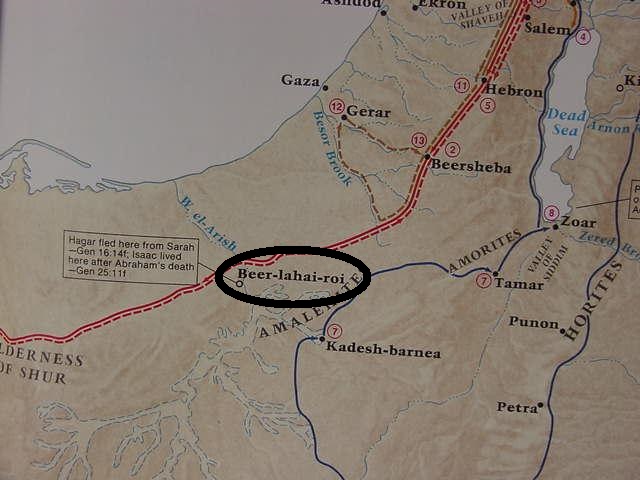
Verse sixteen
16 And Abram was a son of eighty years and six years in Hagar birthing ta-Ishmael to Abram.
This is a chart revealing the death of Reu before Abram reached eighty six years old
| YEAR OF MAN | THE YEAR ABRAM'S ANCESTOR DIED | ABRAM'S AGE AT THE TIME OF ANCESTOR'S DEATH |
| 2026 YEARS OF MANKIND | Reu: 239 years old | 78 years old |
Reu, Abram's grandfather, passed away before Reu's ancestors.
This is a chart showing the ages of Abram's ancestors when he was eighty six years old:
| YEAR OF MAN | NAME OF ABRAM'S ANCESTOR | AGE OF ABRAM'S ANCESTORS WHEN ABRAM WAS EIGHTY SIX YEARS OLD BY THE TIME ISHAMAEL WAS BORN | AGE OF DEATH OF ABRAM'S ANCESTORS |
| 2034 YEARS OF MANKIND | Shem | 478 years old | 600 years old |
| 2034 YEARS OF MANKIND | Arphaxad | 376 years old | 438 years old |
| 2034 YEARS OF MANKIND | Salah | 341 years old | 433 years old |
| 2034 YEARS OF MANKIND | Eber | 311 years old | 464 years old |
| 2034 YEARS OF MANKIND | Terah | 156 years old | 205 years old |
When Ishmael was born, the time line was around 1966 BC.
Sehetepibre Amenemhat I (Wehemmesu) was still king of Egypt when Ishmael was born.
Also, another Pharaoh ruled during this time, and it was Kheperkare Senusret I (also known as Sesostris I and Senwosret I) who ruled from 1971-1926 BC. This is what it says regarding Kheperkare Senusret I:
"Senusret I, also anglicized as Sesostris I and Senwosret I, was the second pharaoh of the Twelfth Dynasty of Egypt. He ruled from 1971 BC to 1926 BC, and was one of the most powerful kings of this Dynasty. He was the son of Amenemhat I. Senusret I was known by his prenomen, Kheperkare, which means "the Ka of Re is created."
He continued his father's aggressive expansionist policies against Nubia by initiating two expeditions into this region in his 10th and 18th years and established Egypt's formal southern border near the second cataract where he placed a garrison and a victory stele. He also organized an expedition to a Western Desert oasis. Senusret I established diplomatic relations with some rulers of towns in Syria and Canaan. He also tried to centralize the country's political structure by supporting nomarchs who were loyal to him. His pyramid was constructed at el-Lisht. Senusret I is mentioned in the Story of Sinuhe where he is reported to have rushed back to the royal palace in Memphis from a military campaign in Libya after hearing about the assassination of his father, Amenemhat I".
These are some images of Kheperkare Senusret I
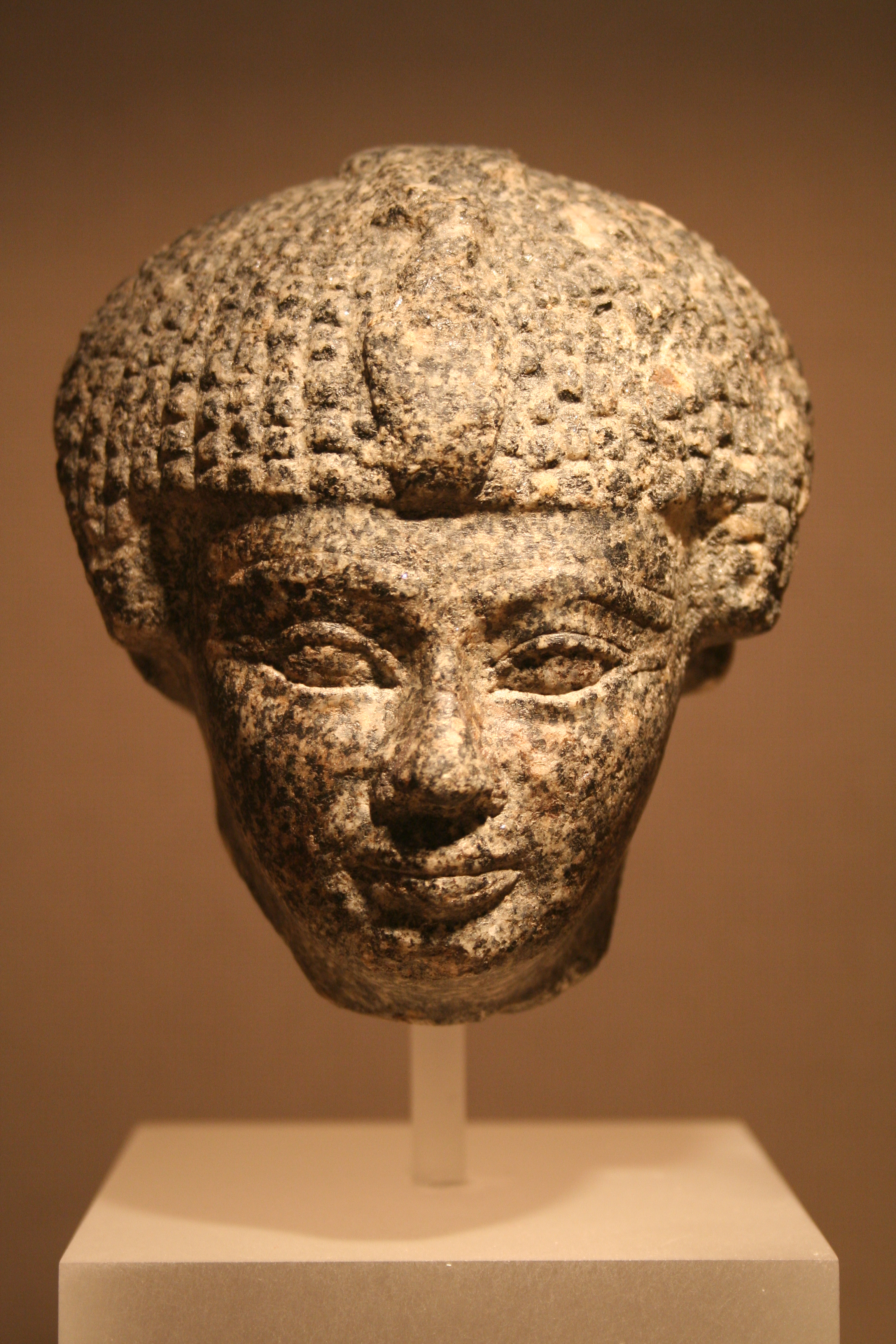
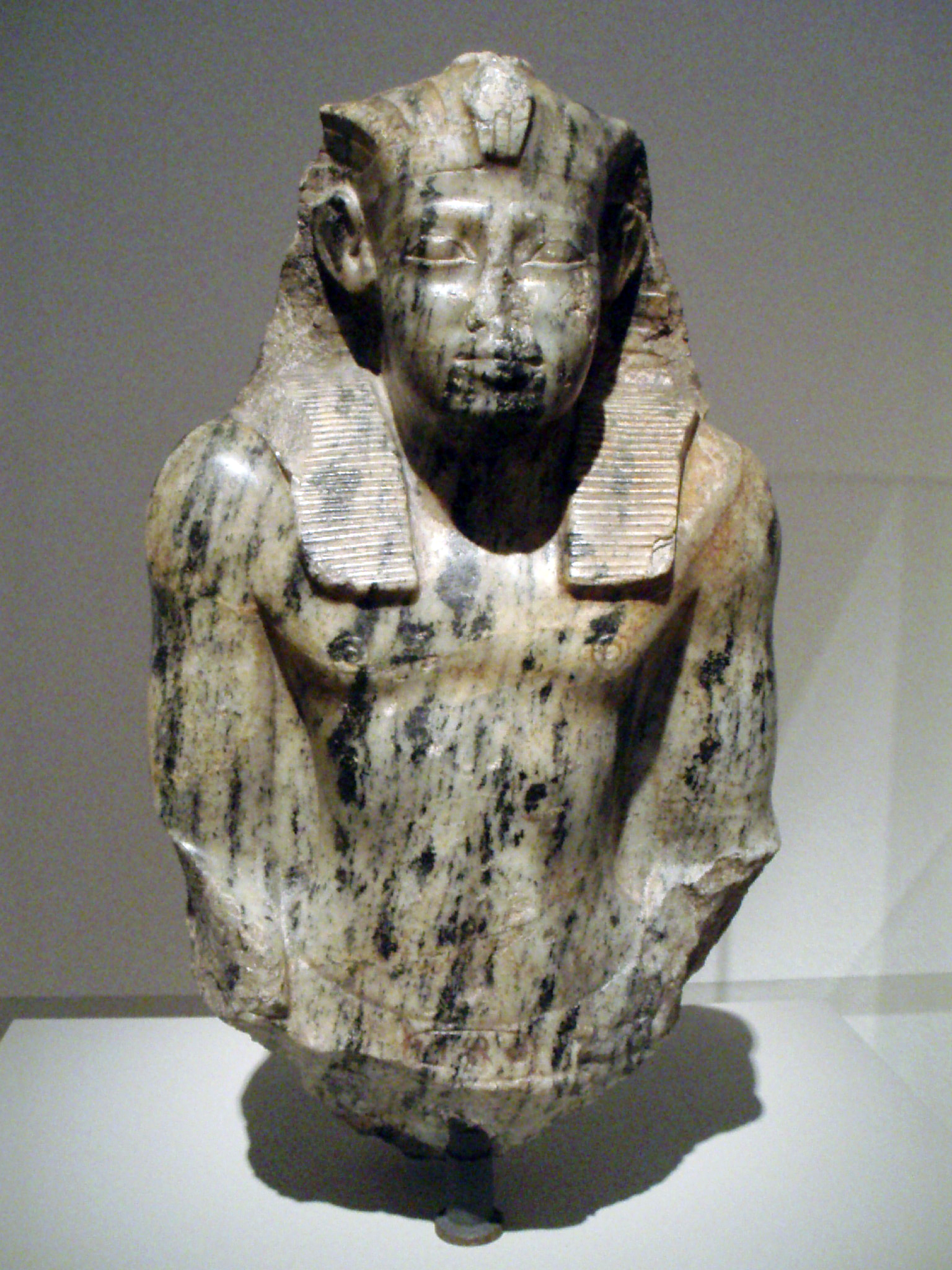
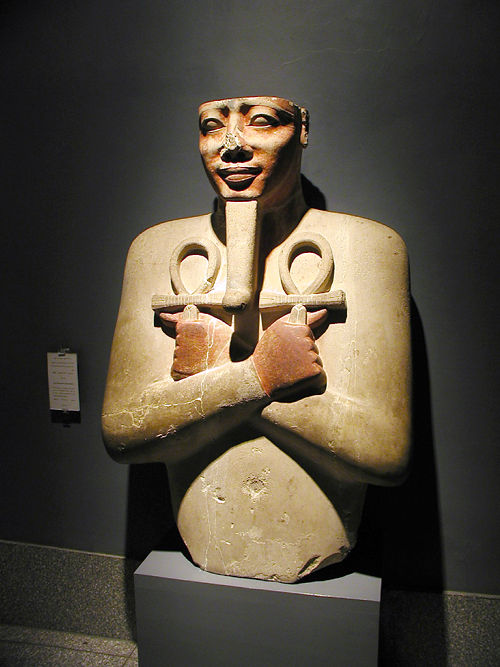
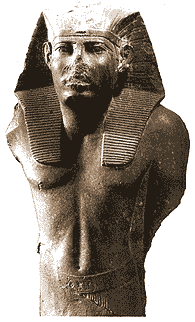
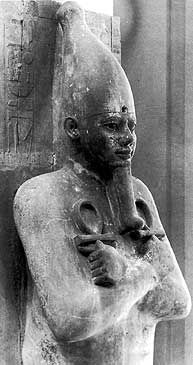

CHAPTER 17
Genesis 17:1-27
Gen 17:1 And Abram was a son of ninety years and nine years, and hwhy appeared to Abram, and said to him, I am El Shaddai; walk to My Face, and be perfect (complete), 2 and I will give My Covenant between Me and and between you, and I will multiply you in much, much. 3 And Abram fell upon his face: and Elohim spoke to him, to say, 4 Behold I, My Covenant is with you, and you shall be for a father of the many (resounding) nations, 5 and shall not be called any more ta-your name Abram, and your name shall be Abraham; for I have given you of a father of the many (resounding) nations. 6 And I will fructify you in much, much, and I will give you for nations; and kings, they shall come out from you. 7 And I will establish ta-My Covenant between Me and between you, and between your seed after you for their generations for a Covenant of Ages (Everlasting), to be to you for Elohim, and to your seed after you. 8 And I will give to you and to your seed after you ta the land of your sojourning, ta all the land of Canaan, for an Inhertance of Ages (Everlasting); and I will be to them for Elohim.
9 And Elohim said to Abraham, And you, you shall guard (watch, observe, keep) ta-My Covenant, you, and your seed after you to their generations. 10 This is My Covenant which you shall guard (watch, observe, keep) between Me, and between you, and between your seed after you; Circumcise to you every remembered one (male). 11 And you shall circumcise ta-the flesh of your foreskins; and shall be for a Sign (Token) of the Covenant between Me and between you. 12 And a son of eight days shall be circumcised to you of every remembered one (male) to your generations birthed of the house and bought (purchased) of silver from any son of a foreigner of which he is not of your seed. 13 That circumcising, shall be circumcised a birthed one (lad) at your house and a bought one (purchased one) of your silver: and My Covenant, she shall be in your flesh for a Covenant of Ages (Everlasting). 14 And an uncircumcised remembered one (male) which has not circumcised ta-the flesh of his foreskin, and shall cut her off that soul from her People; has violated (disannuled, dissolved) ta-My Covenant.
15 And Elohim said to Abraham, Sarai is your woman (wife), you shall not call ta-her name Sarai, for Sarah shall be her name. 16 And I have blessed her, and I have also given with her a son to you: and I will bless her, and she shall be for nations; kings of peoples, they shall be from her. 17 And Abraham fell upon his face, and laughed, and said in his heart, That of a son of a hundred years shall birth? And but Sarah, the daughter of ninety years, she shall birth? 18 And Abraham said to The Elohim, If (That, To him?) Ishmael shall live to your face! 19 And Elohim said, Indeed (Truly), Sarah, your wife, shall birth to you a son; and you shall call ta-his name, Isaac: and I will establish ta-My Covenant with him for a Covenant of Ages (Everlasting), to his seed after him. 20 And for Ishmael, I have heard you: Behold, I have blessed him, and I will fructify him, and I will multiply him in much, much; two ten (twoteen, twelve) rulers shall be birthed, and I will give of him for a great nation. 21 And ta-My Covenant will I cause to rise [(I will cause of establishing)] ta-Isaac which Sarah, she shall birth to you by this appointed time in the next (after, latter) year.
22 And finished to speak with him, and Elohim ascended from upon Abraham. 23 And Abraham took ta-Ishmael his son, and ta all birthed of his house, and ta-all bought (purchased) of his silver, everyy remembered one (male) among the men of the house of Abraham; and circumcised the flesh of their foreskins in this same day as the which Elohim spoke to him. 24 And Abraham was a son of ninety and the nine years in his circumcising the flesh of his foreskin. 25 And Ishmael his son was a son of three ten (threeteen, thirteen) years, in his circumcising ta the flesh of his foreskin. 26 In this same day was Abraham circumcised, and Ishmael his son, 27 and all the men of his house birthed at the house, and bought (purchased) of silver from ta-a son of a foreigner, they were circumcised with him.
(NOTE: Not all verses will have comments)
Verses one through eight
1 And Abram was a son of ninety years and nine years, and hwhy appeared to Abram, and said to him, I am El Shaddai; walk to My Face, and be perfect (complete), 2 and I will give My Covenant between Me and and between you, and I will multiply you in much, much. 3 And Abram fell upon his face: and Elohim spoke to him, to say, 4 Behold I, My Covenant is with you, and you shall be for a father of the many (resounding) nations, 5 and shall not be called any more ta-your name Abram, and your name shall be Abraham; for I have given you of a father of the many (resounding) nations. 6 And I will fructify you in much, much, and I will give you for nations; and kings, they shall come out from you. 7 And I will establish ta-My Covenant between Me and between you, and between your seed after you for their generations for a Covenant of Ages (Everlasting), to be to you for Elohim, and to your seed after you. 8 And I will give to you and to your seed after you ta the land of your sojourning, ta all the land of Canaan, for an Inhertance of Ages (Everlasting); and I will be to them for Elohim.
Looking at the word ABRAHAM
The Hebrew word for Abraham is "Ah-vrah-hahm"- Aleph, Bet, Resh, Heh, Mem Sophit (Mhrba). It is from Strong's Concordance number 85, and its definition
Contracted from H1 and an unused root (probably meaning to be populous); father of a multitude; Abraham, the later name of Abram: - Abraham.
Carry over Abram's definition, and applying it in Abraham's name
Ab
from 1 "ahv" (ba), and its definition
A primitive word; father in a literal and immediate, or figurative and remote application: - chief, (fore-) father ([-less]), X patrimony, principal. Compare names in “Abi-”
Ram
from 7311 "room" (Mwr), and its definition
A primitive root; to be high actively to rise or raise (in various applications, literally or figuratively): - bring up, exalt (self), extol, give, go up, haughty, heave (up), (be, lift up on, make on, set up on, too) high (-er, one), hold up, levy, lift (-er) up, (be) lofty, (X a-) loud, mount up, offer (up), + presumptuously, (be) promote (-ion), proud, set up, tall (-er), take (away, off, up), breed worms.
I believe that Strong didn't have enough understanding at his name meaning at the time. I will explain.
hwhy changed Abram's name to Abraham and Sarai's name to Sarah. The letter that was added or replaced in their names was the letter Heh (h). According to Jeff Benner of Ancient Hebrew Research Center, the letter Heh is a Paleo-Hebrew picture of a "man with his arms raised", and the meaning of the letter is "look", "reveal", and "truth". This is noticed in verse twenty two in this week's Torah portion chapter
Genesis 17:22 And finished to speak with him, and Elohim ascended from upon Abraham.
This tells that that hwhy was present with Abraham, and it is similar to when hwhy spoke to Moses face to faces, which is noted in the Torah portion of Ki Thisa, in the book of Exodus
Exodus 33:11 And hwhy spoke to Moses Faces to faces, as the which a man shall speak to his neighbor....
When hwhy came down to Abram, hwhy "revealed" Himself to Abram, and gave Abram the ability to "look", or "behold" at hwhy without dying, and hwhy spoke "truth" to Abram.
In my opinion, based on Abraham's previous name, which was Abram, meaning "Exalted Father", the "Heh" added on to Abram's name would provide him with a new definition and meaning, and it's "Exalted Father Revealed". This connects to a prophetic account noted by the prophet Isaiah in his book
Isaiah 9:6 For a Child was birthed to us, a Son was given to us: and the government, she shall be upon His Shoulders: and His name shall be called Wonderful, Counsellor, the Mighty El, the Everlasting Father, the Prince of Peace.
And the Evleralsting Father is "Yeshua, the Messiah".
!!! hwhy Kl dbk
In connection with the beginning of this Torah portion, in chapter twelve, Abraham can now be the father of many nations, including those who are believers and walk in Yeshua the Messiah. Thank you Abba Yah.
In verse four of this week's Torah portion passage, hwhy was saying to Abraham that His Covenant is with Abraham. The "you" in bold pink in the Hebrew text is feminine, meaning that hwhy was saying this to Abraham's soul.
!!! hwhy Kl dbk
In verse six of this week's Torah portion passage, hwhy was telling Abraham that He was giving Abraham to the nations. Abraham could be symbolized as "Yeshua", meaning that hwhy would be giving Yeshua to the nations because of Abraham's faith. Also this same verse connects to what the apostle Paul noted in his letter to the assemblies in Colossia and in Rome
Galatians 3:6 Even as Abraham believed hwhy, and it was accounted to him for righteousness.
7 know ye therefore that they which are of faith, the same are the children of Abraham.
Romans 4:13 For the Promise, that he should be the heir of the world, was not to Abraham, or to his seed, through the Torah, but through the righteousness of faith.
!!! hwhy Kl dbk
In verse eight of this week's Torah portion passage, in the phrase "...and I will be to you for Elohim", in the Hebrew text, the Hebrew word for "I will be" is "V'hah-yee-thee", Vav, Heh, Vav, Vav, Tav, Vav (ytyyhw). Notice that it has two Vavs together. This could be as if hwhy was saying to Abraham that He's using a double connection by using one of His Hands for the Heavens and His other Hand for the Earth, the two Yods, to double witness His Covenant with Abraham. Another way of looking at it was that hwhy was using both of His Hands to covenent with Abraham as when hwhy forming Adam with both of His Hands, which is noted in the Torah portion of B'reyshith, in the book of Genesis
Genesis 2:7 And hwhy Elohim formed (fashioned, molded) (ruyyw) ta-the Adam of dust from the ground,
You can get Jeff Benner's Paleo-Hebrew Aleph-Bet chart by clicking at the weblink below.
http://education.ancient-hebrew.org/documents/module1-chart.pdf
This is a chart revealing the ages of Abram's ancestors by the time Abram was ninety nine years old
| YEAR OF MAN | NAME OF ABRAM'S ANCESTOR | AGE OF ABRAM'S ANCESTORS WHEN ABRAHAM WAS NINETY NINE YEARS OLD | AGE OF DEATH OF ABRAHAM'S ANCESTORS |
| 2047 YEARS OF MANKIND | Shem | 491 years old | 600 years old |
| 2047 YEARS OF MANKIND | Arphaxad | 389 years old | 438 years old |
| 2047 YEARS OF MANKIND | Salah | 354 years old | 433 years old |
| 2047 YEARS OF MANKIND | Eber | 324 years old | 464 tears old |
| 2047 YEARS OF MANKIND | Terah | 169 years old | 205 years old |
If this is calculated correctly, it would take it to the time line of approximately 1955 BC.
By the time Abraham was ninety nine years old, Kheperkare Senusret I (also known as Sesostris I and Senwosret I) was still ruling in Egypt. Notice in the Wikipedia commentary noted earlier that part of his name, Kheperkare means "the Ka of Re is created". This excerpt comes from the Ancient Egypt: the Mythology website, and this is what it says regarding the symbol of Ka:
"Meaning: The "ka" is a very complex part of the symbolism in ancient Egyptian mythology and represents several things: the ka is a symbol of the reception of the life powers from each man from the gods, it is the source of these powers, and it is the spiritual double that resides with every man".
Not everything it says is noted here, but in this part, it can be compared to hwhy giving a future power to Abraham which will be applied in next week's Torah portion.
Verses nine through eleven
9 And Elohim said to Abraham, And you, you shall guard (watch, observe, keep) ta-My Covenant, you, and your seed after you to their generations. 10 This is My Covenant which you shall guard (watch, observe, keep) between Me, and between you, and between your seed after you; Circumcise to you every remembered one (male). 11 And you shall circumcise ta-the flesh of your foreskins; and shall be for a Sign (Token) of the Covenant between Me and between you.
Looking at this passage again highlighting certain pronouns in a different color
9 And Elohim said to Abraham, And you, you shall guard (watch, observe, keep) ta-My Covenant, you, and your seed after you to their generations. 10 This is My Covenant which you shall guard (watch, observe, keep) between Me, and between you, and between your seed after you; Circumcise to you every remembered one (male). 11 And you shall circumcise ta-the flesh of your foreskins; and shall be for a Sign (Token) of the Covenant between Me and between you.
All these four pronouns in yellow are not obvious in the English grammar, but in the Hebrew it is. Based on the English grammar, those colored pronouns above would sound like that hwhy was saying "you" in the 2nd person singular form. In the Hebrew, if that was the case it would be the ending "Kaph Sophit" (K) as the 2nd person singular pronoun, but they are the 2nd person "plural" pronoun "Kaph-Mem Sophit" (Mk). So who were the "yous" in these two verses? There are two answers: The first answer is the "you" plural refers that the Covenant would imply to Abraham and to all the males of his household. The second answer is that the "you" plural refers also to Abraham's covenant descendants through his son, Isaac, and through Isaac's son, Jacob, and to those who are adopted to be sons of Abraham, a.k.a. all the believers in Yeshua the Messiah which the apostle Paul noted in his letter to the assembly in Galatia
Galatians 3:15 Brethren, I speak after the manner of men; Though it be but a man's covenant, yet if it be confirmed, no man disannulleth, or addeth thereto. 16 Now to Abraham and his seed were the promises made. He saith not, And to seeds, as of many; but as of one, And to thy seed, which is Messiah. 17 And this I say, that the Covenant, that was confirmed before of hwhy in Messiah, the Torah, which was four hundred and thirty years after, cannot disannul, that it should make the promise of none effect. 18 For if the inheritance be of the Torah, it is no more of promise: but hwhy gave it to Abraham by promise. 19 Wherefore then serveth the Torah? It was added because of transgressions, till the Seed should come to whom the Promise was made; and it was ordained by angels in the hand of a mediator. 20 Now a mediator is not a mediator of one, but hwhy is one. 21 Is the Torah then against the Promises of hwhy? Let it not be: for if there had been a Torah given which could have given life, verily righteousness should have been by the Torah. 22 But the Scripture hath concluded all under sin, that the Promise by faith of Yeshua Messiah might be given to them that believe. 23 But before faith came, we were kept under the Torah, shut up unto the faith which should afterwards be revealed. 24 Wherefore the Torah was our schoolmaster to bring us unto Messiah, that we might be justified by faith. 25 But after that faith is come, we are no longer under a schoolmaster. 26 For ye are all the children of hwhy by faith in Messiah Yeshua. 27 For as many of you as have been baptized into Messiah have put on Messiah. 28 There is neither Jew nor Greek, there is neither bond nor free, there is neither male nor female: for ye are all one in Messiah Yeshua. 29 And if ye be Messiah's, then are ye Abraham's seed, and heirs according to the promise.
Verses twelve and thirteen
12 And a son of eight days shall be circumcised to you of every remembered one (male) to your generations birthed of the house and bought (purchased) of silver from any son of a foreigner of which he is not of your seed. 13 That circumcising, shall be circumcised a birthed one (lad) at your house and a bought one (purchased one) of your silver: and My Covenant, she shall be in your flesh for a Covenant of Ages (Everlasting). 14 And an uncircumcised remembered one (male) which has not circumcised ta-the flesh of his foreskin, and shall cut her off that soul from her People; has violated (disannuled, dissolved) ta-My Covenant.
15 And Elohim said to Abraham, Sarai is your woman (wife), you shall not call ta-her name Sarai, for Sarah shall be her name. 16 And I have blessed her, and I have also given with her a son to you: and I will bless her, and she shall be for nations; kings of peoples, they shall be from her. 17 And Abraham fell upon his face, and laughed, and said in his heart, That of a son of a hundred years shall birth? And but Sarah, the daughter of ninety years, she shall birth? 18 And Abraham said to The Elohim, If (That, To him?) Ishmael shall live to your face! 19 And Elohim said, Indeed (Truly), Sarah, your wife, shall birth to you a son; and you shall call ta-his name, Isaac: and I will establish ta-My Covenant with him for a Covenant of Ages (Everlasting), to his seed after him. 20 And for Ishmael, I have heard you: Behold, I have blessed him, and I will fructify him, and I will multiply him in much, much; two ten (twoteen, twelve) rulers shall be birthed, and I will give of him for a great nation. 21 And ta-My Covenant will I cause to rise ](I will cause of establishing)] ta-Isaac which Sarah, she shall birth to you by this appointed time in the next (after, latter) year.
22 And finished to speak with him, and Elohim ascended from upon Abraham. 23 And Abraham took ta-Ishmael his son, and ta all birthed of his house, and ta-all bought (purchased) of his silver, everyy remembered one (male) among the men of the house of Abraham; and circumcised the flesh of their foreskins in this same day as the which Elohim spoke to him. 24 And Abraham was a son of ninety and the nine years in his circumcising the flesh of his foreskin. 25 And Ishmael his son was a son of three ten (threeteen, thirteen) years, in his circumcising ta the flesh of his foreskin. 26 In this same day was Abraham circumcised, and Ishmael his son, 27 and all the men of his house birthed at the house, and bought (purchased) of silver from ta-a son of a foreigner, they were circumcised with him.
This was the beginning of the Covenant of Ages.
Indirectly related, since Yeshua's resurrection, the Jews who were of the renewed Covenant were still trying to get the Gentiles to be circumcised in their foreskins, instead of the circumcision of the heart and spirit, as the apostle Paul noted in his letter to the assembly in Rome
Romans 2:24 For the name of hwhy is blasphemed among the Gentiles through you, as it is written. 25 For circumcision verily profiteth, if thou keep the Torah: but if thou be a breaker of the Torah, thy circumcision is made uncircumcision. 26 Therefore if the uncircumcision keep the righteousness of the Torah, shall not his uncircumcision be counted for circumcision? 27 And shall not uncircumcision which is by nature, if it fulfill the Torah, judge thee, who by the letter and circumcision dost transgress the Torah? 28 For he is not a Jew, which is one outwardly; neither is that circumcision, which is outward in the flesh: 29 But he is a Jew, which is one inwardly; and circumcision is that of the heart, in the spirit, and not in the letter; whose praise is not of men, but of hwhy.
In this letter, the Jews were being circumcised based on the flesh, in which they easily break the Torah. Whereas, the complete Jews are circumcised of the heart and the spirit, which we Messianics are.
Verse fourteen
14 And an uncircumcised remembered one (male) which has not circumcised ta-the flesh of his foreskin, and shall cut her off that soul from her People; has violated (disannuled, dissolved) ta-My Covenant.
This is the similar matter during the time of Joshua, when the Isarelites were about to cross over in the promised land, in Canaan, and conquer it. The problem for them was that the men generation were not circumcised, and Joshua had to circumcise them, in order to establish the Covenant before they enter. This is the account which is noted in the book of Joshua
Joshua 5:1 And it came to pass, when all the kings of the Amorites, which were on the side of Jordan westward, and all the kings of the Canaanites, which were by the sea, heard that hwhy had dried up the waters of Jordan from before the Sons of Israel, until we were passed over, that their heart melted, neither was there spirit in them any more, because of the Sons of Israel. 2 At that time, hwhy said unto Joshua, Make thee sharp knives, and circumcise again ta-the Sons of Israel the second time. 3 And Joshua made him sharp knives, and circumcised the Sons of Israel at the hill of the foreskins. 4 And this is the cause why Joshua did circumcise: All the people that came out of Egypt, that were males, even all the men of war, died in the wilderness by the way, after they came out of Egypt. 5 Now all the people that came out were circumcised: but all the people that were born in the wilderness by the way as they came forth out of Egypt, them they had not circumcised. 6 For the Sons of Israel walked forty years in the wilderness, till all the people that were men of war, which came out of Egypt, were consumed, because they obeyed not the voice of hwhy: unto whom hwhy sware that he would not shew them ta-the land, which hwhy sware unto their fathers that he would give us, a land that floweth with milk and honey. 7 And their sons, whom he raised up in their stead, them Joshua circumcised: for they were uncircumcised, because they had not circumcised them by the way. 8 And it came to pass, when they had done circumcising all the people, that they abode in their places in the camp, till they were whole. 9 And hwhy said unto Joshua, This day have I rolled away ta-the reproach of Egypt from off you. Wherefore the name of the place is called Gilgal unto this day.
Indirectly related, it also connects to what Moses said in the Torah portion of Nitsavim, in the book of Deuteronomy
Deuteronomy 30:5 and hwhy, your Elohim, shall bring you ](have you go)] to the land which your fathers, they possessed (occupied), and you shall possess (occupy) her; and shall do you good [(be good of you)], and shall multiply you [(you shall multiply)] than your fathers, 6 and hwhy, your Elohim, shall circumcise ta-your heart, and ta-the heart of your seed to love ta-hwhy, your Elohim, in all of your heart, and in all of your soul, by that, you shall live.
Verses fifteen through twenty
15 And Elohim said to Abraham, Sarai is your woman (wife), you shall not call ta-her name Sarai, for Sarah shall be her name. 16 And I have blessed her, and I have also given with her a son to you: and I will bless her, and she shall be for nations; kings of peoples, they shall be from her. 17 And Abraham fell upon his face, and laughed, and said in his heart, That of a son of a hundred years shall birth? And but Sarah, the daughter of ninety years, she shall birth? 18 And Abraham said to The Elohim, If (That, To him?) Ishmael shall live to your face! 19 And Elohim said, Indeed (Truly), Sarah, your wife, shall birth to you a son; and you shall call ta-his name, Isaac: and I will establish ta-My Covenant with him for a Covenant of Ages (Everlasting), to his seed after him. 20 And for Ishmael, I have heard you: Behold, I have blessed him, and I will fructify him, and I will multiply him in much, much; two ten (twoteen, twelve) rulers shall be birthed, and I will give of him for a great nation.
Looking at the word SARAH
The Hebrew word for Sarah is "Sah-rah"- Shin, Resh, Heh (hrs). It is from Strong's Concordance number 8283, and its definition
The same as H8282; Sarah, Abraham’s wife: - Sarah.
from 8282 "sah-rah" (hrs), and its definition
Feminine of H8269; a mistress, that is, female noble: - lady, princess, queen.
from 8269, as noted in chapter twelve under Sarai's name's definition.
Because hwhy replaced the "Yod" in Sarai's name to "Heh", just like what He did to Abram's name, her name means "Queen". Also, because of the Heh added to her name, she was also "revealed" by hwhy that she will have a child.
!!!hwhy Kl dbk
In verse nineteen, Abraham was promised a son through Sarah and will call his name Isaac. This is, because Abraham laughed.
Looking at the word LAUGH
The Hebrew word for laugh is "tsah-khak"- Tsade, Khet, Kuph (qxu). It is from Strong's Concordance number 6711, and its definition
A primitive root; to laugh outright (in merriment or scorn); by implication to sport: - laugh, mock, play, make sport.
This is the reason hwhy said to him in verse nineteen that he will call his name Isaac.
Looking at the word ISAAC
The Hebrew word for Isaac is "Yeets-khak"- Yod, Tsade, Khet, Kuph (qxuy). It is from Strong's Concordance number 3327, and its definition
From H6711; laughter (that is, mockery); Jitschak (or Isaac), son of Abraham: - Isaac. Compare H3446.
Isaac means "laughter".
In verse twenty of this week's Torah portion passage, hwhy said "And for Ishmael, I have heard you...". hwhy was using a play of the Hebrew word, "shema" in the words "Ishmael" (laemsy) and "heard" (ems) both meaning "hear" when Abraham inquired hwhy of Ishmael.
Verse twenty-one
21 And ta-My Covenant will I cause to rise [(I will cause of establishing)] ta-Isaac which Sarah, she shall birth to you by this appointed time in the next (after, latter) year.
Looking at the word APPOINTED TIME
The Hebrew word for appointed time is "moh-eyd"- Mem, Vav, Ayin, Dalet (dewm). It is from Strong's Concordance number 4150, and its definition
From H3259; properly an appointment, that is, a fixed time or season; specifically a festival; conventionally a year; by implication, an assembly (as convened for a definite purpose); technically the congregation; by extension, the place of meeting; also a signal (as appointed beforehand): - appointed (sign, time), (place of, solemn) assembly, congregation, (set, solemn) feast, (appointed, due) season, solemn (-ity), synagogue, (set) time (appointed).
from 3259 "yah-ahd"- Yod, Ayin, Dalet (dey), and its definition
A primitive root; to fix upon (by agreement or appointment); by implication to meet (at a stated time), to summon (to trial), to direct (in a certain quarter or position), to engage (for marriage): - agree, (make an) appoint (-ment, a time), assemble (selves), betroth, gather (selves, together), meet (together), set (a time).
There is only one other time before this that this Hebrew word was used, and it is in Genesis chapter one, where it is used in generality relating to the heavenly elements which is noted in the Torah portion of B'reyshith, in the book of Genesis
Genesis 1:14 And Elohim said, Be Lights (Luminaries) in the Firmament (Expanse) of the Heavens for the division (separation, distinguishing) between the Day and between the Night, and shall be for Signs, and for Appointed Times, and for days, and years,
This phrase "appoionted time" in this week's Torah portion is used for the first time for a particular date, and it is my humble, but strong opinion that it is on the first day of Sukkoth. That means also hwhy will come back on the first day of Sukkoth in the following year as noted in verse twenty-one, which we will see this in next week's Torah portion. You can see my updated teaching on When was Yeshua Born? Evidence Based on Scriptural Facts at my Sukkoth web page. Just go to the "Holidays and Holy Days" link on the top of the page and look for the Sukkoth link, or go to the "Teachings" link and find it there.
This also connects between Ishmael and the future Isaac, by the apostle Paul, as he noted in his letter to the assembly in Galatia
Galatians 4:22 For it is written, that Abraham had two sons, the one by a bondmaid, the other by a freewoman. 23 But he who was of the bondwoman was born after the flesh; but he of the freewoman was by Promise. 24 Which things are an allegory: for these are the two Covenants; the one from the Mount Sinai, which gendereth to bondage, which is Agar [Hagar]. 25 For this Agar [Hagar] is Mount Sinai in Arabia, and answereth to Jerusalem which now is, and is in bondage with her children. 26 But Jerusalem which is above is free, which is the mother of us all.
In connection, Ishmael was the symbolic "Bondage Covenant", but the future Isaac was the symbolic "Covenant of Promise". Thank you, Yah, for the apostle Paul.
Also in this chapter, it is my humble, but strong opinion that the day that hwhy came down on the earth to visit Abram, changing his name to Abraham and Changing Sarai's name to Sarah, promising a son through Sarah, circumcising all the males in his household, including himself, occurred in the same day, but it was on a certain "Appointed Time". This account had occurred in the fifteenth day of the seventh month of Ethanim/Tishri, meaning the first day of Fall High Holy Day of the Biblical Feast of Sukkoth.
In verse twenty-one of this week's Torah portion passage, the phrase says "...by this appointed time in the next year". The Hebrew word for next is "ha-ah-kheh-reth", Heh, Aleph, Khet, Resh, Tav (trxah). It can be translated as next, or after, but it can also be translated as "latter". If we apply this translation to this verse, it will say this:
21 And ta-My Covenant will I cause to rise [(I will cause of establishing)] ta-Isaac which Sarah, she shall birth to you by this appointed time in the next (after, latter) year.
This is based on Abraham and Sarah will have a son called "Isaac", meaning "laughter". We as believers in Yeshua are symbolically "Isaacs", and Yeshua will come back in the "appointed time in the latter year" when He will come back that year to meet us "Isaacs in Yeshua" and take us up to be with Him, which the apostle Paul noted in his letter to the assembly in Thessalonica
1 Thessalonians 4:13 But I would not have you to be ignorant, brethren, concerning them which are asleep, that ye sorrow not, even as others which have no hope. 14 For if we believe that Yeshua died and rose again, even so them also which sleep in Yeshua will hwhy bring with him. 15 For this we say unto you by the Word of hwhy, that we which are alive and remain unto the coming of the Lord shall not prevent them which are asleep. 16 For the Lord himself shall descend from the Heavens with a shout, with the voice of the archangel, and with the Trump of hwhy: and the dead in Messiah shall rise first: 17 Then we which are alive and remain shall be caught up together with them in the clouds, to meet the Lord in the air: and so shall we ever be with the Lord. 18 Wherefore comfort one another with these words.
This is so, because we as believers in Yeshua are called the children of Abram, which is noted by the apostle Paul in his letter to the assembly in Galatia
Galatians 3:6 Even as Abraham believed hwhy, and it was accounted to him for righteousness.
7 know ye therefore that they which are of faith, the same are the children (symbolically "Isaacs") of Abraham.
!!!hwhy Kl dbk
Verses twenty two through twenty seven
22 And finished to speak with him, and Elohim ascended from upon Abraham. 23 And Abraham took ta-Ishmael his son, and ta all birthed of his house, and ta-all bought (purchased) of his silver, everyy remembered one (male) among the men of the house of Abraham; and circumcised the flesh of their foreskins in this same day as the which Elohim spoke to him. 24 And Abraham was a son of ninety and the nine years in his circumcising the flesh of his foreskin. 25 And Ishmael his son was a son of three ten (threeteen, thirteen) years, in his circumcising ta the flesh of his foreskin. 26 In this same day was Abraham circumcised, and Ishmael his son, 27 and all the men of his house birthed at the house, and bought (purchased) of silver from ta-a son of a foreigner, they were circumcised with him.
Abraham circumcised all the men, including the 318 of his men who were trained for battle, on that same day. This is the first Commandment in all of the Torah, as well as the Tanakh, that if one did not follow this Commandment, their soul shall be cut off from "her" people. It says "her" to show that the soul is "feminine", and we are to submit our "souls" to hwhy for we are his "bride", and the soul is part of the bride- femnine.
This is a continuation from chapter fifteen, where he looked up the heavens and would be a father of many nations. Then, it says in chapter fifteen of this week's Torah portion
Genesis 15:6 And believed in hwhy; and was reckoned (regarded) to him for righteousness.
This is noted by the apostle Paul in his letter to the assembly in Rome
Romans 4:1 What shall we say then that Abraham our father, as pertaining to the flesh, hath found? 2 For if Abraham were justified by works, he hath whereof to glory; but not before hwhy. 3 For what saith the Scripture? Abraham believed hwhy, and it was counted unto him for righteousness. 4 Now to him that worketh is the reward not reckoned of grace, but of debt. 5 But to him that worketh not, but believeth on him that justifieth the ungodly, his faith is counted for righteousness....9 Cometh this blessedness then upon the circumcision only, or upon the uncircumcision also? for we say that faith was reckoned to Abraham for righteousness. 10 How was it then reckoned? when he was in circumcision, or in uncircumcision? Not in circumcision, but in uncircumcision. 11 And he received the Sign of circumcision, a Seal of the righteousness of the faith which he had yet being uncircumcised: that he might be the father of all them that believe, though they be not circumcised; that righteousness might be imputed unto them also: 12 And the father of circumcision to them who are not of the circumcision only, but who also walk in the steps of that faith of our father Abraham, which he had being yet uncircumcised. 13 For the promise, that he should be the heir of the world, was not to Abraham, or to his seed, through the Torah, but through the righteousness of faith. 14 For if they which are of the Torah be heirs, faith is made void, and the promise made of none effect: 15 Because the Torah worketh wrath: for where no Torah is, there is no transgression. 16 Therefore it is of faith, that it might be by grace; to the end the promise might be sure to all the seed; not to that only which is of the Torah, but to that also which is of the faith of Abraham; who is the father of us all, 17 (As it is written, I have made thee a father of many nations,) before him whom he believed, even hwhy, who quickeneth the dead, and calleth those things which be not as though they were. 18 Who against hope believed in hope, that he might become the father of many nations, according to that which was spoken, So shall thy seed be. 19 And being not weak in faith, he considered not his own body now dead, when he was about an hundred years old, neither yet the deadness of Sara's womb: 20 He staggered not at the Promise of hwhy through unbelief; but was strong in faith, giving glory to hwhy; 21 And being fully persuaded that, what he had promised, he was able also to perform. 22 And therefore it was imputed to him for righteousness.
It connects to what Moses said which is noted in the Torah portion of Nitsavim, in the book of Deuteronomy
Deuteronomy 30:5 and hwhy, your Elohim, shall bring you ](have you go)] to the land which your fathers, they possessed (occupied), and you shall possess (occupy) her; and shall do you good [(be good of you)], and shall multiply you [(you shall multiply)] than your fathers, 6 and hwhy, your Elohim, shall circumcise ta-your heart, and ta-the heart of your seed to love ta-hwhy, your Elohim, in all of your heart, and in all of your soul, by that, you shall live.
It is my humble opinion in the strongest sense that the day that Abraham and all the males of his household were circumcised was on Yom Kippur. As it says in the Commandment of Yom Kippur which is noted in the Torah portion of Emor, in the book of Leviticus
Leviticus 23:26 And hwhy spoke to Moses, to say, 27 Only on the ten of this seventh renewed month shall be the Day of the Atonements: he shall be a Sacred (Holy) Calling (Convocation) to yourselves; and you shall afflict ta-your souls, and you shall bring near a Fire Offering to hwhy.
Also, in the parable of the ten virgins in the Gospel of Matthew, in my teaching "The Parable Of The Ten Virgins", I made note that the accounts were related to the Biblical Fall High Holy Days, which includes Yom Kippur. This is the scripture related to Yom Kippur which is noted in the Gospel of Matthew
Matthew 25:7 Then all those virgins arose, and trimmed their lamps.
These two sources are like what Abraham and his men did by circumcising their foreskings- an act of "afflicting" and "trimming" their souls.
Mark Biltz of El Shaddai Ministries made a chiastic structural connection of this chapter
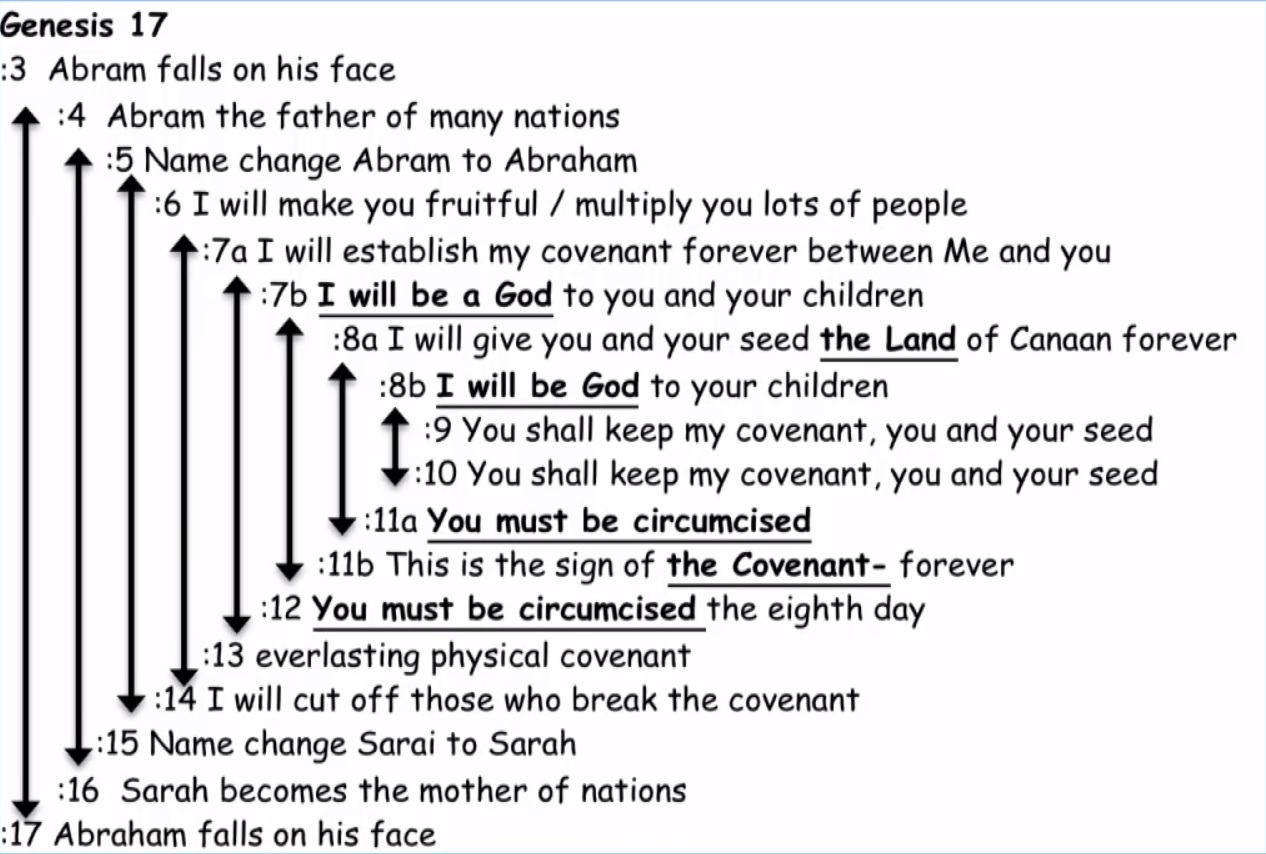
Ending the Torah portion with a quote from hwhy through Moses, in the Torah portion of Eykev, in the book of Deuteronomy
Deuteronomy 10:16 And you shall circumcise ta the foreskin of your heart, and you shall not stiffen your neck anymore,
Next week, onto the account of Isaac's birth.
That ends this week's Torah portion commentary.
Any questions or comments can be written to
the.aleph-tav.project@msn.com
SHABBATH SHALOM

_______________________________________________________________________________________________________________________________________________
_______________________________________________________________________________________________________________________________________________
Copyright 2014 The Aleph-Tav Project - NVU's Website Design Software by The Premier Group